
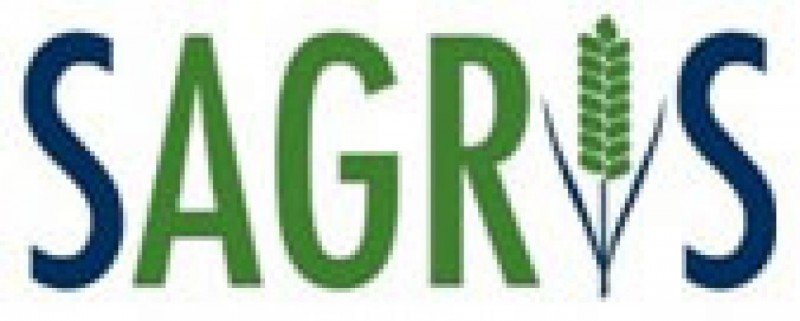
Enhancement of Postgraduate Studies on Sustainable Agriculture and Future Farming Systems
Programme: Erasmus +
Key action: Cooperation for innovation and the exchange of good
practices Action: Capacity Building in Higher Education (CBHE)
Action Type: Joint Projects (curriculum development, strengthening of the internationalisation of HEI and the capacity to network effectively in research, scientific and technological innovation)
Project title: Enhancement of Postgraduate Studies on
Sustainable Agriculture and Future Farming Systems
Project number: 610383-EPP-1-2019-1-DE-EPPKA2-CBHE-JP (2019-2086)
Project duration: 15.1.2020 – 14.1.2023
The project addresses the demand of educating doctoral students on high quality and international standards to increase knowledge based solutions for sustainable agriculture and future farming systems – a topic of national, cross-regional and international relevance.
Large agricultural areas characterize the landscapes and economies of Russia and Kazakhstan and both countries see the innovative development of this sector as a priority. Compared to this, skilled labour and innovation potential is lacking. As a reaction, a number of initiatives target to build up human resources on all levels (farm workers, specialists, managers) and as well to improve higher education institutions (HEIs). Despite the progress in joining and pursuing the Bologna process, brain drain of young talents and deficient and outdated educational offers for PhD studies impede the goals of HEIs to become international competitive. The consortium of 5 EU partners and 4 Russian and 4 Kazakh agricultural universities together with consultative and expert partners from accreditation, research and private business in Russia and Kazakhstan therefore specified the following objectives.
Overall the institutional capacity increases to tackle education and research demand in the area of sustainable agriculture and future farming systems.
Partnership
From the programme countries Nürtingen-Geislingen University applied as coordinator together with 3 other European faculties (Warsaw, Prague, Tartu) and one international research institute (DITSL- Witzenhausen). 4 RF plus 4 KAZ universities cover different regions, beyond the capitals. Consultative institutions and national important partners provide consultation and support the reflection of quality requirements for modern postgraduate studies and facilitate the link to existing research networks.
|
EU – HEI programme country partners |
||
|
1 |
Nuertingen-Geislingen University |
HfWU (coordinator) |
|
2 |
Warsaw University of Life Sciences – |
WULS |
|
3 |
Czech University of Life Sciences, Prague – |
CULS |
|
4 |
DITSL Witzenhausen |
DITSL |
|
5 |
Estonian University of Life Sciences, Tartu |
EMU |
|
RF – HEI regional partners |
||
|
6 |
Stavropol State Agrarian University |
SSAU |
|
7 |
Novosibirsk State Agrarian University |
NSAU |
|
8 |
Buryat State Academy of Agriculture |
BSAA |
|
9 |
Yakutsk State Agricultural Academy |
YSAA |
|
KAZ – HEI regional partners |
||
|
10 |
S.Seifullin Kazakh Agro Technical University, Nur-Sultan |
KATU |
|
11 |
Kazakh National Agrarian University, Almaty |
KazNAU |
|
12 |
Zhangir khan West Kazakhstan agrarian-technology University, Oral |
WKATU |
|
13 |
A.Baitursynov Kostanay State University |
ABKSU |
|
Research institutions and consultative bodies in the partner countries |
||
|
14 |
National Centre for Public Accreditation NCPA, Russian Federation |
|
|
15 |
Independent Agency for Accreditation and Rating IAAR, Kazakhstan |
|
|
16 |
National Agrarian Science and Educational Centre NASEC, Kazakhstan |
|
|
17 |
Russian Academy of Sciences RAN (including RU research institutions) |
|
|
Associated partners |
||
|
18 |
Ministry of Agriculture of Russian Federation |
MCX RF |
|
19 |
Ministry of Agriculture in Kazakhstan |
MCX KZ |
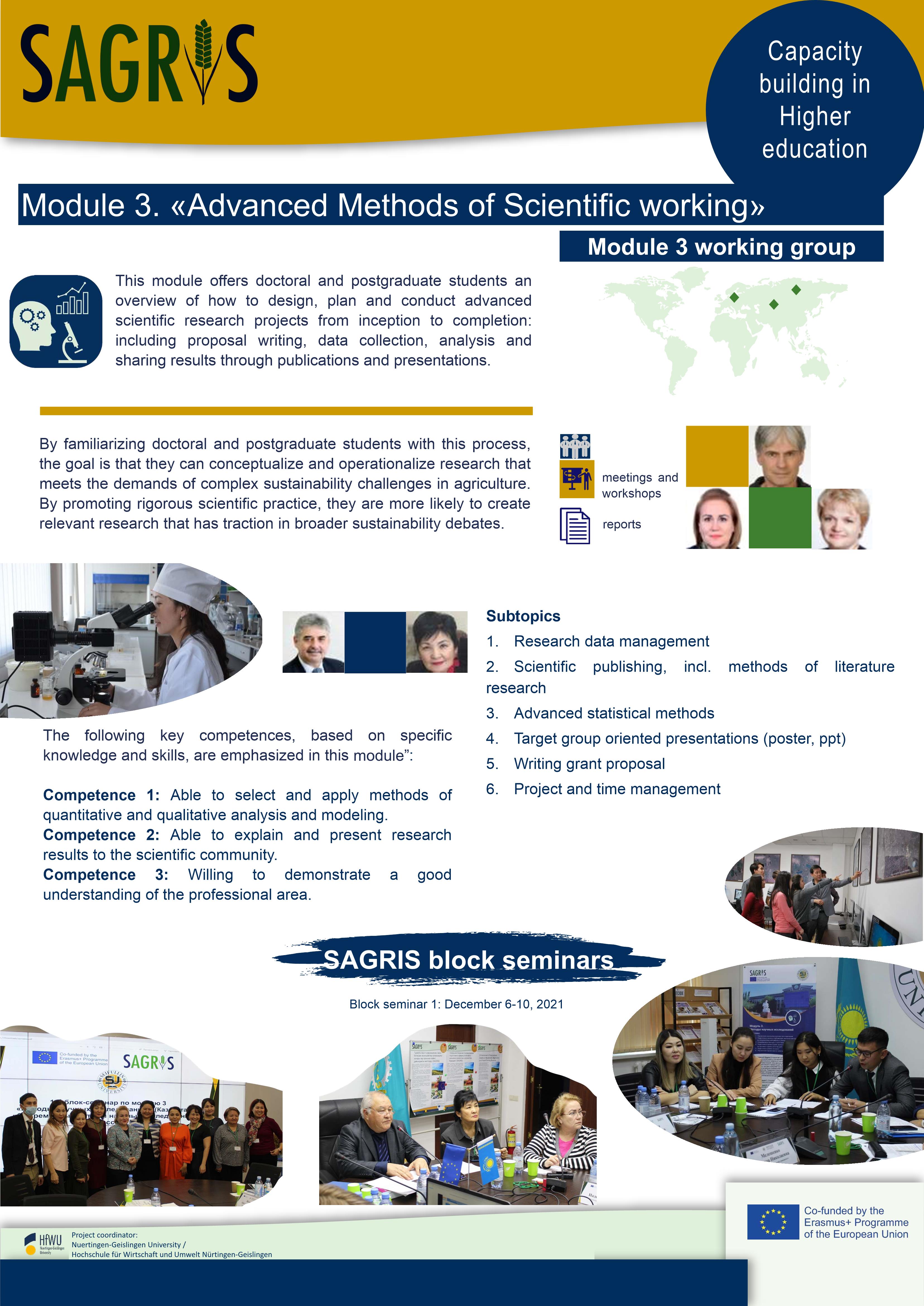
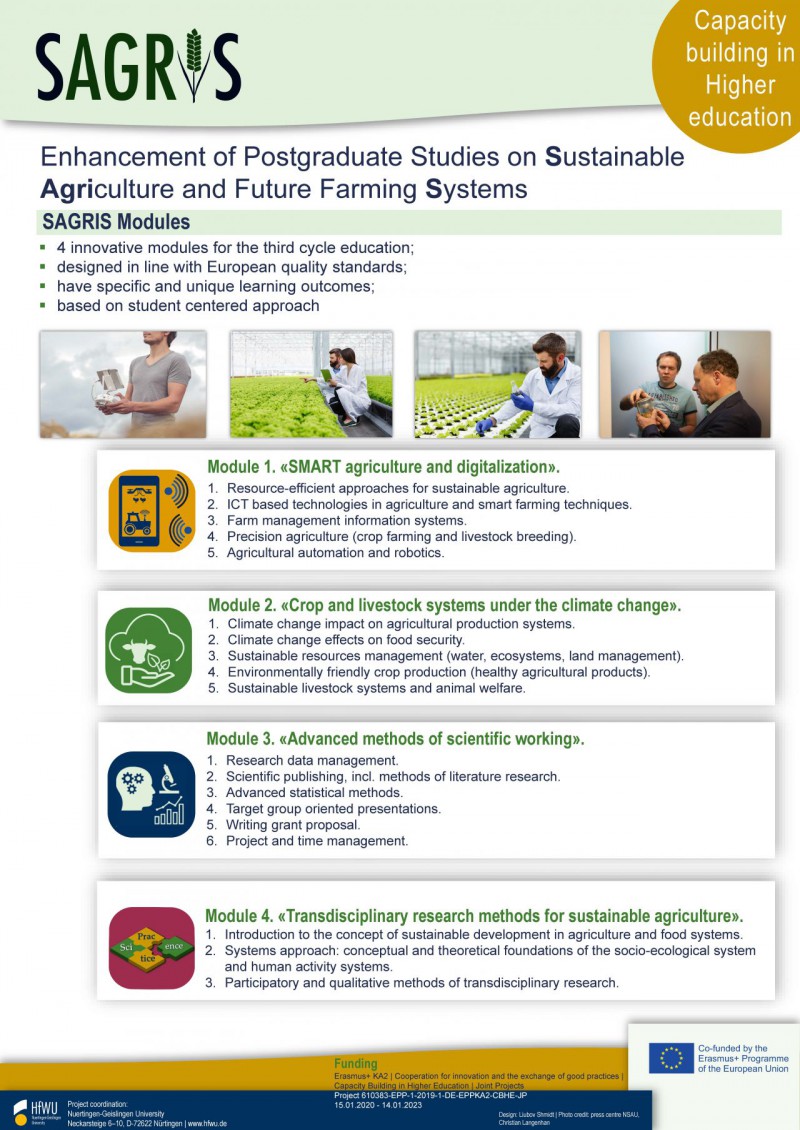
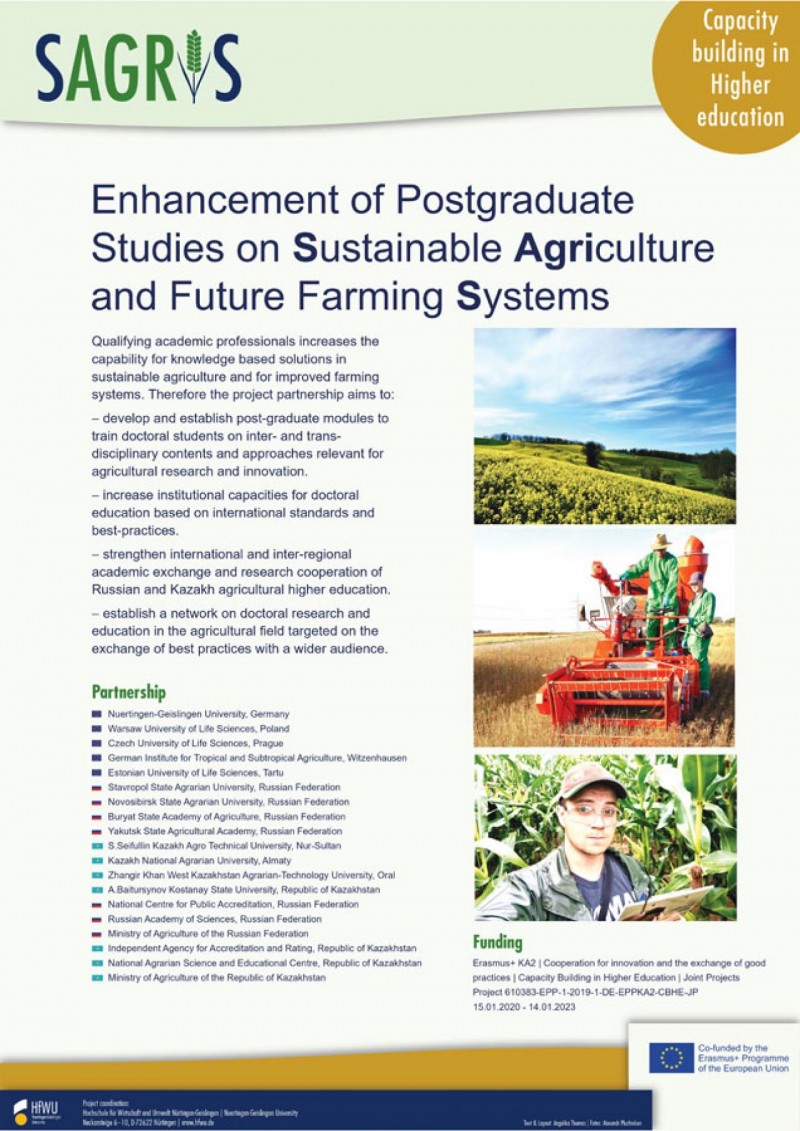
* "The European Commission's support for the production of this publication does not constitute an endorsement of the contents, which reflect the views only of the authors, and the Commission cannot be held responsible for any use which may be made of the information contained therein"
Module 1 «SMART agriculture and digitalization»
Module 2 «Crop and livestock systems under the climate change»
Module 3 «Advanced methods of scientific working»
Module 4 «Transdisciplinary methods for sustainable agriculture»
On December 9, 2022, the Kazakh National Agrarian Research University hosted the final conference „Actual and future development of postgraduate studies in Kazakhstan within the international frame" " within the framework of the ERASMUS+ project 610383-EPP-1-2019-1-DE-EPPKA2-CBHE-JP (2019-2086) Enhancement of postgraduate studies in the sphere of sustainable agriculture and future farming systems (SAGRIS).
Plenary session «Academia and Industrial Perspectives of PhD Education: the Key Components for meeting the high standards " was opened by the report " Assumptions of Industry and Science in the Republic of Kazakhstan from Young Researchers in the field of agriculture ", which was presented by Prof. Raushan Ramazanova, the Chairman of the Board, U.Uspanov Kazakhstani Research Institute of Soil Science and Agricultural Chemistry. The theme of the plenary session was continued by Prof. Dr. Michal Lostak, First Vice-Rector, Czech University of Life Sciences in Prague, Czech Republic with a report on “PhD Education: soft-skills and specific advanced knowledge in the field of sustainable agriculture”. Then, the leaders of the SAGRIS modules from Kazakhstani universities Kuanysh Zholamanov, Kazakh National Agrarian Research University, Indira Aitzhanova, A. Baitursynov Kostanay Regional University, Nadezhda Meleshenko, S. Seifullin Kazakh Agrotechnical University, Irina Bogdashkina, Zhangir Khan West-Kazakhstan Agrarian Technical University shared the key achievements of the SAGRIS project.
Great interest was aroused by the reports of non-academic project partners O. Yanovskaya (Independent Agency of Accreditation and Rating of the Republic of Kazakhstan) and A. Tursinbayeva (National Agrarian Scientific and Educational Center of the Republic of Kazakhstan)
Dr. Angelika Thomas from Nuertingen-Geislingen University (Germany) presented the report “SAGRIS Network on doctoral education and research for sustainable agriculture and future farming systems”. And at the end of the conference, a round table was held on the topic: “ SAGRIS Modules and new PhD-programmes: students’ perspectives”.
Doctoral students - representatives of all partner universities shared their impressions of the knowledge gained from participating in this project and expressed their confidence that the modules of the SAGRIS project are of great importance in their research work and are very useful for achieving their goals. The conference ended with a brief speech by the project manager Professor Dr.Heinrich Schuele
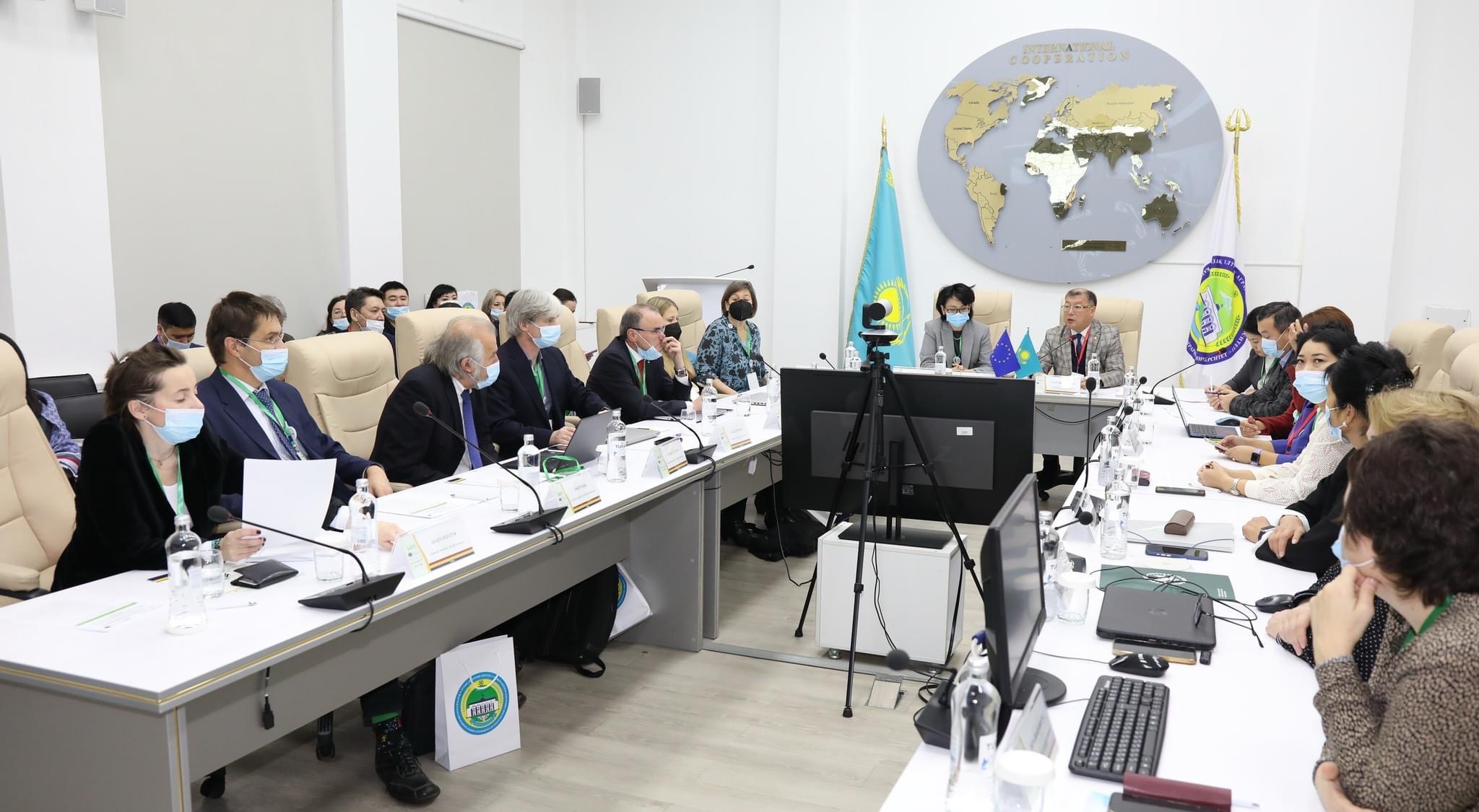
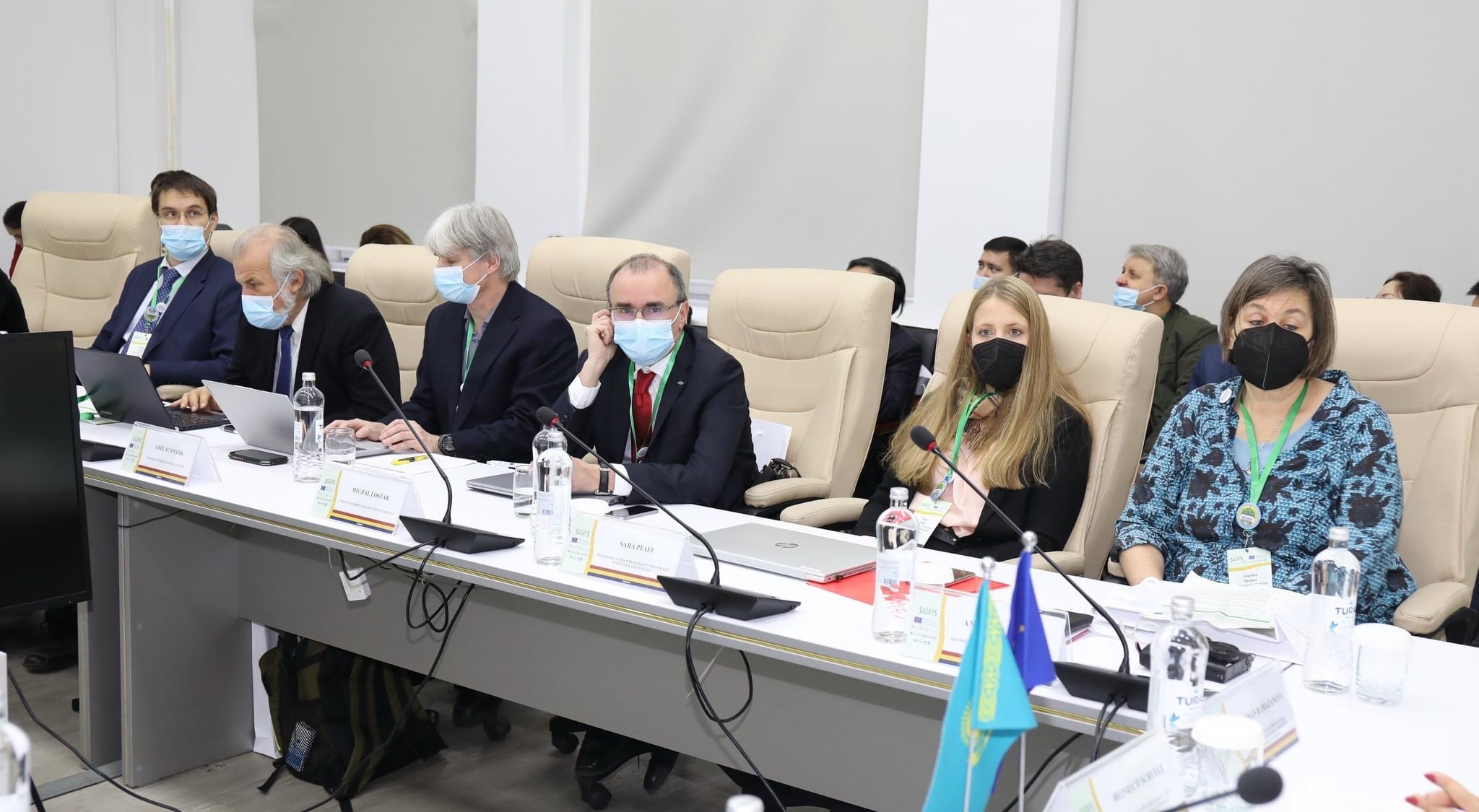
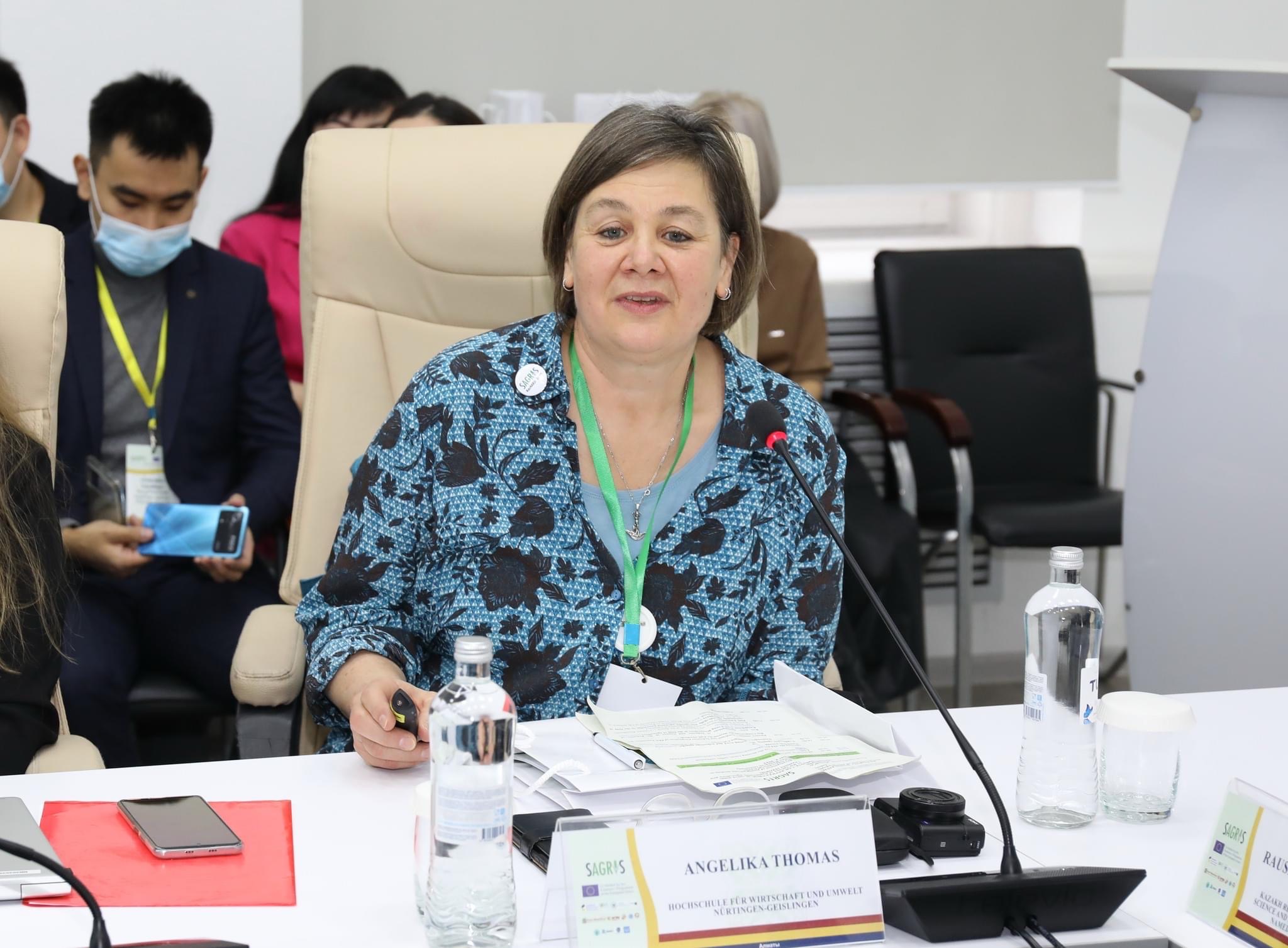
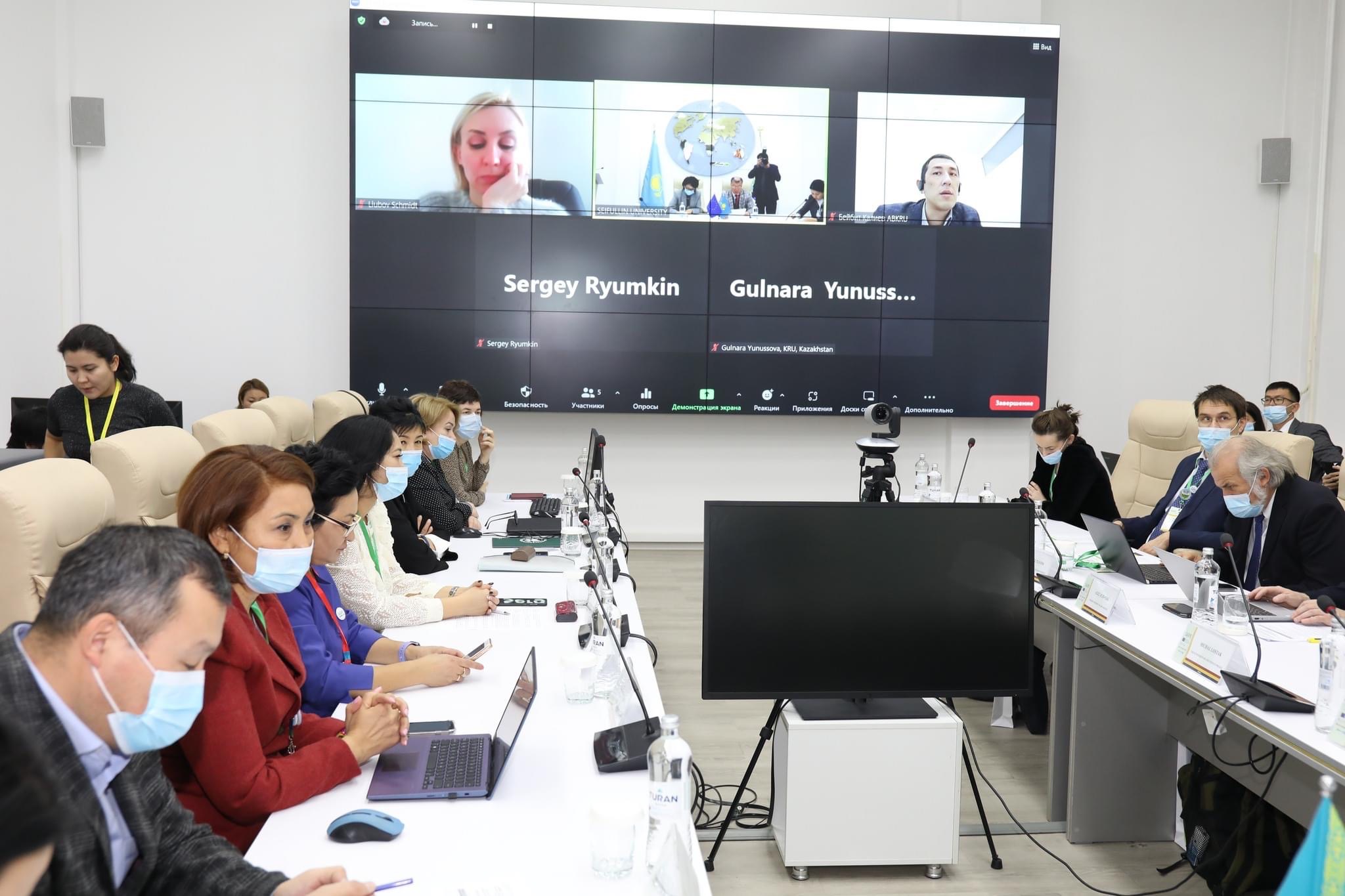
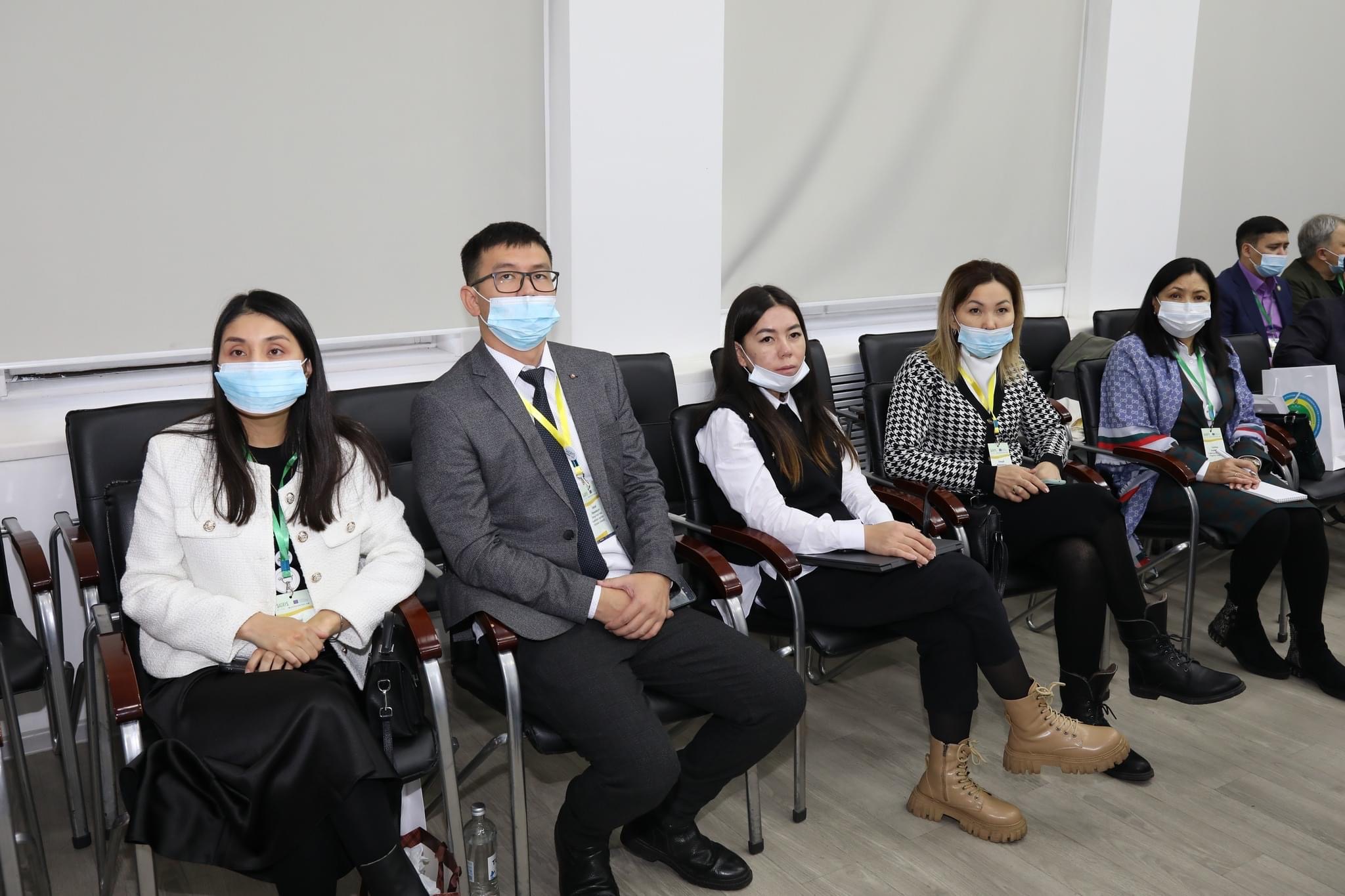
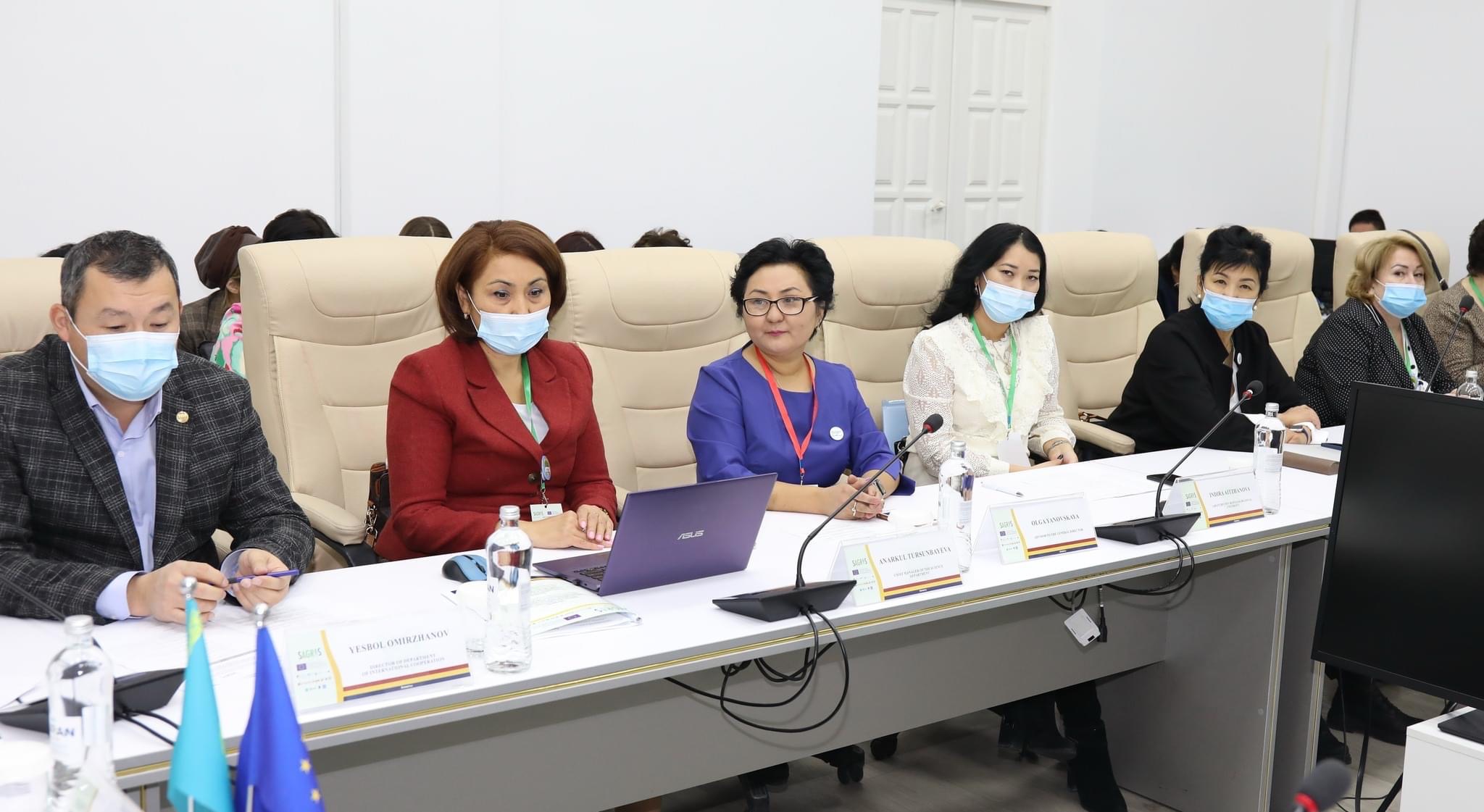
In the period from December 5 to 8, 2022, the second block seminar on Module 3 " Advanced methods of scientific research " of the international project SAGRIS was held at the Kazakh National Agrarian Research University. It was attended by teachers and doctoral students of four Kazakhstani universities: Kazakh National Agrarian Research University, S. Seifullin Kazakh Agrotechnical University, Zhangir Khan West Kazakhstan Agrarian Technical University, A. Baitursynov Kostanay Regional University, as well as European partners from Germany, Poland and the Czech Republic. On the first day, the leader of Module 3, Professor Axel Schwerk (Warsaw University of Life Sciences, Warsaw, Poland) shared the experience of a long-term project: 34 years research on forest ecology in Poland. Groups of doctoral students were offered assignments on the subtopics of Module 3, taking into account the topics of their doctoral dissertations.
On December 6, 2022, a tour of the Kazakh National Agrarian Research University was held for the participants of the block seminar, doctoral students. On the same day, the head of the science department of the National Agrarian Scientific and Educational Center of the Republic of Kazakhstan E.N. Satenbayev made lecture about the prospects for the development of agricultural science in the Republic of Kazakhstan for the period from 2023 to 2026. Then PhD, a representative of the A. Baitursynov Kostanay Regional University L. Seleuova made a lecture on the topic
“Search and selection of sourses of funding for a grant proposal” A second-year doctoral student of the same university, A. Tabuldenov, shared his experience in finding and writing a grant proposal. During the workshop, Dr., Ph.D. I.S. Beishova, doctoral student Gulmira Bekova told about the experience of participation of PhD students in the implementation of grant projects at Zhangir Khan West Kazakhstan Agrarian Technical University. At the end, the doctoral student of the above mentioned university A. Kozhaeva made a presentation on the topic “Preparation of a scientific publication based on the results of a grant project: the experience of a doctoral student”.
On December 7 and 8, 2022, all reports were aimed at helping doctoral students in completing the assignments and were devoted to the topics: “Project management and time management” and “Preparation of presentations focused on target groups”. Among them there were speeches by representatives of different universities, the topics of which concerned both the development of an organizational structure, project management, risk assessment and presentation, as well as the publication of articles and the ethics of scientific work, namely:
• Lecture_The art of successful presentation. Dr. Gulden Murzabekova, S. Seifullin Kazakh Agrotechnical University..
• Workshop_Reputable vs Predatory journals: How to Spot the Difference? Zhuldyz Orazymbetova, Expert -manager of the Information and Bibliographic Office of the Nazarbayev University Library.
• Workshop_ Be creative - a few ideas for effective presentations and public speaking. Dr. Małgorzata Korczak-Abshire, Institute of Biochemistry and Biophysics, Polish Academy of Sciences, Warsaw University of Life Sciences, Poland.
• Lecture_Ethics of scientific work. Prof. Dr. Michal Lostak, Czech University of Life Sciences, Prague.
On December 9, 2022, the final conference " „Actual and future development of postgraduate studies in Kazakhstan within the international frame"" was held. At the plenary session on the topic "Academia and Industrial Perspectives of PhD Education: the Key Components for meeting the high standards " the reports were made by Dr. R. Ramazanova, the Chairman of the Board, U.Uspanov Kazakhstani Research Institute of Soil Science and Agricultural Chemistry on the topic Assumptions of Industry and Science in the Republic of Kazakhstan from Young Researchers in the field of agriculture", and Prof. Dr. Michal Lostak, First Vice-Rector, Czech University of Life Sciences in Prague, Czech Republic " PhD Education: soft-skills and specific advanced knowledge in the field of sustainable agriculture"
At the sessions, representatives of all universities introduced the key achievements of the SAGRIS project: the impact of SAGRIS modules on the development of the university. And then there were reports made by the representative of the Independent Accreditation and Rating Agency of the Republic of Kazakhstan, Dr. O. Yanovskaya " Ensuring quality of educational programmes when training postgraduate students in the sphere of sustainable agriculture", representative of the National Agrarian Scientific and Educational Center of the Republic of Kazakhstan, Dr. A. Tursinbayeva " SAGRIS project: success story for scientific novelty" and project manager, Dr. Angelika Thomas, Nuertingen-Geislingen University, Germany " SAGRIS Network on doctoral education and research for sustainable agriculture and future farming systems".
At the end, the project participants expressed their gratitude and satisfaction with the results of the three-year fruitful cooperation, and the head of the SAGRIS project, Professor Dr.Heinrich Schuele, Nuertingen-Geislingen University, Germany summed up the event and awarded certificates to the participants of the conference and block seminar.
The seminar on the international project SAGRIS was held from November 7 to 18, 2022 at the Warsaw University of Natural Sciences (Szkoła Główna Gospodarstwa Wiejskiego) - the oldest agrarian and natural science university in Poland, founded in 1816. It was attended by teachers and doctoral students of four Kazakhstani universities: Kazakh National Agrarian Research University, S. Seifullin Kazakh Agrotechnical University, Zhangir Khan West Kazakhstan Agrarian Technical University, A. Baitursynov Kostanay Regional University.
The program of the study trip was very rich. On the first day, the project leader, head of the department, Professor Axel Schwerk acquainted all those present with the program and objectives of the training seminar and conference. The guests got acquainted with the achievements and material base of the university. The next day there was an excursion with a visit to a sheep farm in Zelaznya. On November 9, 2022, an acquaintance with the scientific research of the Institute of Animal Sciences, didactic scope of the Faculty of Breeding, Bioengineering and Animal Protection, as well as a visit to the Large Animal Clinic of the Institute of Veterinary Medicine in Wolica took place.
On November 10, 2022, workshop on scientific publishing was held, which was conducted by Professor Mateusz Grygoruk, editor of leading peer-reviewed journals. Also a meeting with the Department of International Relations of the Warsaw University of Life Sciences was organized; whose representatives shared information about the possibilities of various programs and projects. In addition, a cultural program was also thought out. Thus, excursions to the house-museum of Frederic Chopin and to get acquainted with the sights of Warsaw were organized for teachers and doctoral students of Kazakhstani universities.
From November 14 to 15, 2022, teachers and doctoral students from Kazakhstani universities took part in the 3rd International Conference on Geoinformatics, Remote Sensing and Engineering in Spatial Planning and Environmental Science. Environment in times of hazard. Representatives of S. Seifullin Kazakh Agrotechnical University Meleshenko N.N. and Murzabekova G.E. made a report on the first day of the conference on the topic "Developing a set of models based on data mining for wheat yield forecasting."
The workshop “Teledetection" and the field trip with various types drone presentation were interesting and informative. According to the program of the block seminar, the reports of the module developers on the preparation of presentations aimed at target groups and on the R software for statistical analysis were heard
On the final day, Aigul Ismailova, a young teacher of KazNAU, presented her test lecture on the topic "Pre-investment stages of the project and types of evaluation".
At the end of the block seminar, Axel Schwerk summed up the results, feedback from doctoral students and seminar participants was received. All participants of the block seminar were awarded certificates of participation and memorable souvenirs. The seminar participants shared their impressions of the block seminar, the high appreciation of which will undoubtedly contribute to the enhancement of postgraduate studies on sustainable agriculture and future farming systems.
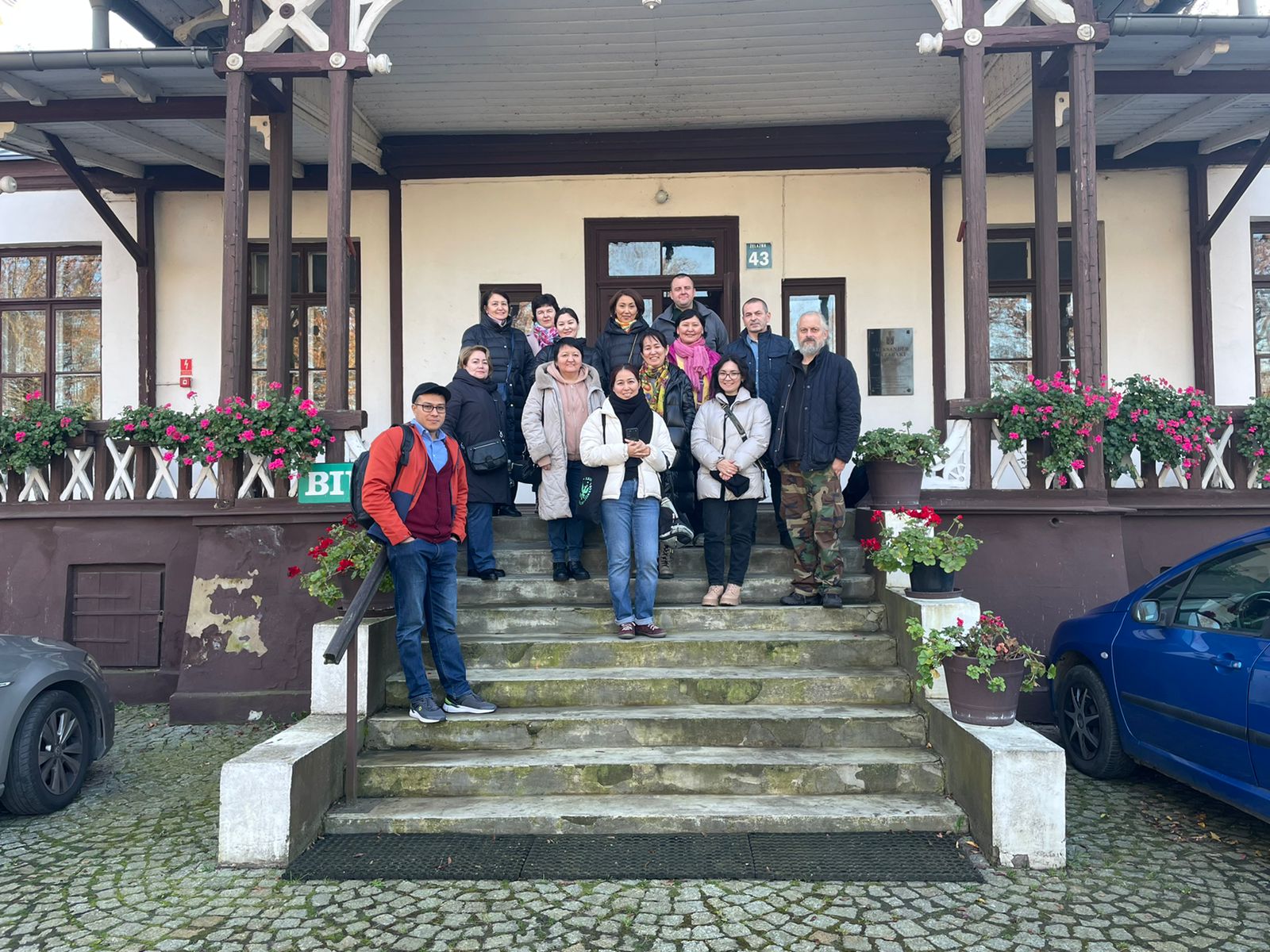
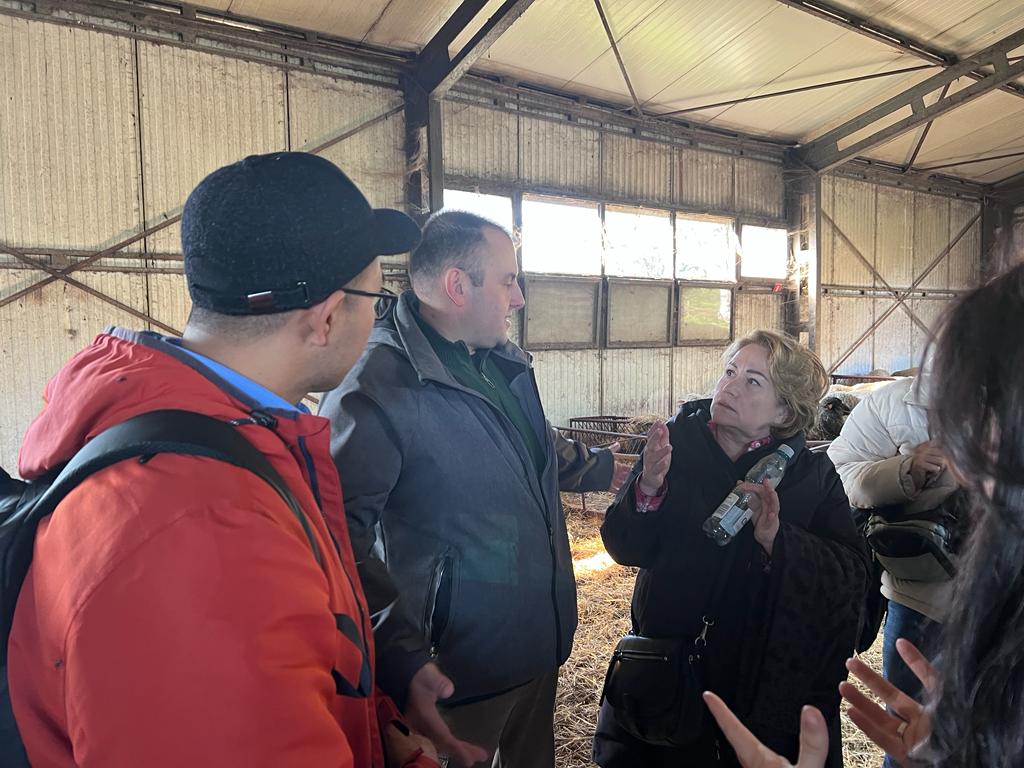
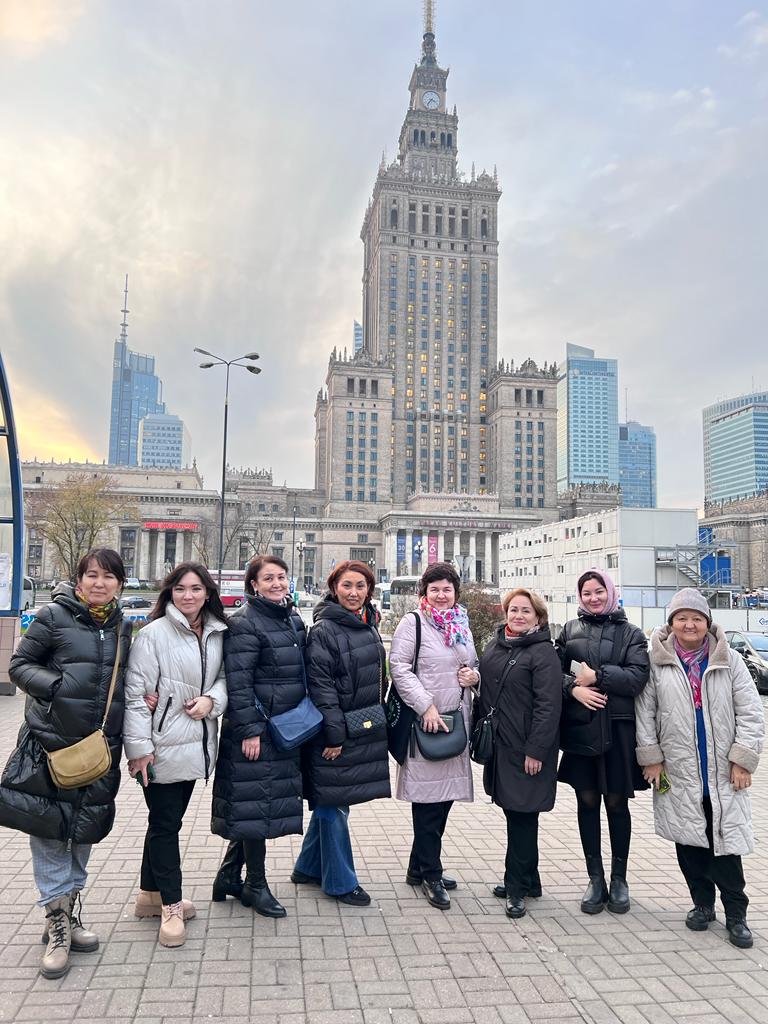
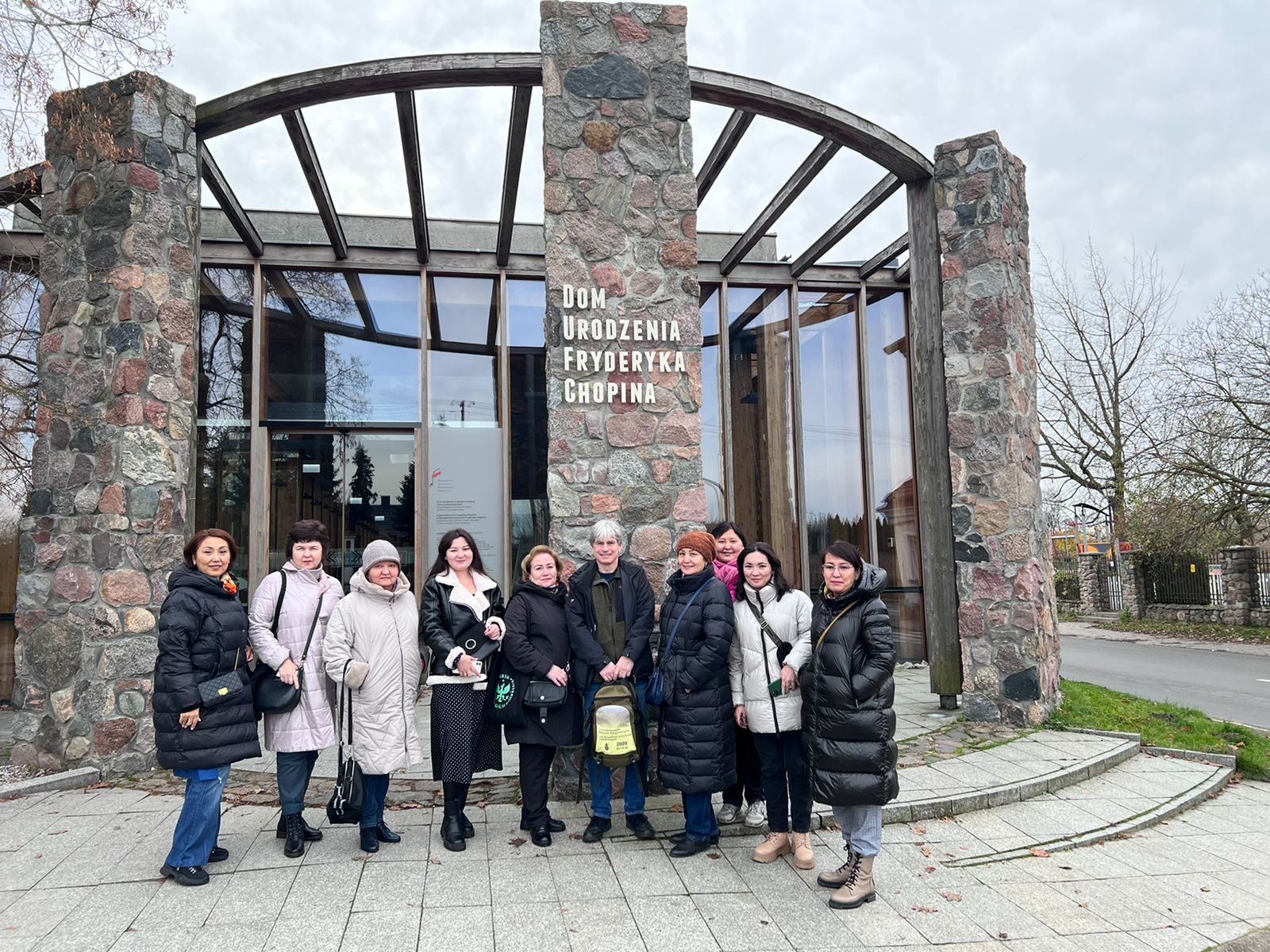
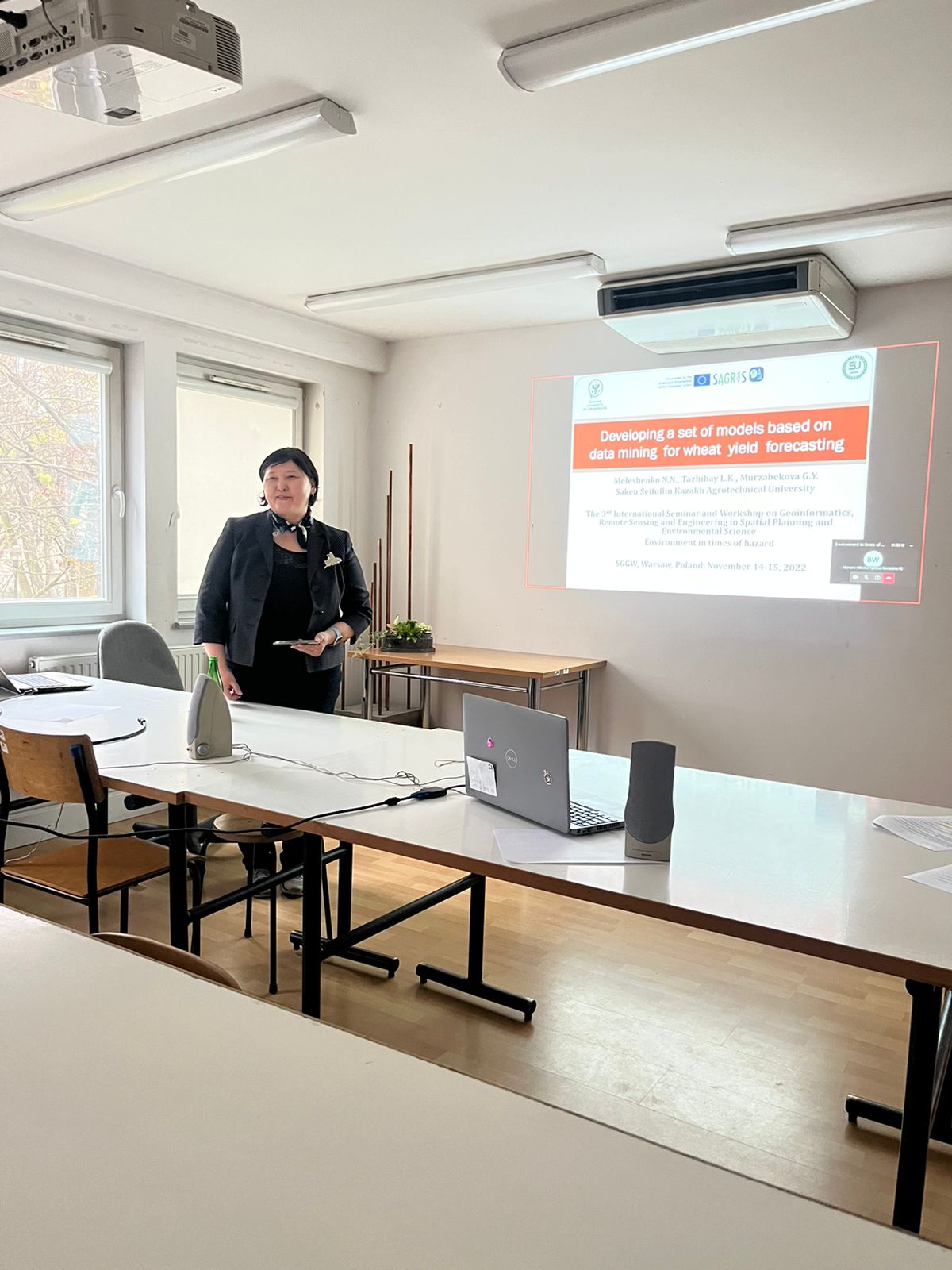
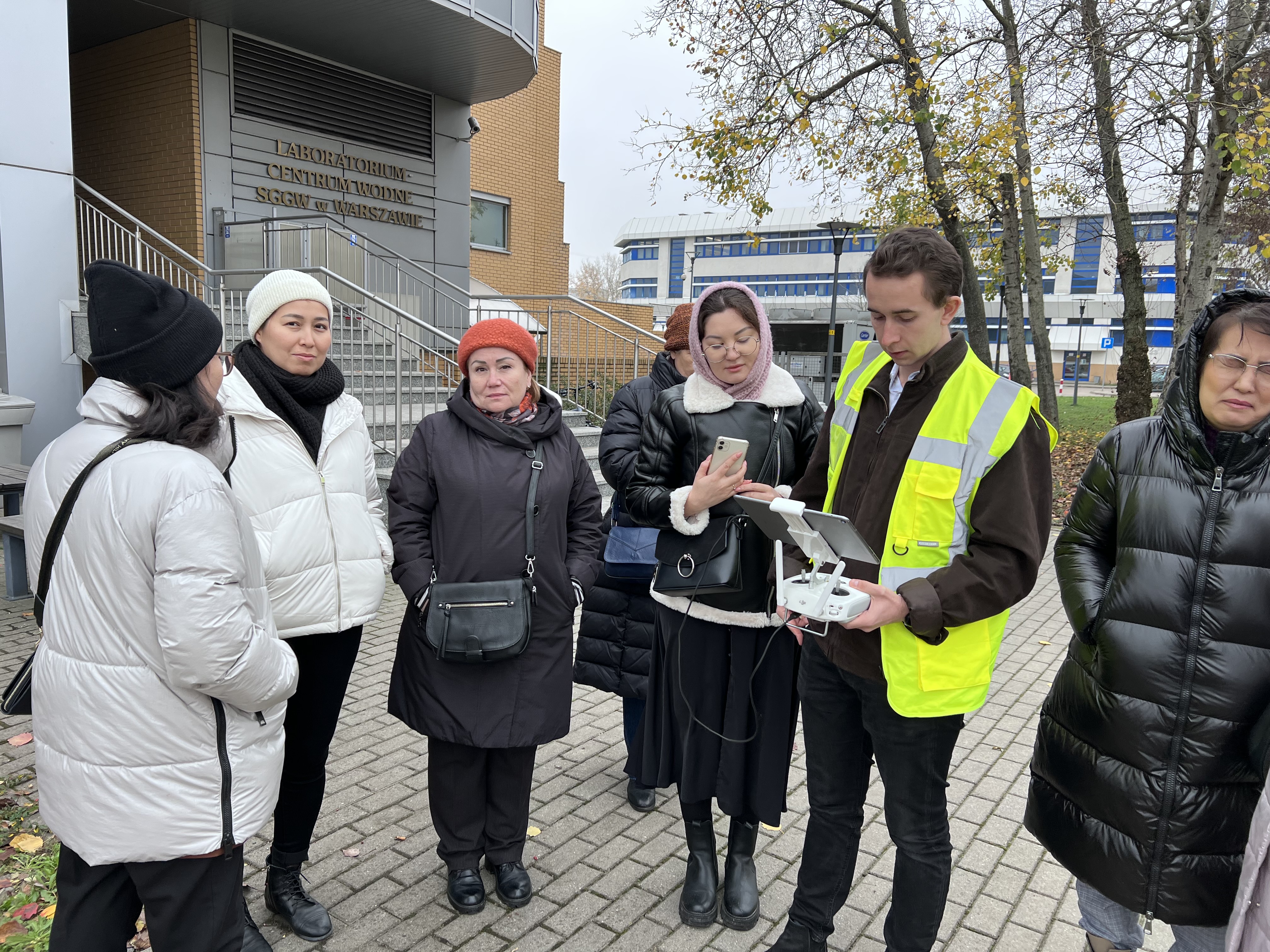
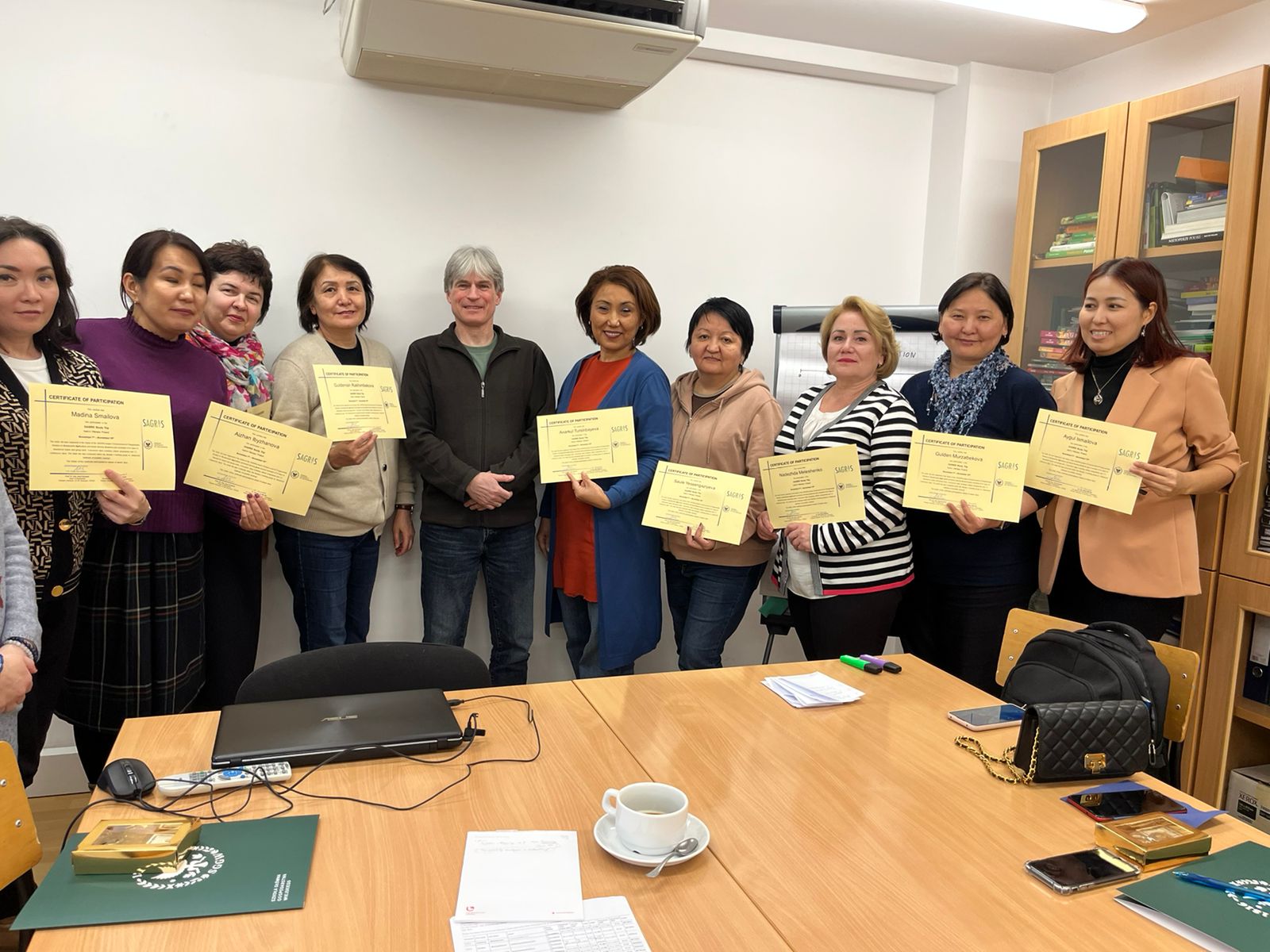
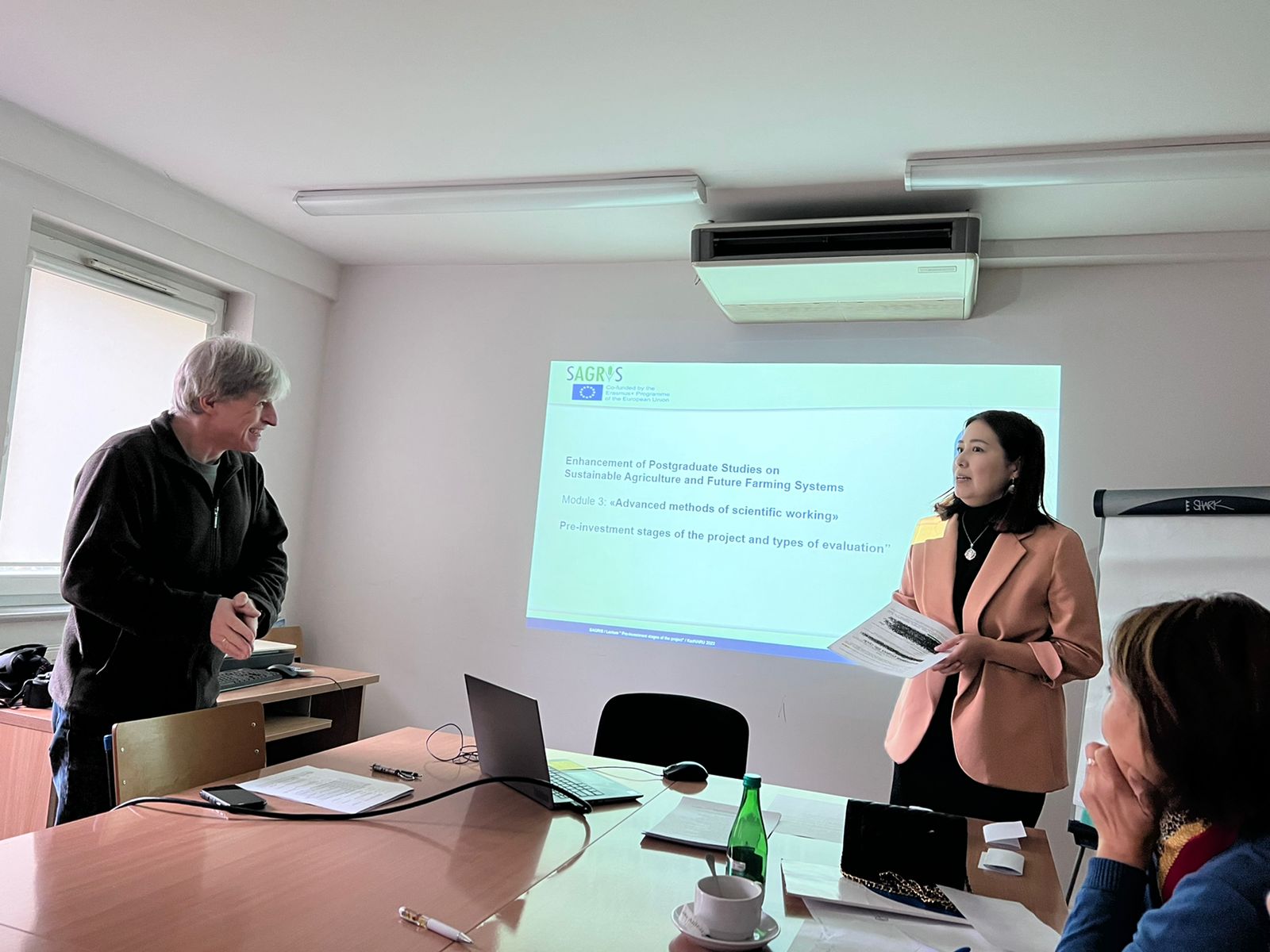
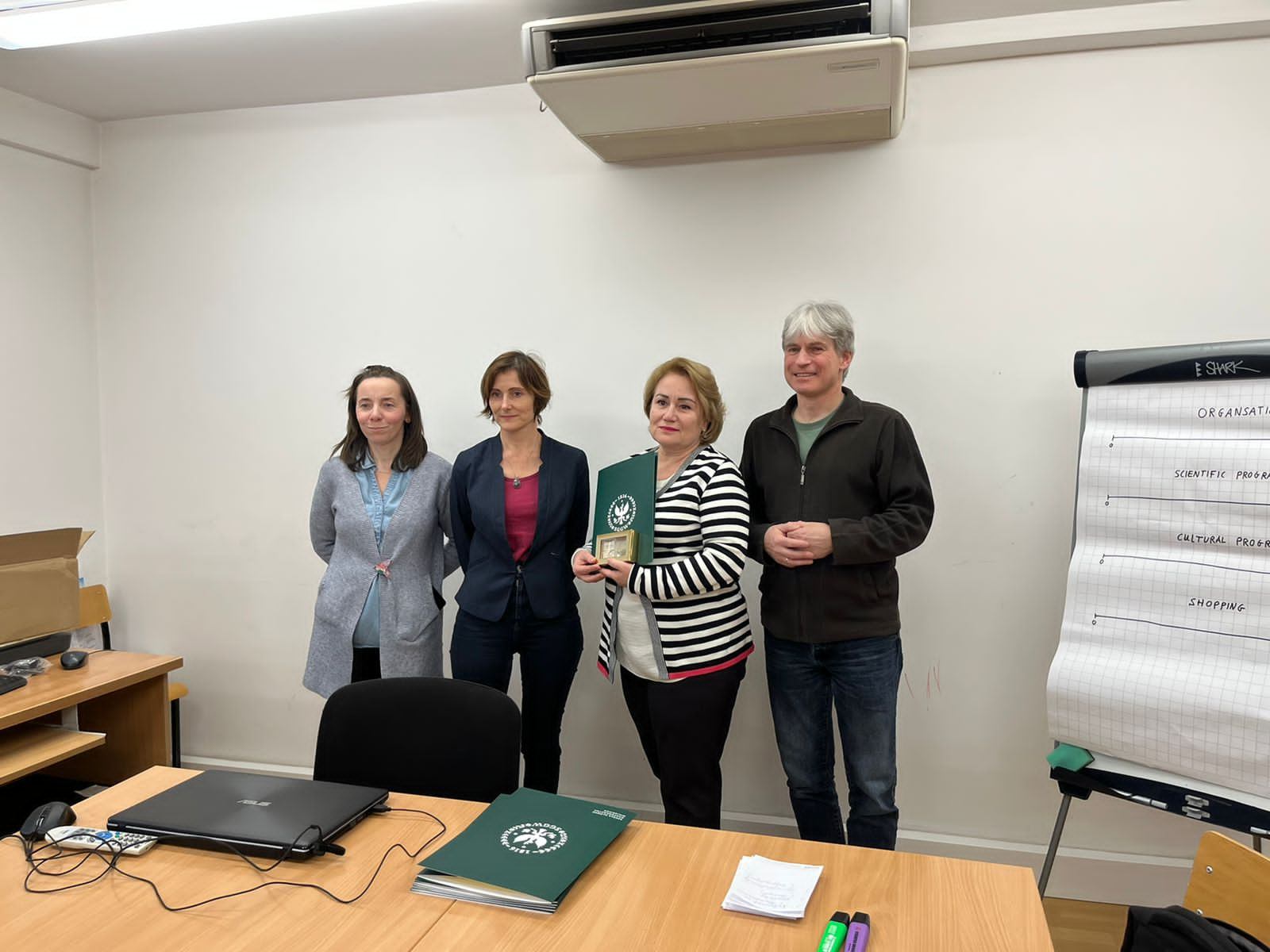
Within the framework of the SAGRIS program, at the Czech University of Life Sciences (Prague) from October 23 to November 6, in module 2 "Crop and animal husbandry in the face of climate change", teacher Baitelenova A.A. and 3rd year doctoral student Zhirnova I.A. have been trained.
As a result of this trip, the participants gained new knowledge and experience both in the educational process and in the practical application of knowledge about agriculture. During the trip, there were trips to the educational facilities of the university, which have various directions, these enterprises are excellent bases for practice for university students. The participants of the seminar could get acquainted with the family farm "AgroPodlesi", which has a full production cycle, here they could get acquainted with animal husbandry, crop production, processing and even obtaining biogas, visited the Millerfamily farm livestock farm with full automation of the work process. Also, the participants were given a course of lectures on modern research of this university, students take an active part in these studies, the results of which were also familiarized.
This trip is of great importance for teachers of higher schools, it is a new look at the usual work of the teacher himself. Everyone was able to note something new and useful for themselves and will definitely be able to apply it in the course of the educational process and in scientific research within the walls of their university.
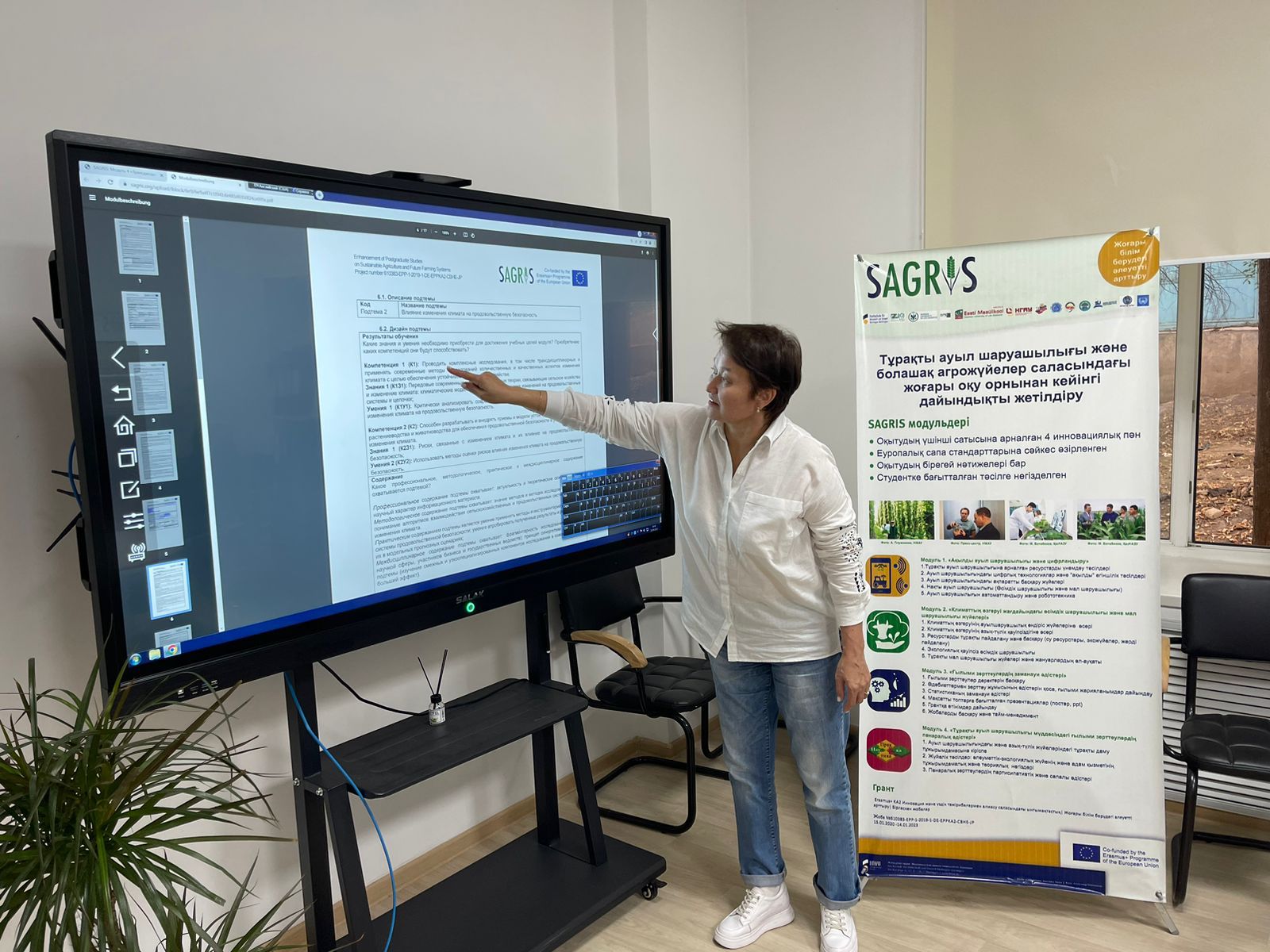
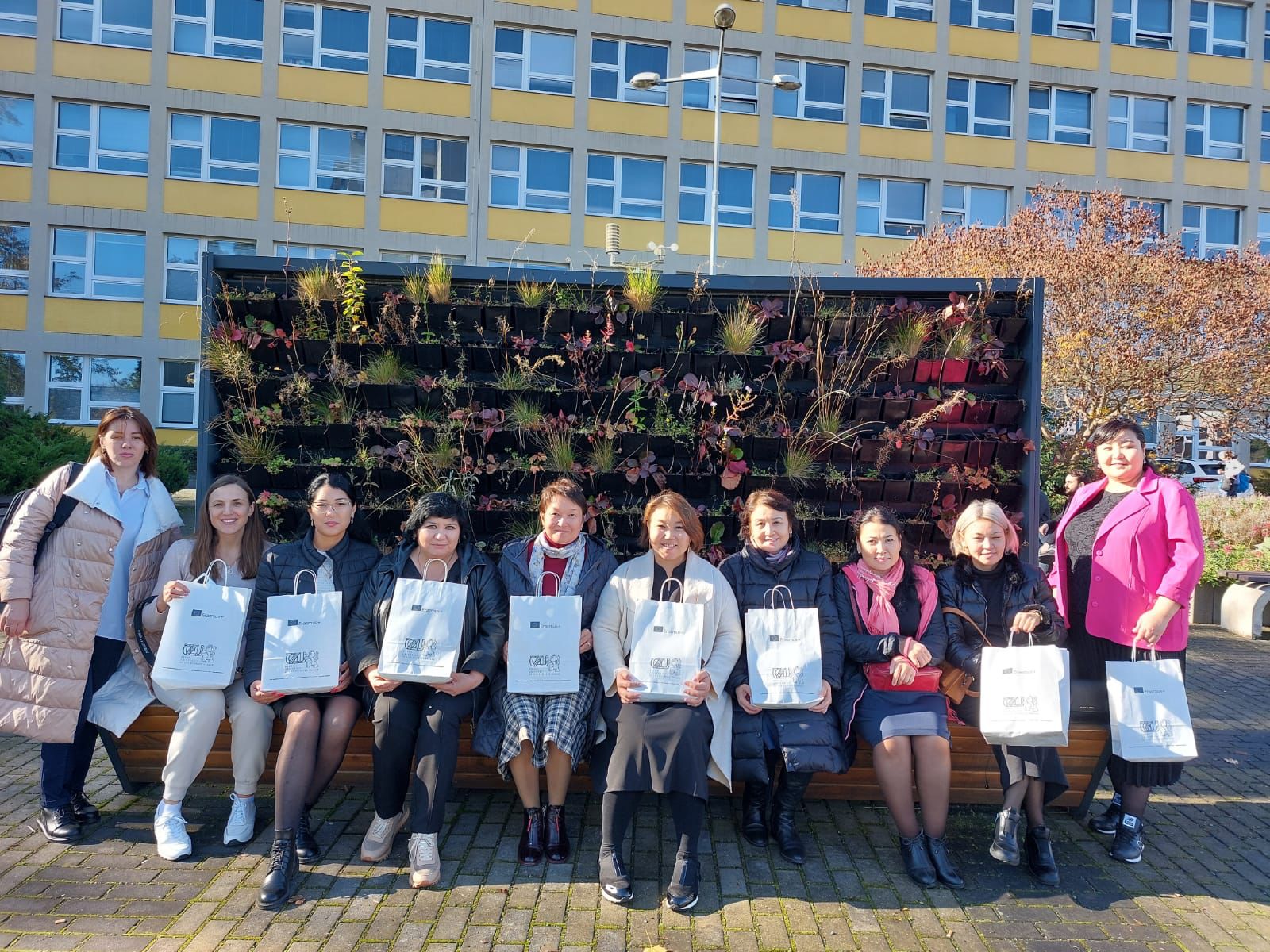
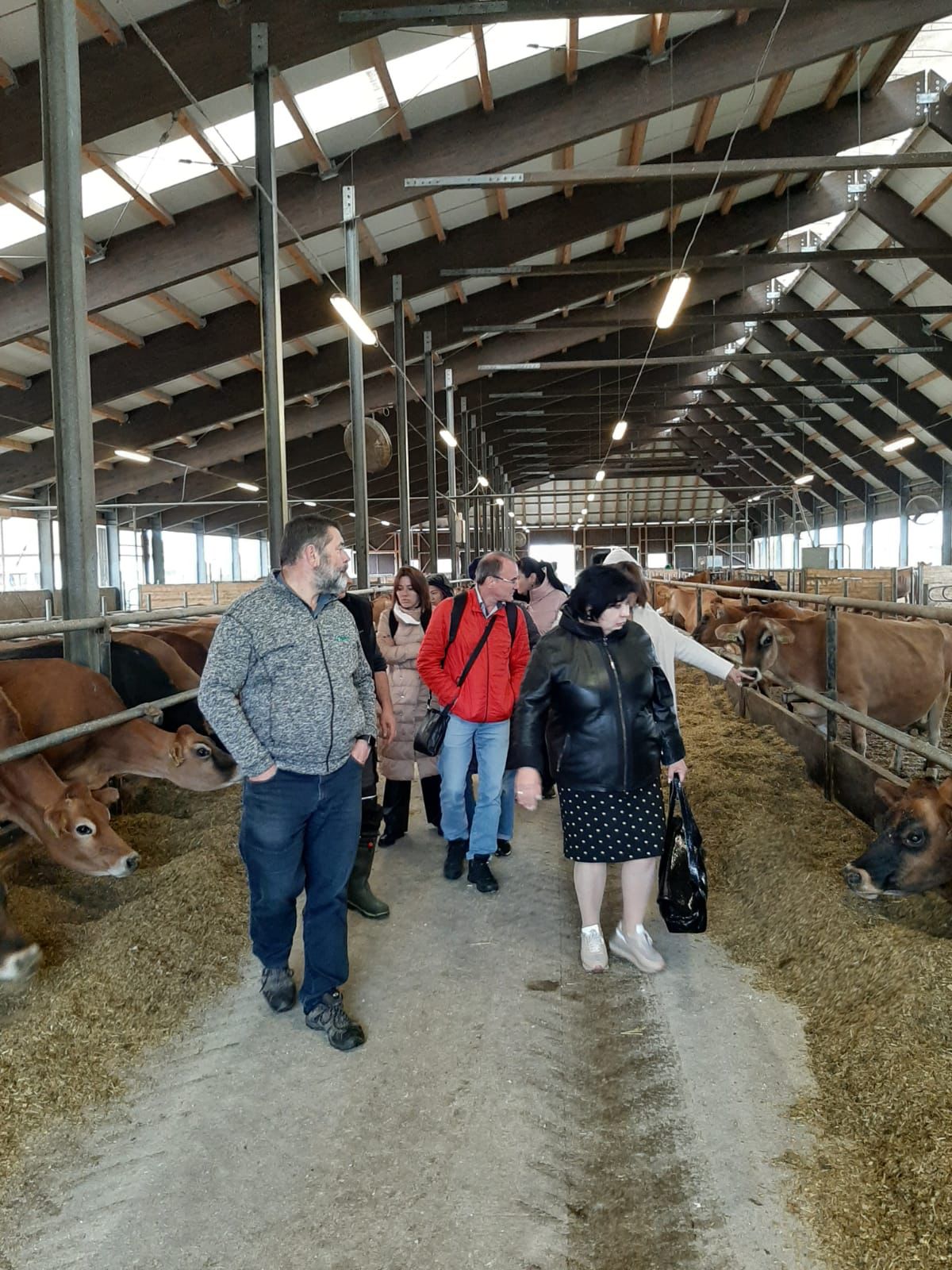
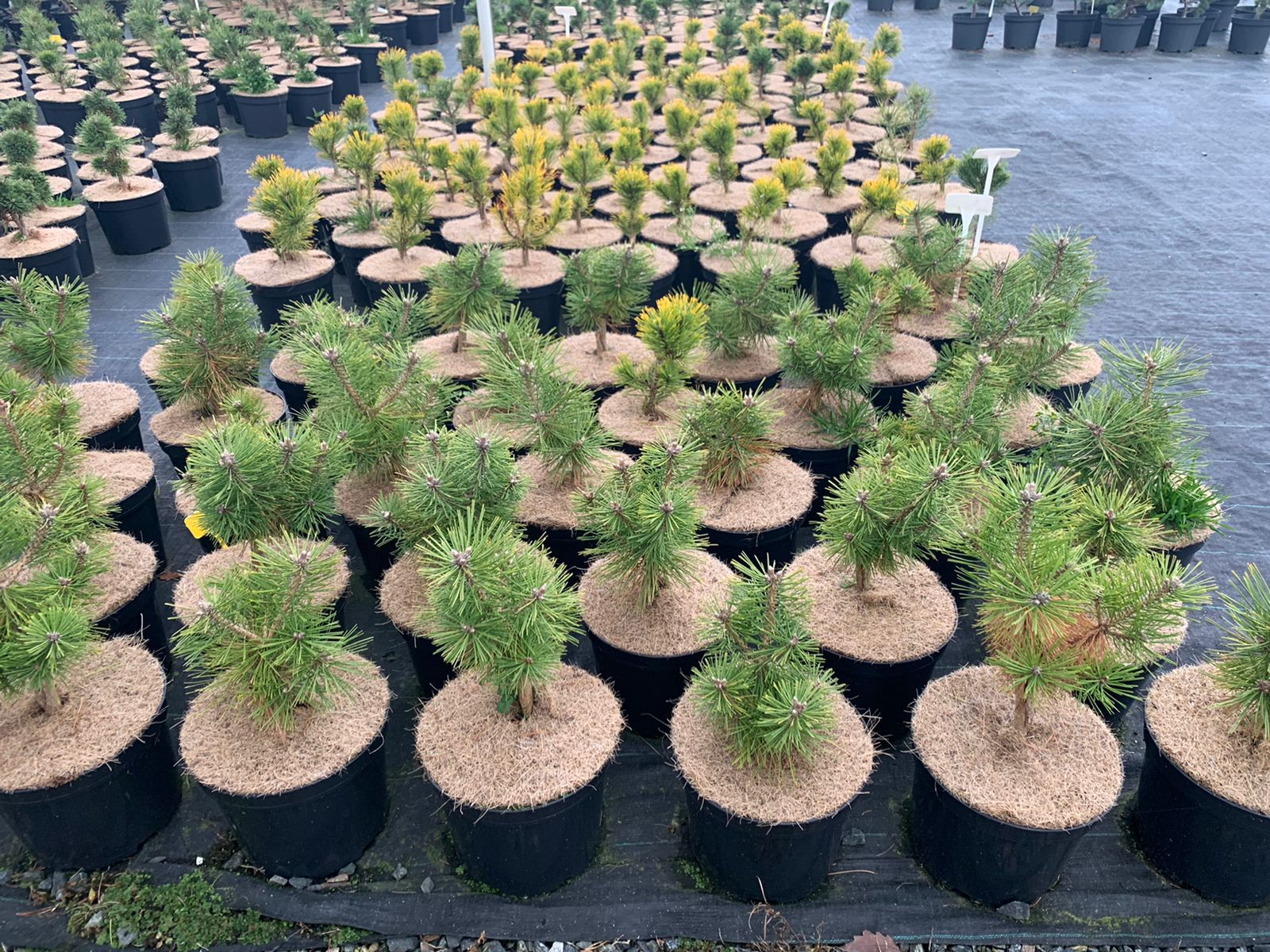
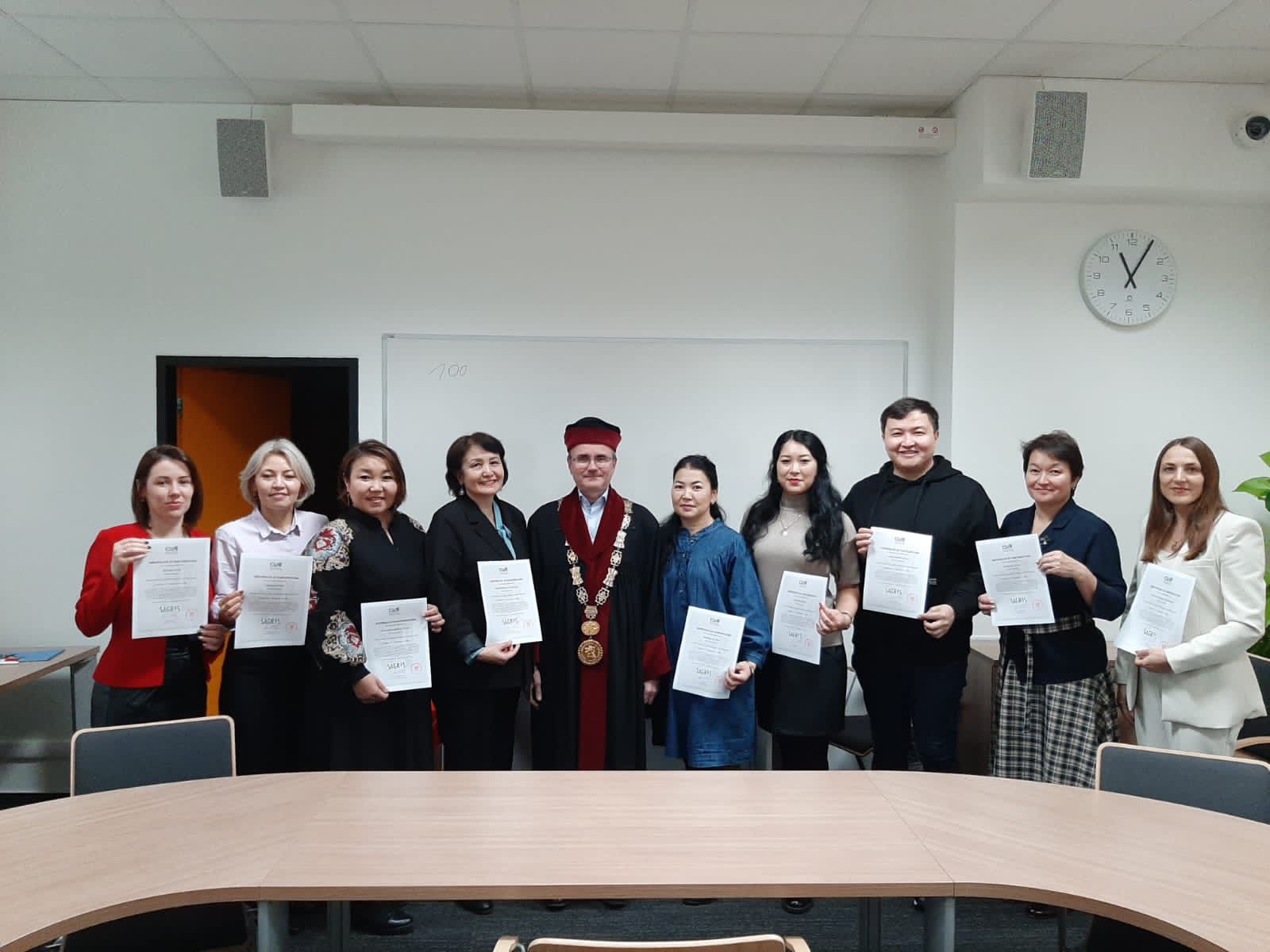
The first Block Seminar on module 4 “Transdisciplinary research methods for sustainable agriculture” within the framework of the EU Erasmus + project “Improving postgraduate education in the field of sustainable agriculture and agrosystems of the future” SAGRIS took place from 11 to 20 May 2022 at the German Institute Tropical and Subtropical Agriculture University of Kassel (hereinafter DITSL), Witzenhausen, Germany. From S. Seifullin Kazakh Agrotechnical University (hereinafter KATU) the seminar was attended by developers of the SAGRIS project Imasheva A.Sh., Deputy Director of the Department for Academic Affairs (on-line) and Kitaibekova S.O., senior lecturer of the Department of Forest Resources and Forestry.
During the Block Seminar, partners from European universities and Kenyan doctoral students made a presentation of a transdisciplinary project: “Cultural landscape of Hohenlohe”, “Planning a transdisciplinary project - problem analysis, actor analysis” Angelika Thomas; "Multi-factor collaboration in dairy farming in Kenya" by Joan Albrecht; "Analysis of activities and knowledge", "Data collection in a transdisciplinary project - participatory assessment tools, narrative interview", "Overview of methods used in a transdisciplinary project (on the example of a project on small dairy farms)" Brigitte Kaufman; “EU Examples of Transdisciplinary Projects” Anya Kristink; "Qualitative Data Analysis" by Patricia Kiprono.
The participants took an active part in the practical part of the seminar: role-playing games, teamwork to identify the causes and consequences of problems using the topics given to the participants as an example. During the workshop, participants visited 3 largest dairy farms, a sheep farm, a DITSL greenhouse, which was an example for identifying the causes and consequences of problems in the field of transdisciplinary research.
In conclusion, the participants of the seminar were cordially received by the director of DITSL Christian Hülsebusch, where issues of cooperation in the field of science and education with the universities of Kazakhstan and Europe were discussed.
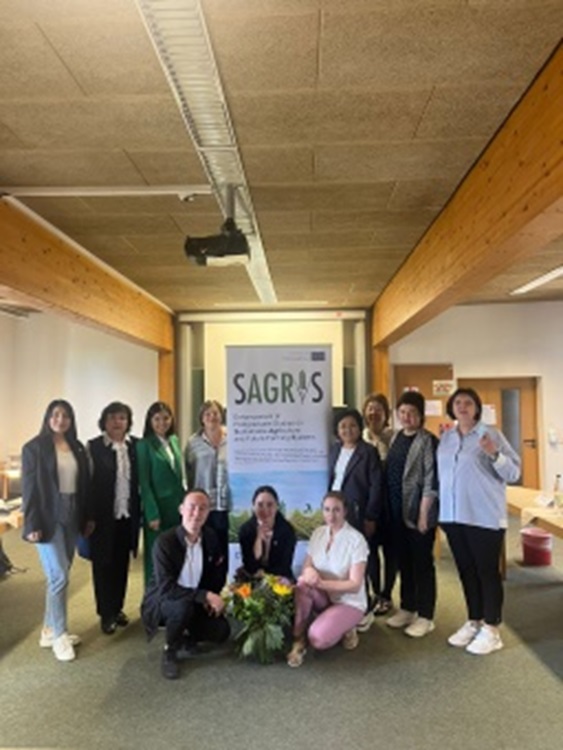
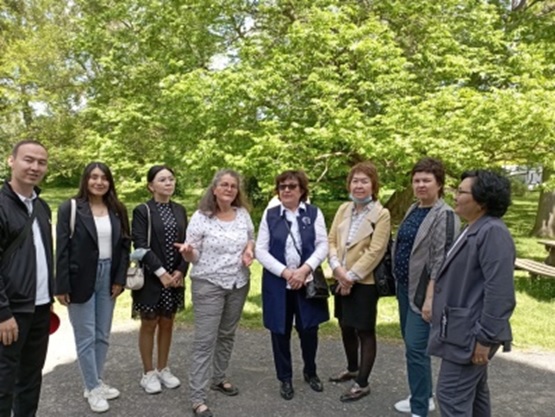
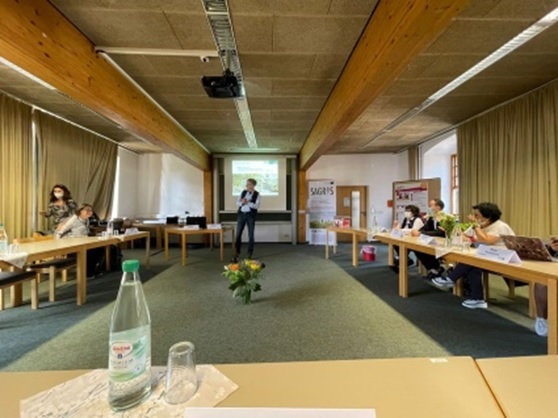
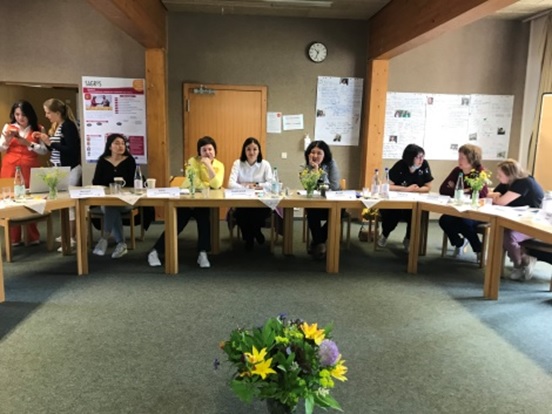
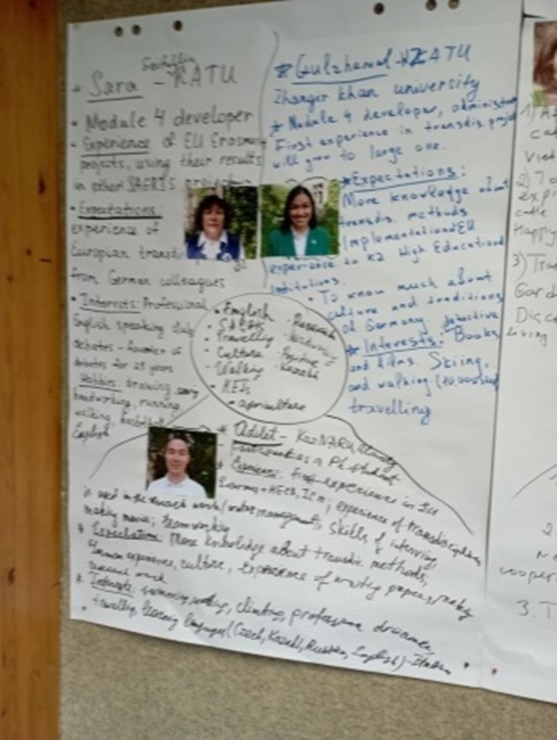

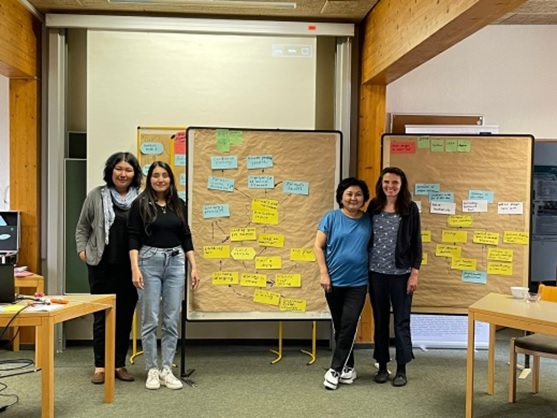
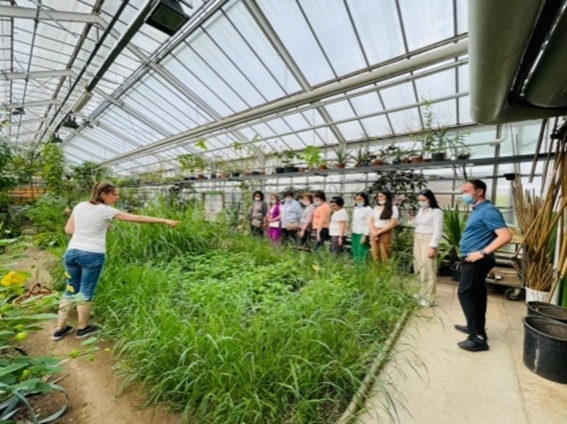
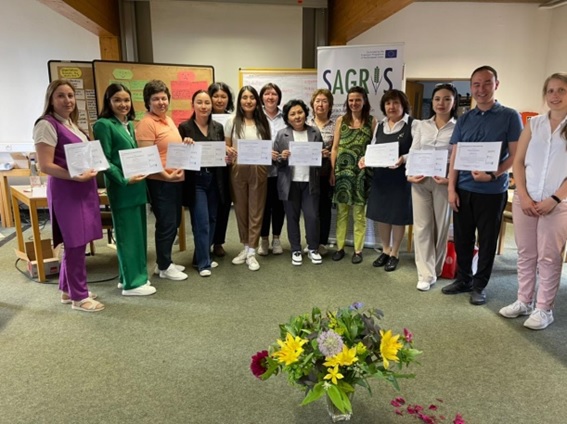
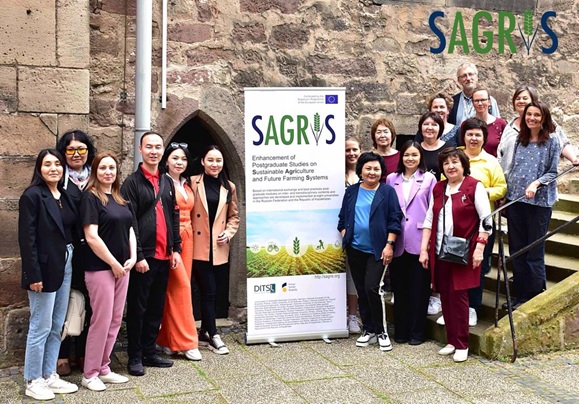
The block seminar on module 4 “Transdisciplinary research methods for sustainable agriculture” within the framework of the EU Erasmus + project “Improving postgraduate education in the field of sustainable agriculture and agricultural systems of the future” SAGRIS was held from 25 to 29 October 2022 at the Arctic State Agrotechnological University (hereinafter ASATU), Yakutsk, Republic of Sakha, Yakutia. The block-seminar was partly held in a hybrid form, using remote technologies for the participation of experts from the countries of the European Union, as well as graduate students, doctoral students and teachers from partner universities in Russia and Kazakhstan. From S. Seifullin Kazakh Agrotechnical University (hereinafter KATU) seminar was attended by the developers of the 4th Module Imasheva A.Sh., Deputy Director of the Department for Academic Affairs and Kitaibekova S.O., senior lecturer of the Department of Forest Resources and Forestry as well as doctoral students: Tleulesov N., Department of Forest Resources and Forestry and Kuzbakova M., Department of Agriculture and Crop Production.
During the Block Seminar, the presentation of the SAGRIS project and its objectives was made online by Anna Borsuk, project manager from the University of Nürtingen Geislingen (Germany) and Lilan Beck from the German Institute for Tropical and Subtropical Agriculture (Germany), who conducted a master class on the application of participative methods for graduate students on creating a video on the topics of the seminar block using a smartphone. To create a video, the workshop participants visited a livestock breeding farm of local cattle, where doctoral students professionally interviewed farmers and created videos that were discussed in subsequent block workshops. Ayan Nyukkanov from ASATU held a business game "Sustainable Development in Agriculture and Ensuring Food Security".
In conclusion, the participants of the seminar were cordially received by the rector of ASATU Krivoshapkin K.K, where issues of cooperation in the field of science and education with universities of Kazakhstan and Russia were discussed.
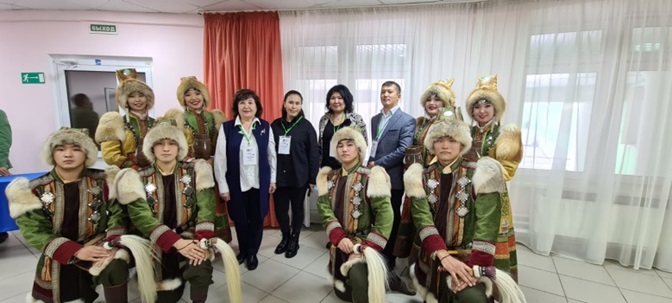
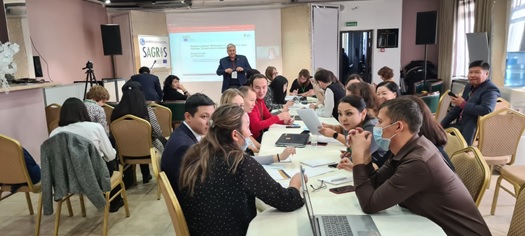
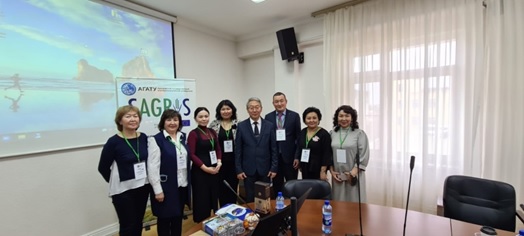
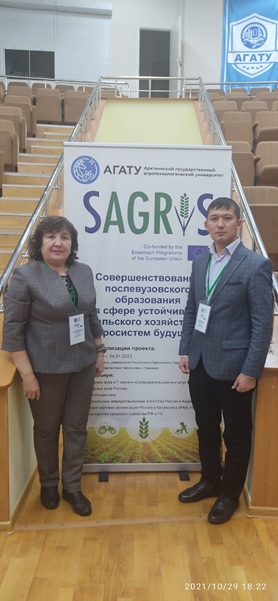
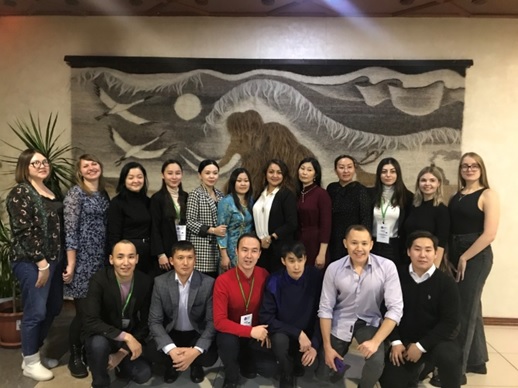
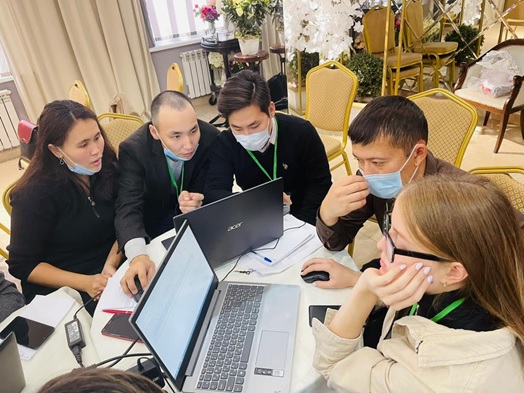

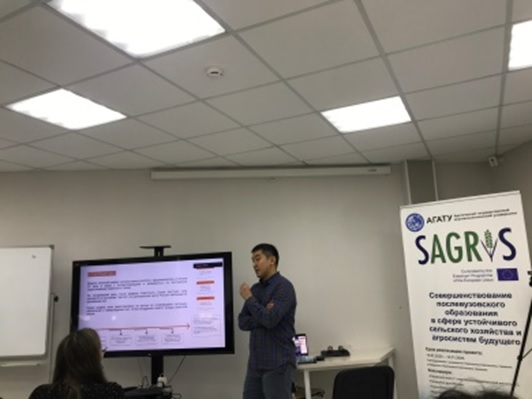
Within the framework of SAGRIS project “Improving postgraduate education in the field of sustainable agriculture and agrosystems of the future” with the support of the European Union program "Erasmus + from the period of June 21 till July 01, 2022, the Head of the Department of Electrical Equipment Operation Sarsikeev E.Zh. and the 1st year doctoral student Amir E.K. studied the German experience in the digitalization of agriculture at Nuertingen-Geislingen University.
Representatives of S. Seifullin KATU participated in the development of the "Smart Agriculture and Digitalization" module, which consists of blocks: Resource-saving approaches for sustainable agriculture; Digital technologies in agriculture and "smart farming" techniques; Agricultural information management systems; Precision agriculture; Agricultural automation and robotics.
It was planned in the program of work on the basis of the German partner university: the development and testing of lectures, visits to advanced farms that use digital technologies in the field of crop production, animal husbandry, food processing and fodder production, participation in a two-day seminar of the DiWenkLa project, a visit to the University of Hohenheim which takes the 1st among German agricultural universities, meeting with lecturers and visiting experimental sites.
In addition to S. Seifullin KATU, representatives of 3 Kazakhstani universities participated at this event: Kazakh National Agrarian Research University, Zhangir Khan West Kazakhstan Agrarian Technical University and A. Baitursynov Kostanay Regional University.
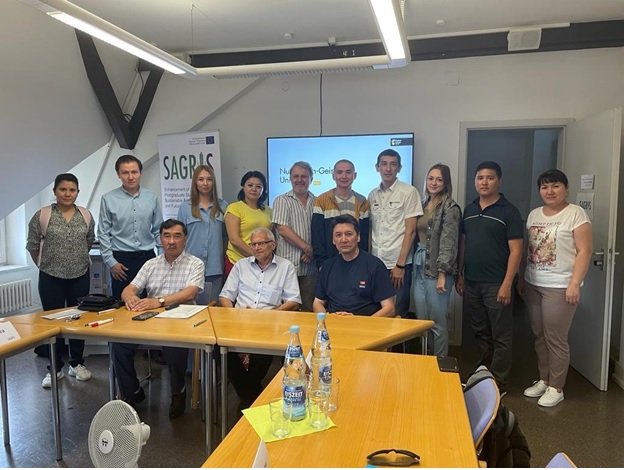
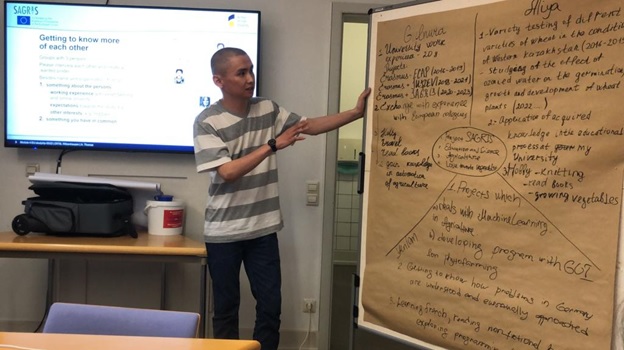
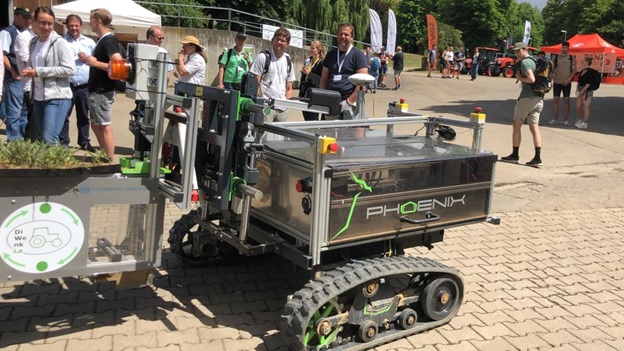
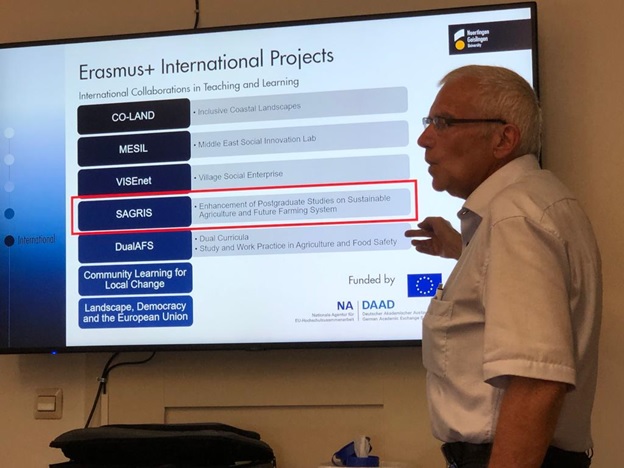
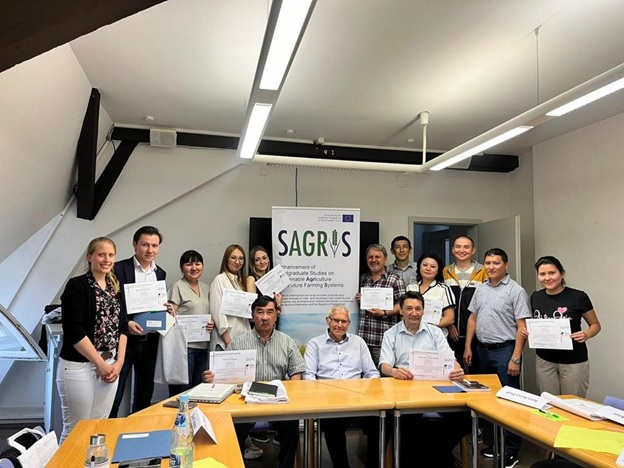
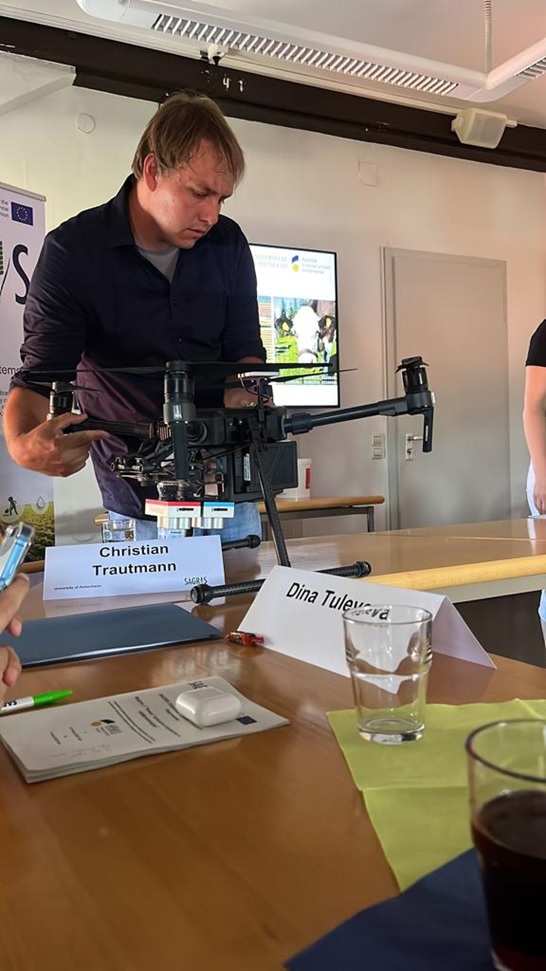
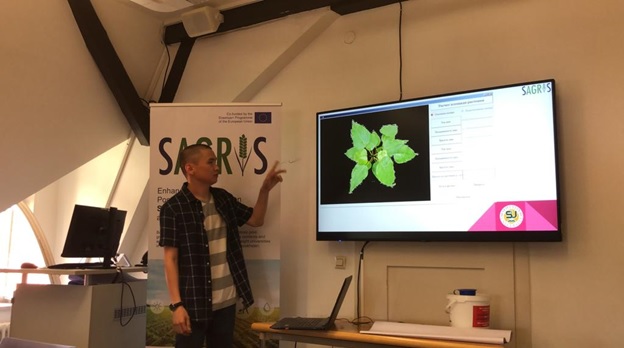
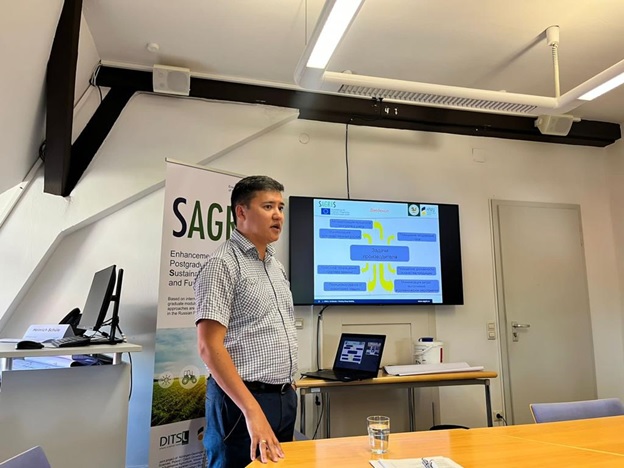
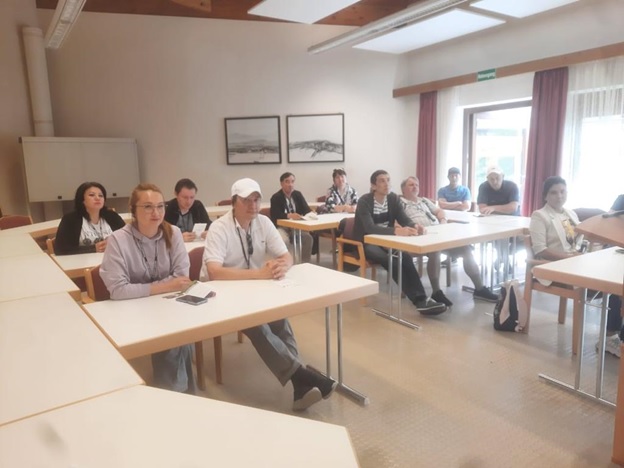
Zhangir Khan West Kazakhstan Agrarian Technical University was held from June 27 to July 2, 2022. 2nd block seminar on the module "Transdisciplinary research methods for sustainable agriculture" , which was attended by members of the consortium from universities in Kazakhstan. S. Seifullin KATU was represented by Ismailova A.S. Kitaybekova S.O. and Meleshenko N.N. and doctoral students Sharapatov T., Kuzbakova M. and Nurlabi A.
The program of the seminar was full. On the first day the welcoming speech were made by A. Nametov, Chairman of the Board - Rector of NAO "West Kazakhstan Agrarian Technical University", Brigitte Kaufmann, Professor, Head of the Module (German Institute of Agriculture in the Tropics and Subtropics, Germany) and I. Bogdashkina, Head of the module (West-Kazakhstan Agrarian-Technical University, Kazakhstan).
The lectures Transdisciplinary Collaborative Research Strategies in Agriculture (Gulnara Yunusova, KRU, Kazakhstan) and European Experience in Transdisciplinary Research (Angelika Thomas, University of Nürtingen-Geislingen, Germany) aroused great interest. The participants of the meeting got acquainted with the results of the research work at Zhangir Khan WKATU, the PPP project “Services for maintenance and deworming, identification, sterilization” was presented and how the project is being implemented to provide fish farmers with fish seed with a visit to the laboratory of ichthyology and aquaculture. About the topics of the lectures given by the developers of the module from A. Baitursynov Kostanay Regional University, German Institute of Agriculture in the Tropics and Subtropics, Witzenhausen, Germany, Kazakh National Research Agrarian University and S. Seifullin Kazakh AgroTechnical University can be found in the program of the block seminar. Interesting was the group work of doctoral students under the guidance of the moderator I. Bogdashkina, it was presented video interviews prepared by doctoral students interview to find problems for research. In general, the goal of the workshop was achieved. Module developers have gained invaluable experience, and doctoral students have gained new knowledge.
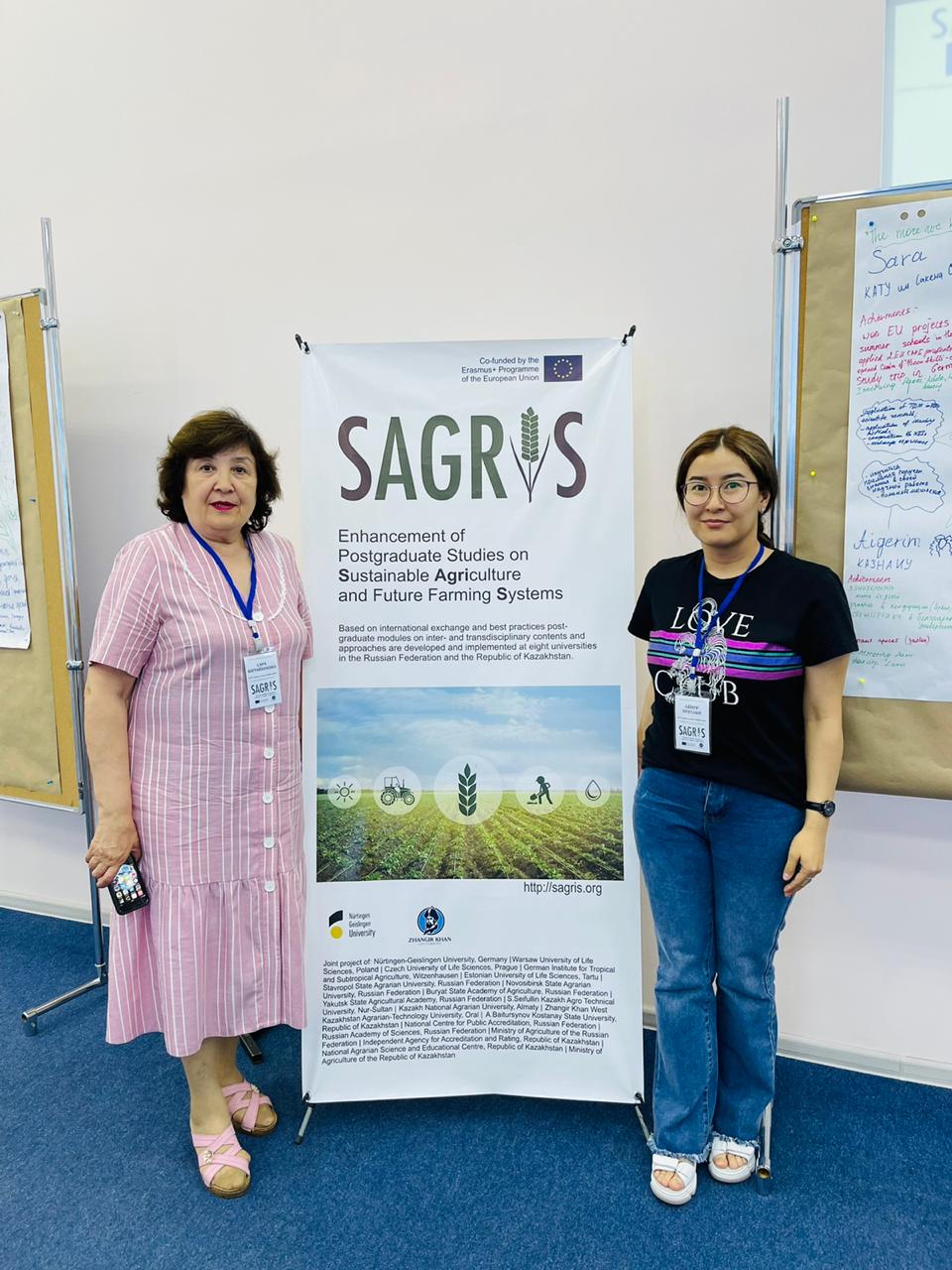
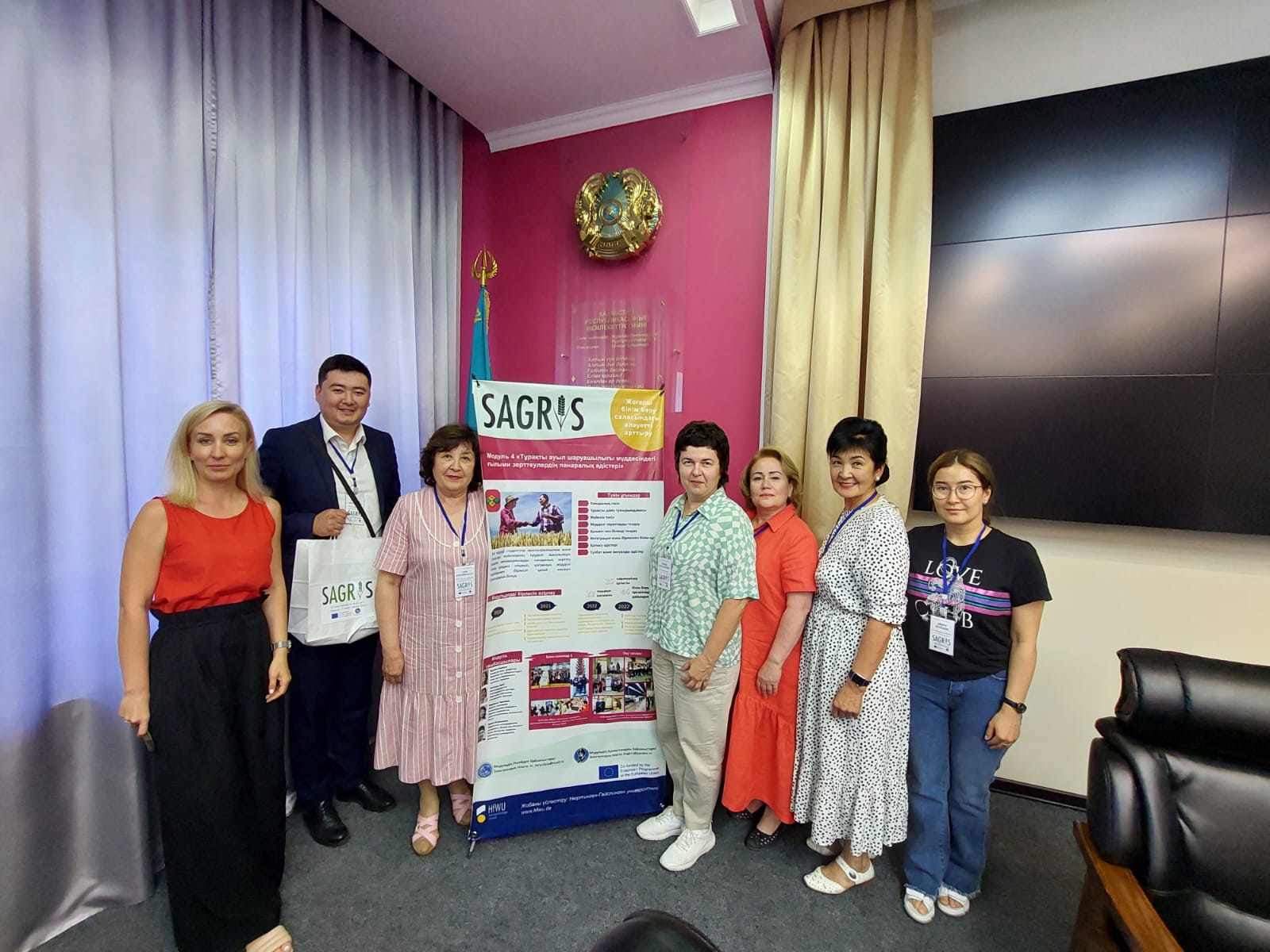
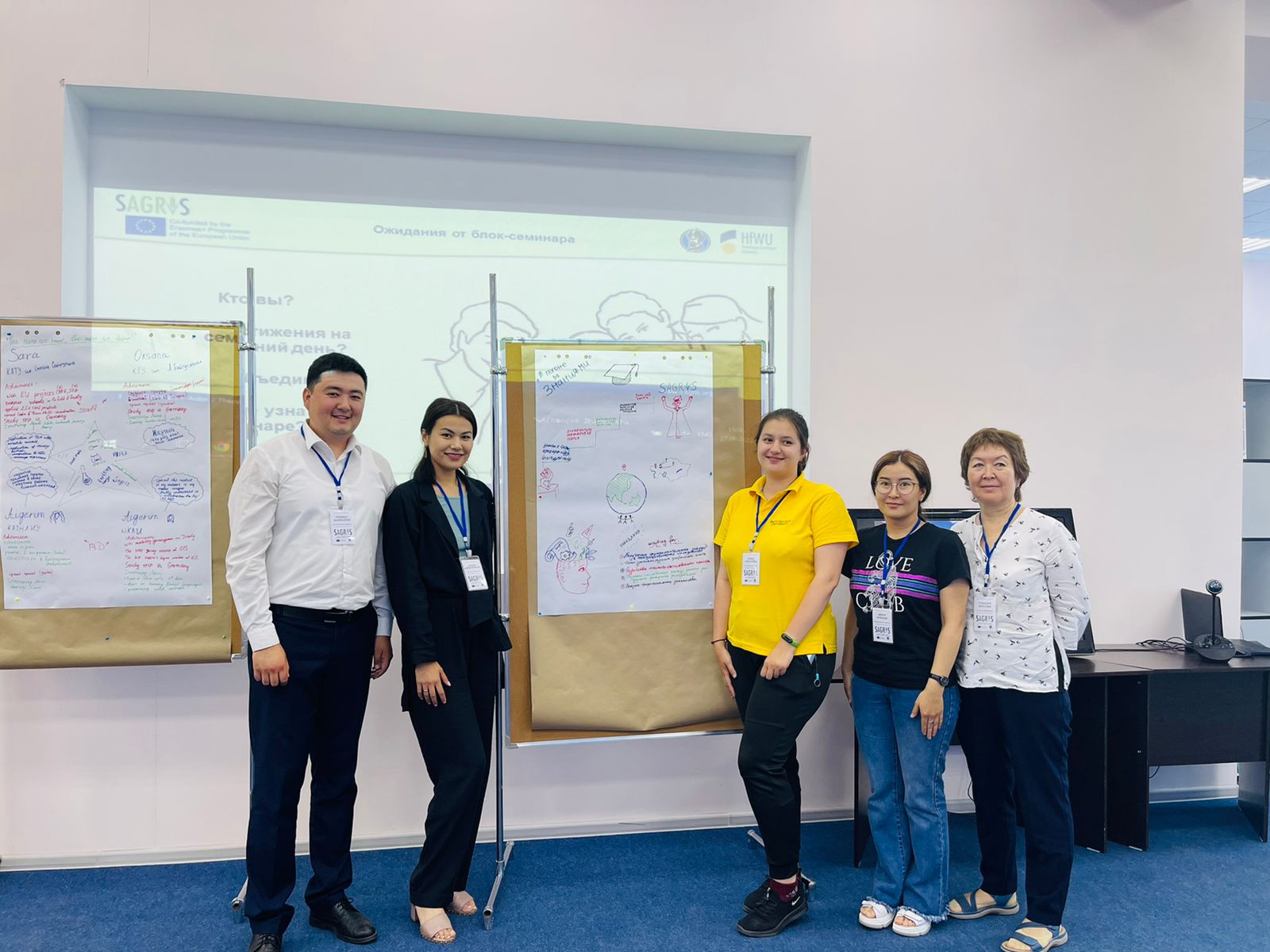
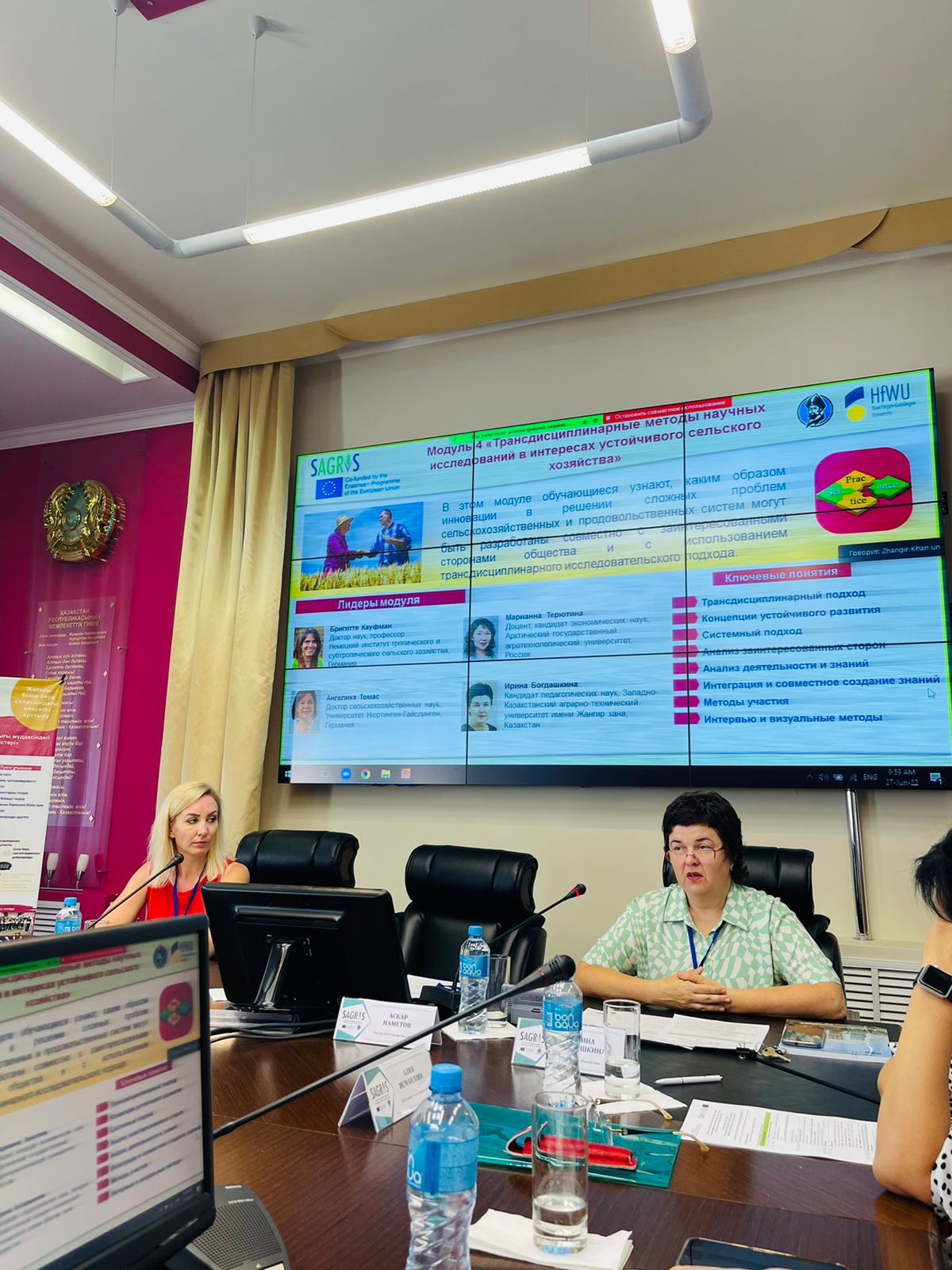
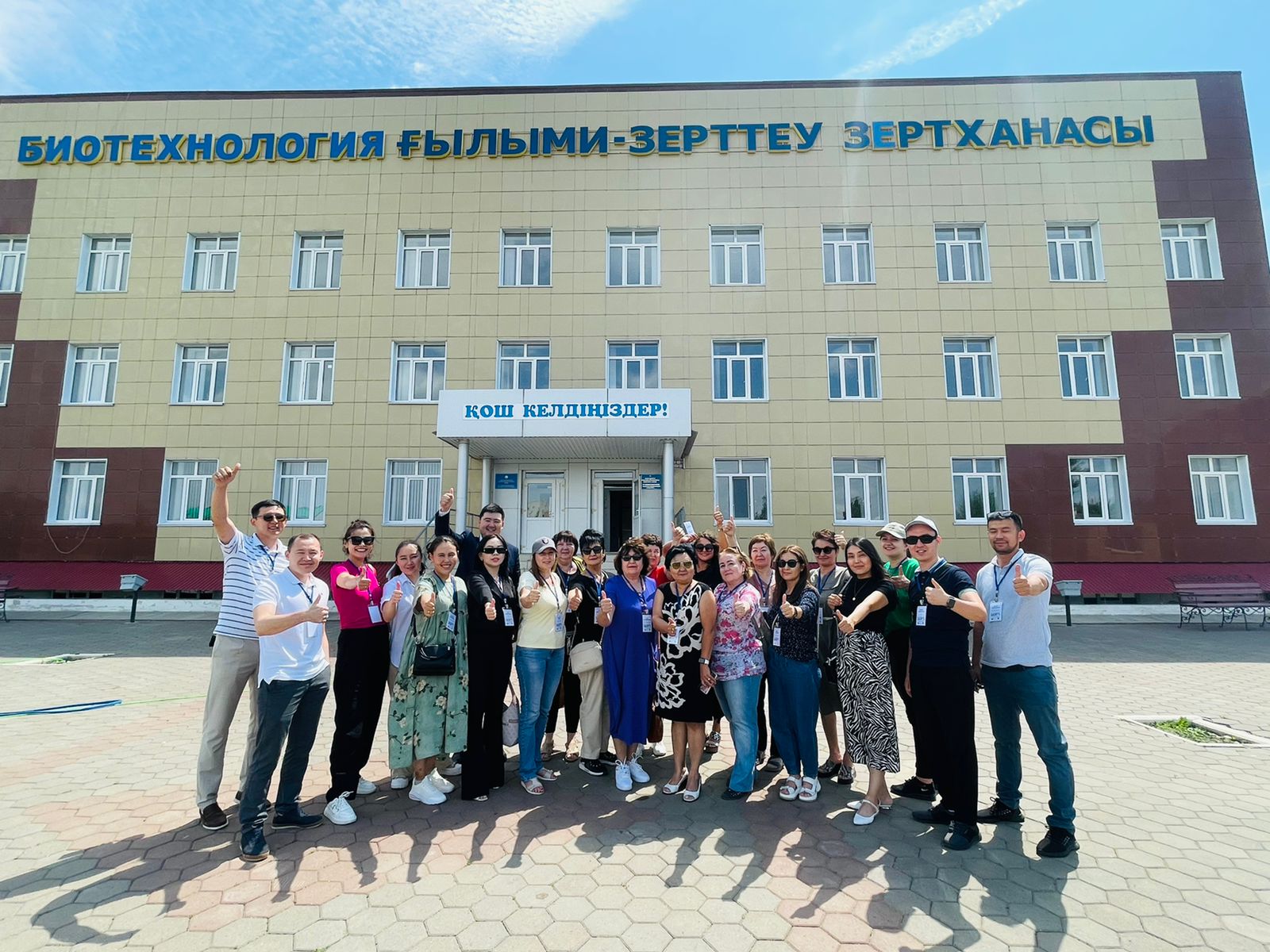
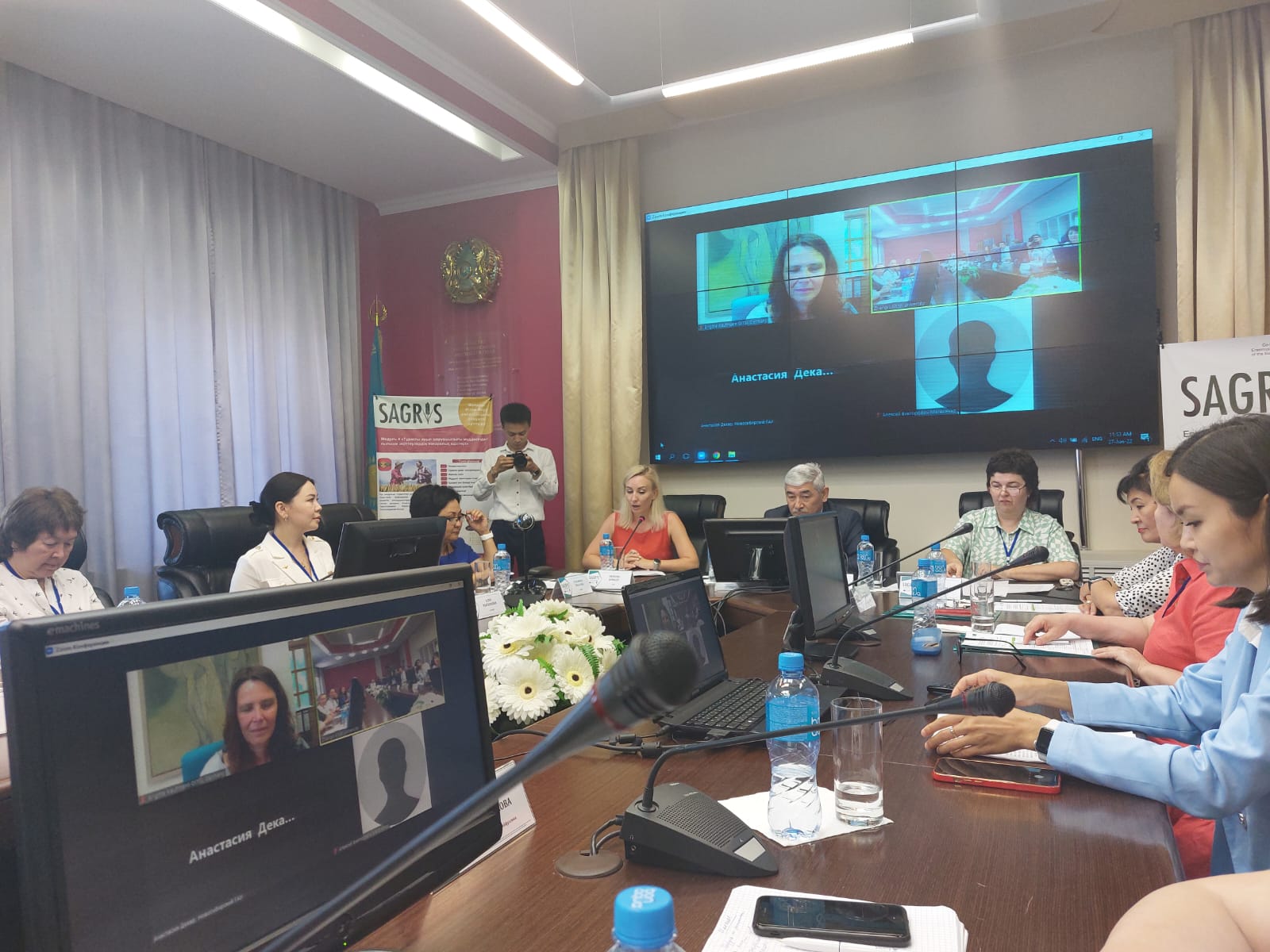
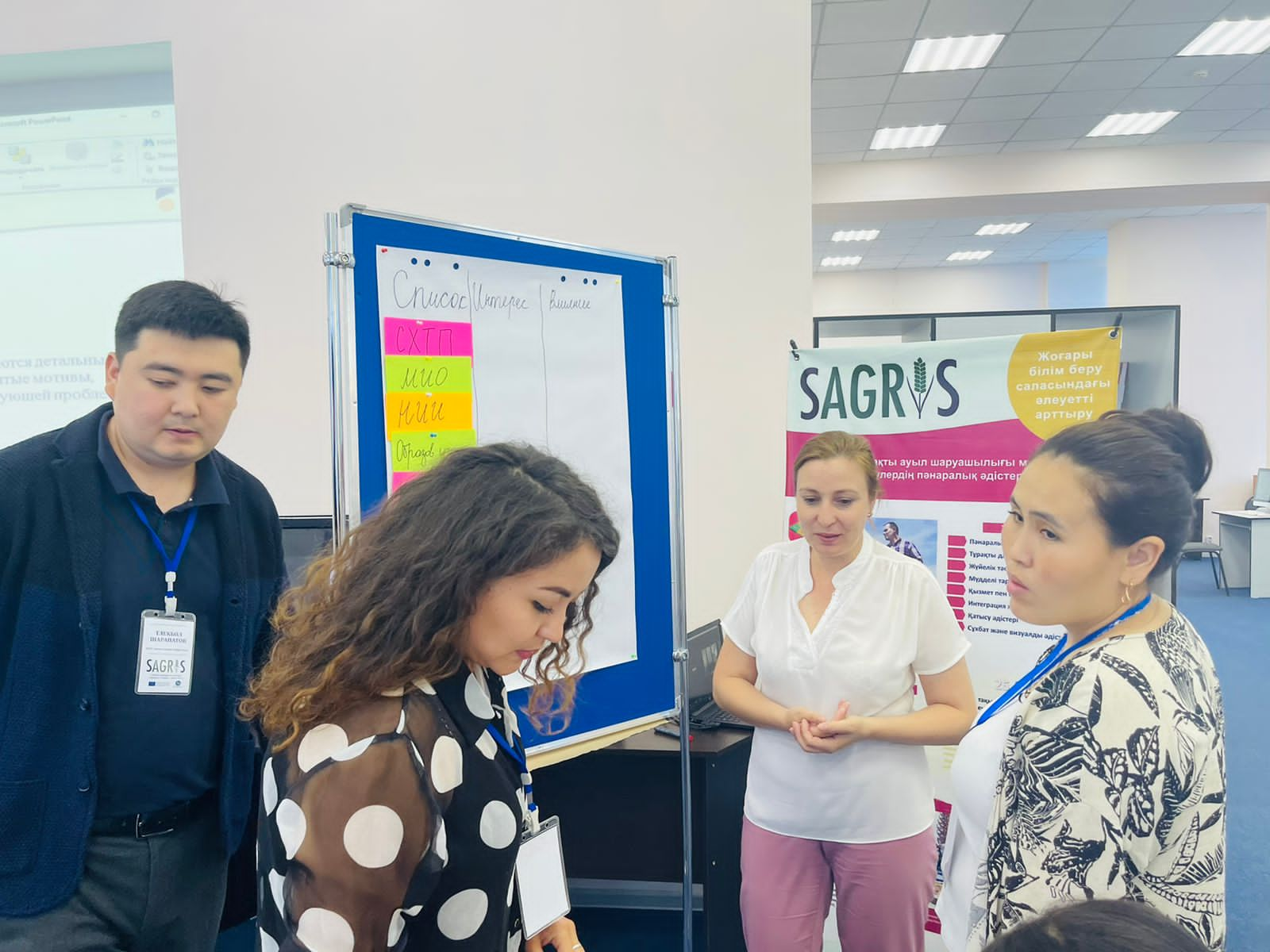
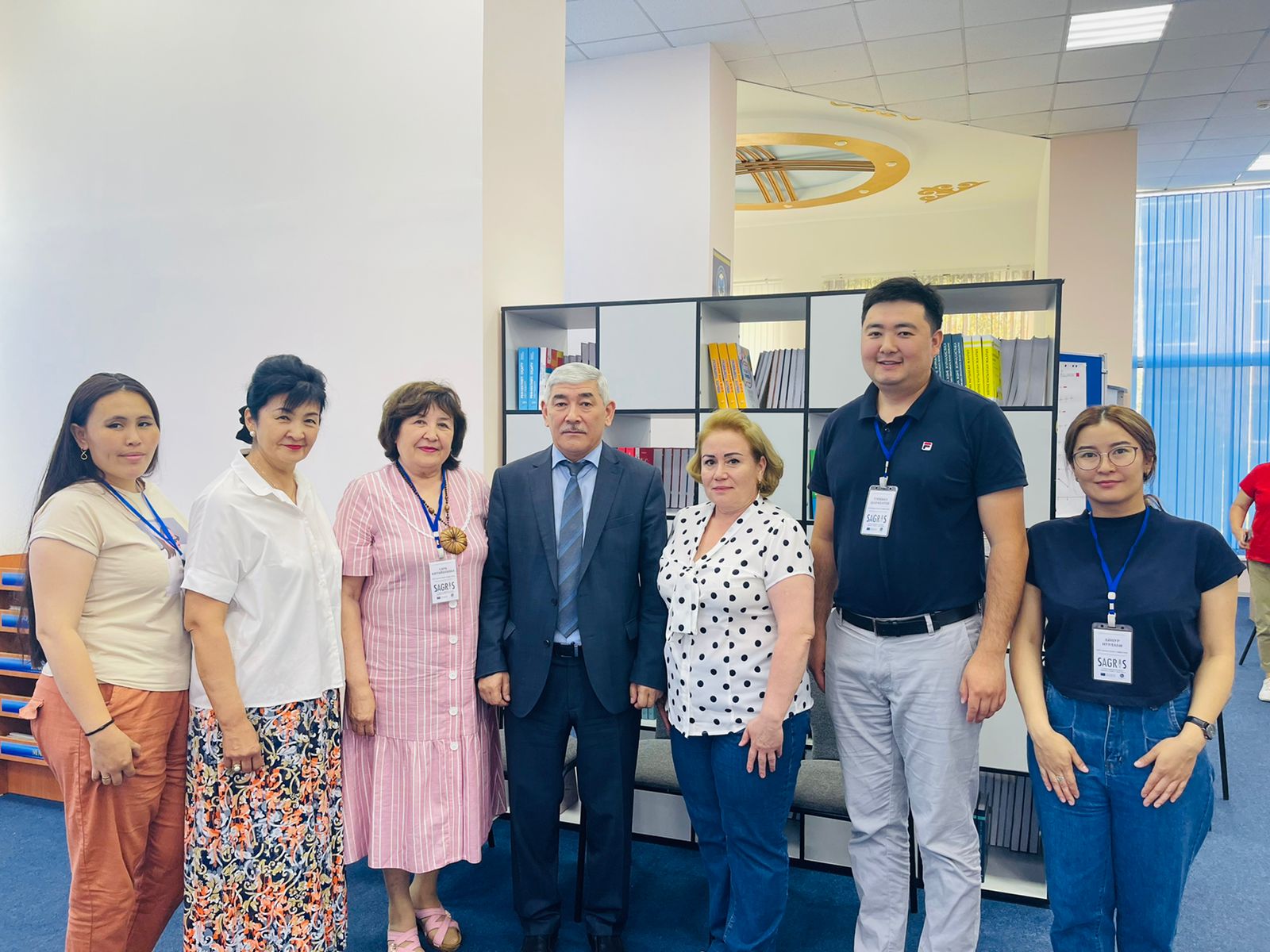
In the period from February 28 to March 4, 2022, the second block-seminar on the first module "Smart Agriculture and Digitalization" of the ERASMUS + 610383-EPP-1-2019-1-DE-EPPKA2-CBHE-JP(2019-2086) project " Enhancement of Postgraduate Studies on Sustainable Agriculture and Future Farming Systems" (SAGRIS).was held at the Novosibirsk State Agrarian University. The welcoming speech were made by the Rector of Novosibirsk State Agrarian University, Professor Evgeny Rudoy, the Chairman of the Board-Rector of the Kazakh National Agrarian Research University: Professor Tlektes Yespolov, the scientific supervisor of the project, Professor, Dr. Heinrich Schüle (University of Nürtingen-Geislingen, Germany), the head of the module, Dr. Vitaly Tikhonovsky (NSAU, RF) and the head of the module from Kazakhstan, Professor, Doctor of Science Kuanysh Zholamanov. There was an excursion to the Sokolovo agricultural enterprise, Novosibirsk Region. Acquaintance with the management of the enterprise was organized, a group assignments (real cases) were received from the specialists of the Sokolovo enterprise in order to make scientifically based effective solutions to the problems facing the enterprise
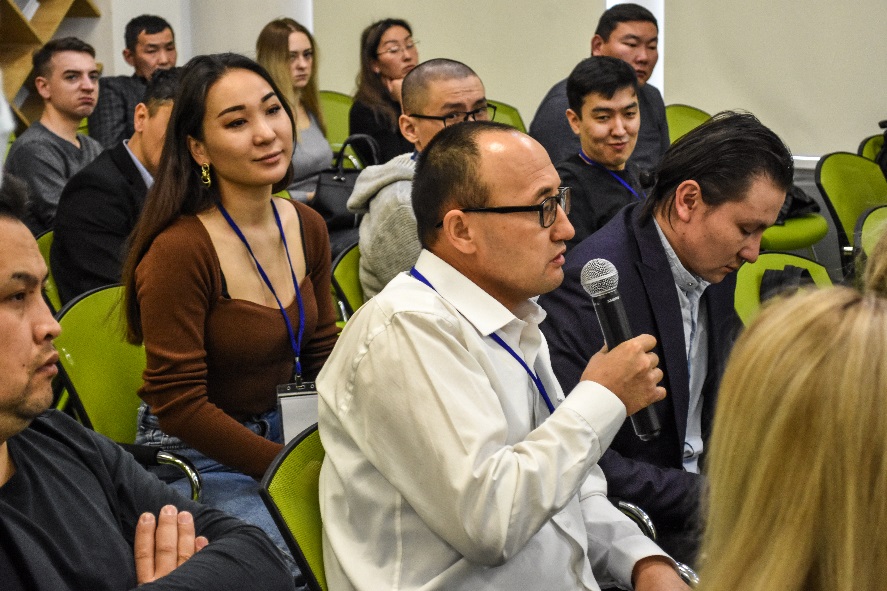
During the block seminar, interesting lectures were given, and I especially liked the master class “Project method as the basis for a comprehensive study of the digitalization task in the agro-industrial complex”, which was conducted by Dr. Galiya Kokieva (Arctic State Agrotechnological University, Russia). Lecture laboratory lesson on the topic "Technological and technical solutions to the problem of differentiated application of mineral fertilizers in the system of precision farming" was given by Associate Professor Kairat Eskhozhin and PhD Arman Rustembaev (Kazakh Agrotechnical University named after S. Seifullin, Kazakhstan). Laboratory work on the topic "Telemetry systems" in the AMAZONE precision farming laboratory. Was demonstrated by Dr. Vitaly Tikhonovsky (Novosibirsk State Agrarian University, Russia).
The third day was intensive, because there was a presentation of group projects developed by graduate students of Russia and doctoral students of Kazakhstan (SMARTagro projects)
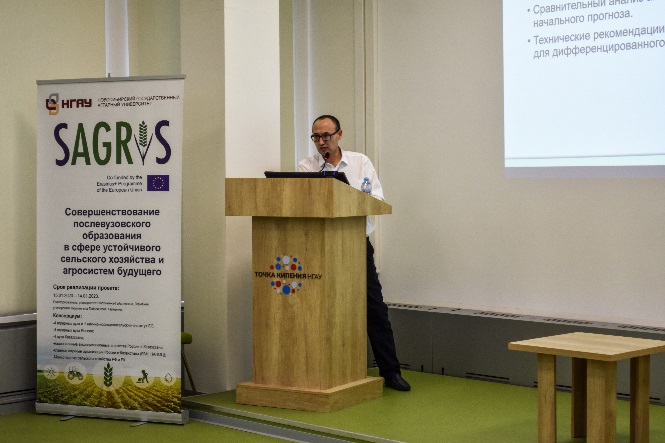
At the final session of the round table, the federal and national programs of Russia and Kazakhstan on digitalization were considered. In particular, the departmental project "Digital Agriculture" in Russia and the program of digitalization of agriculture: E-AIC in Kazakhstan. Teachers and doctoral students took part in the discussion, Vitaly Tikhonovskiy (Novosibirsk State Agrarian University) and Kuanysh Zholamanov (Kazakh National Agrarian Research University, Kazakhstan) acted as moderators.
In general, the block-seminar was not only useful, but also interesting.
On June 6-10 2022, in Kostanay, the 2nd Sagris Block Seminar was held on the topic: Crop and livestock production systems in the face of climate change, in which doctoral students of the S.Seifullin Kazakh Agrotechnical University took an active part together with doctoral students from other universities.
During the block-seminar, the problems of crop and livestock production in the conditions of climate change were discussed, reports of doctoral students of various universities, both Kazakhstani and foreign, were presented on this topic.
The block-seminar also included practical trips to the leading farms of the Kostanay region, doctoral students were given the task to practically develop solutions to problems and report them during the discussion to the heads of enterprises, there was also a round table meeting in which there was an active cooperation between science and production.
Participation in such seminars provides an opportunity to gain theoretical and practical knowledge that allows them to be used both in study and in practice.
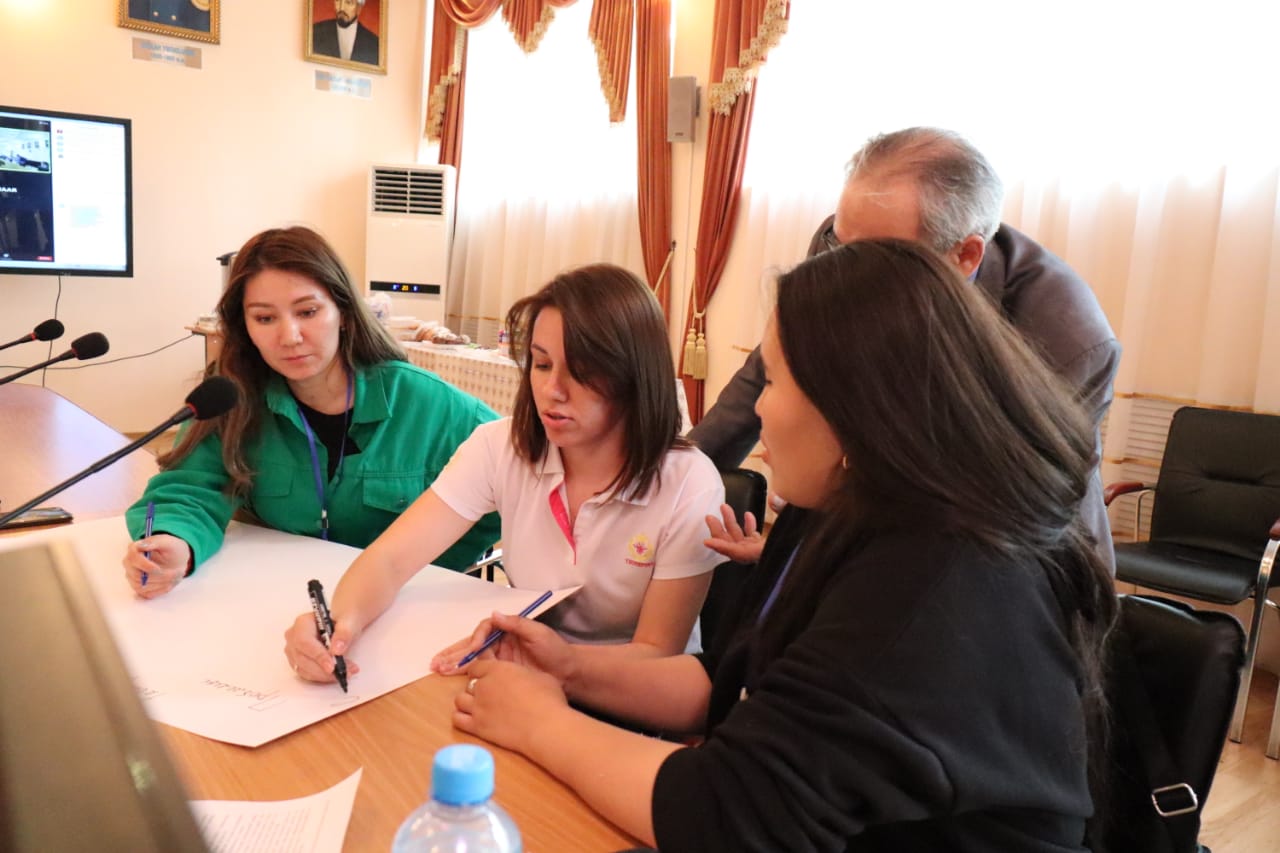
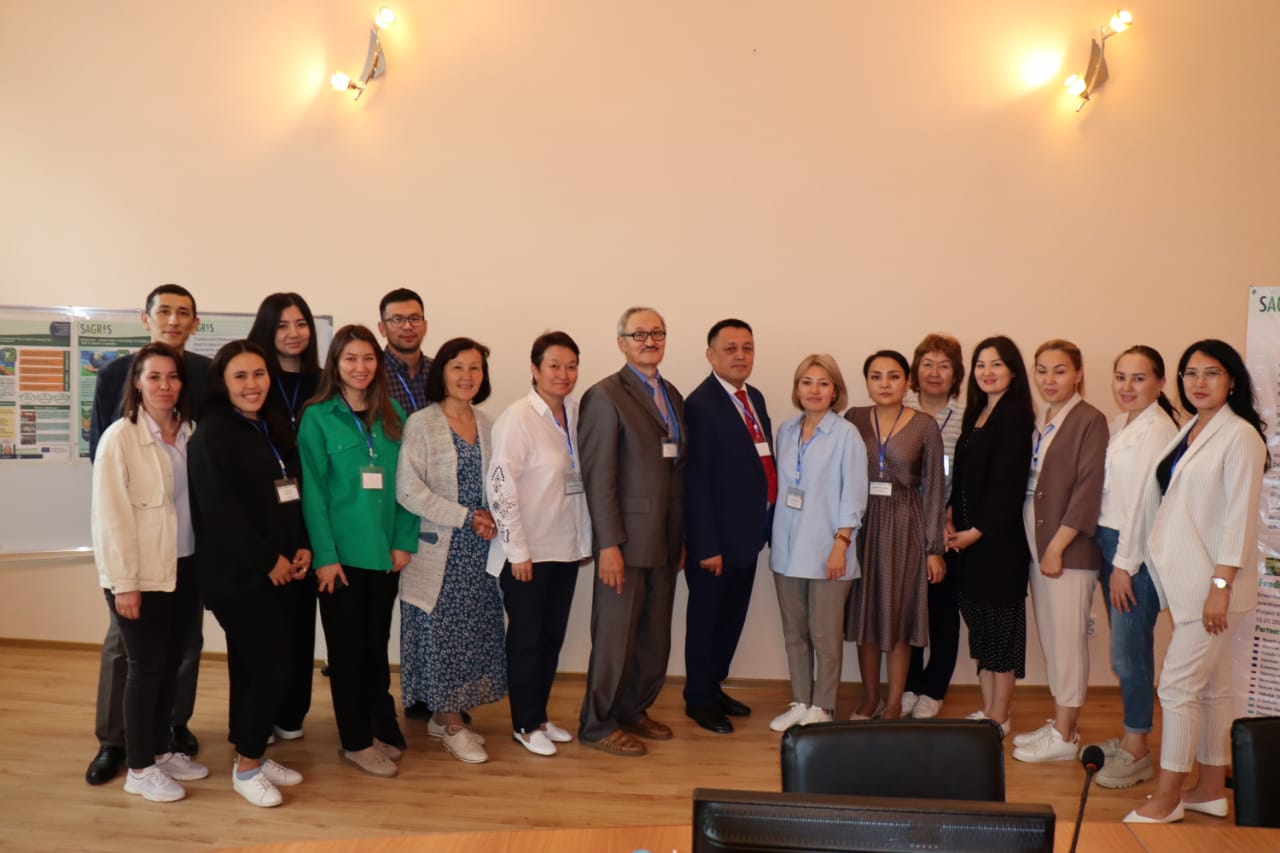
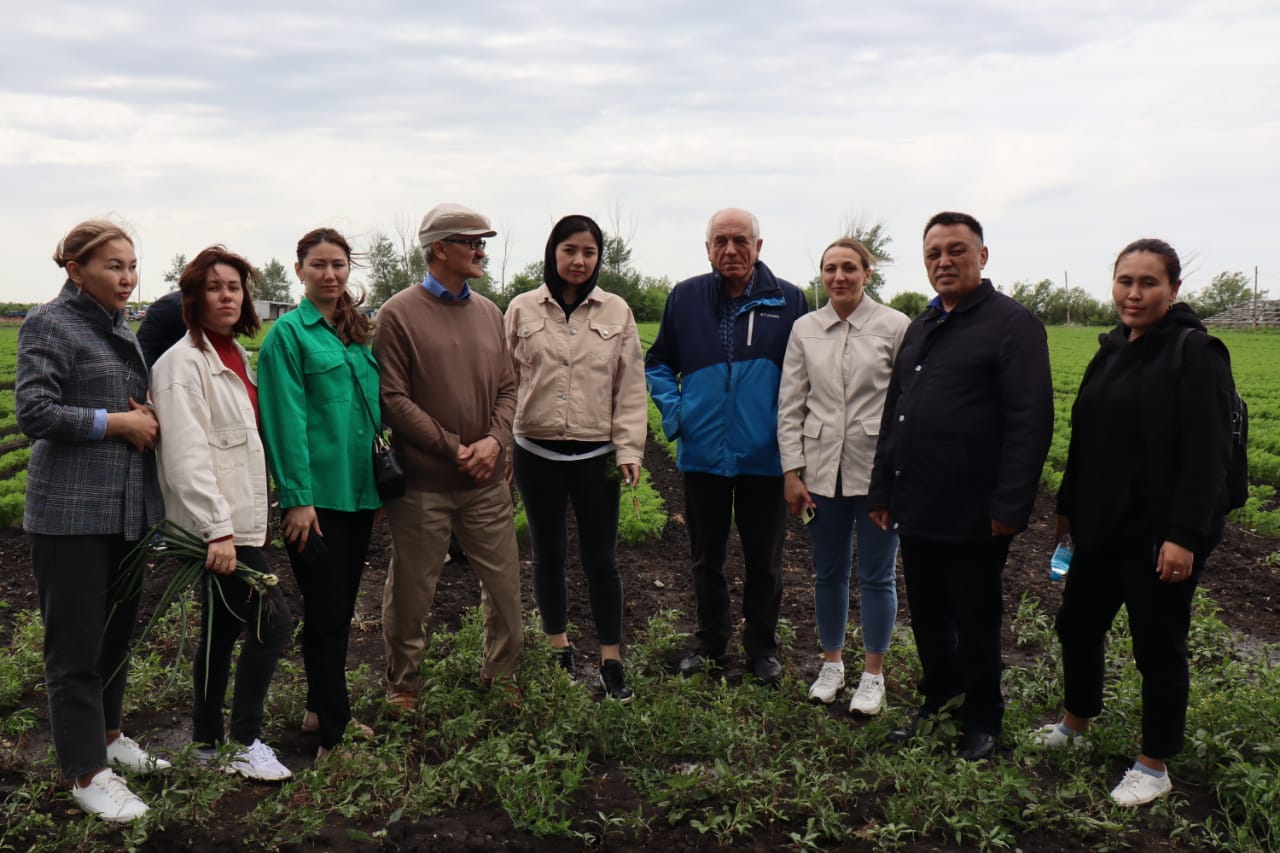
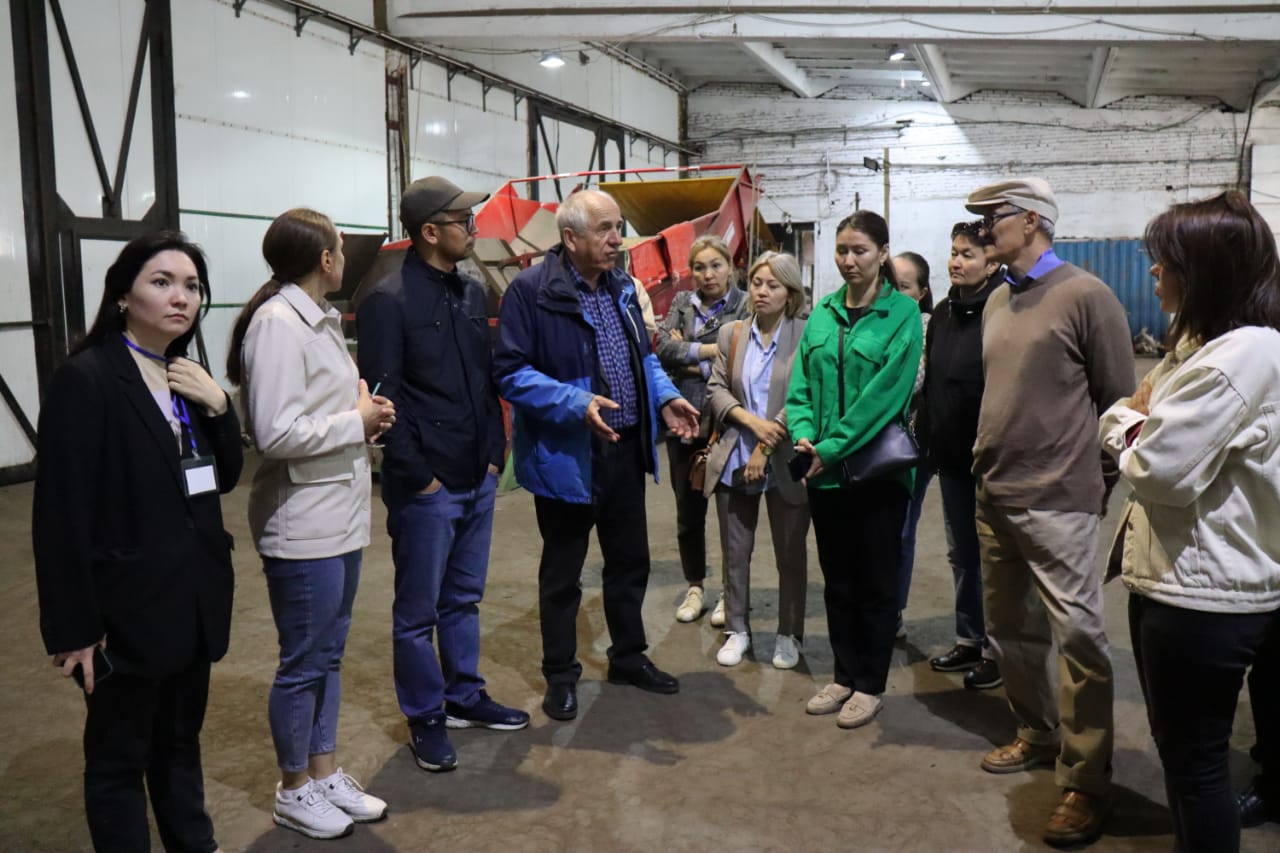
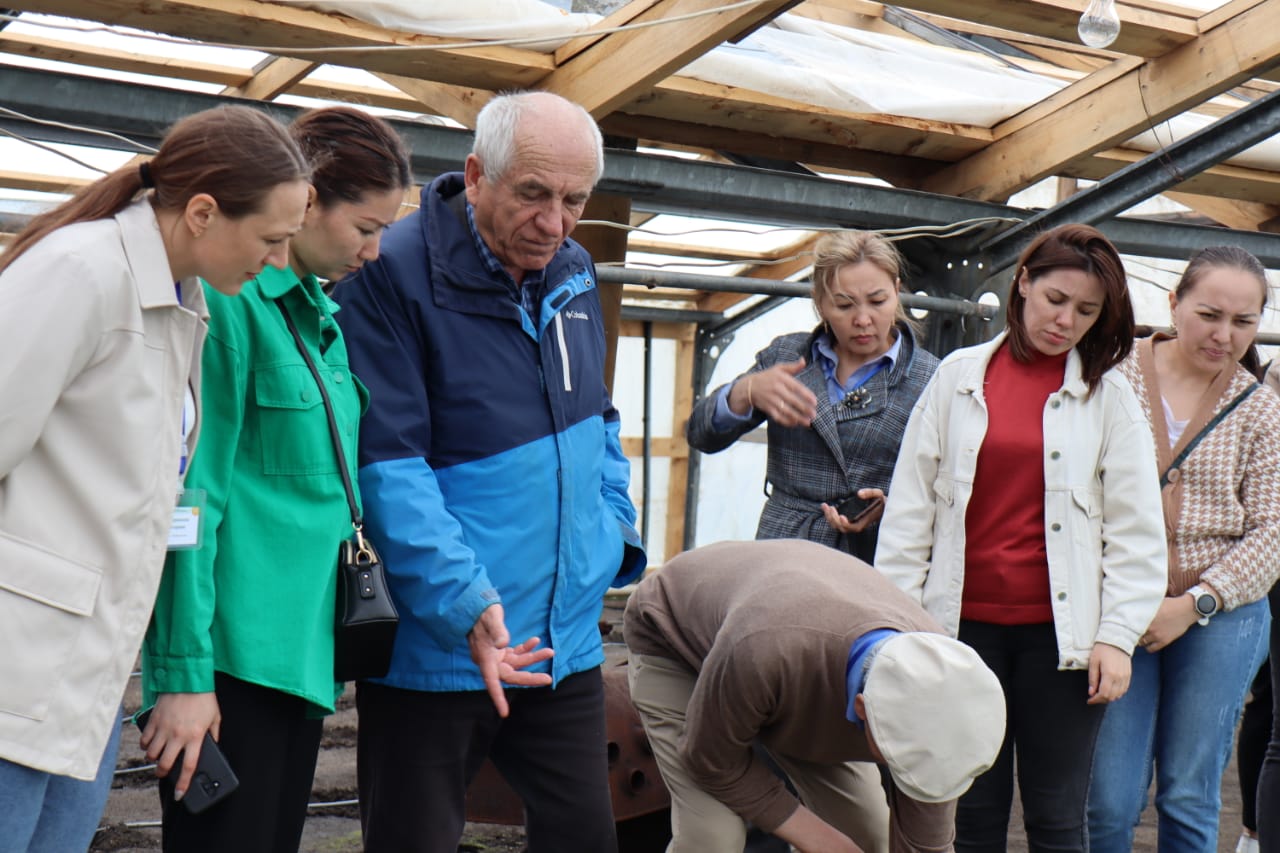
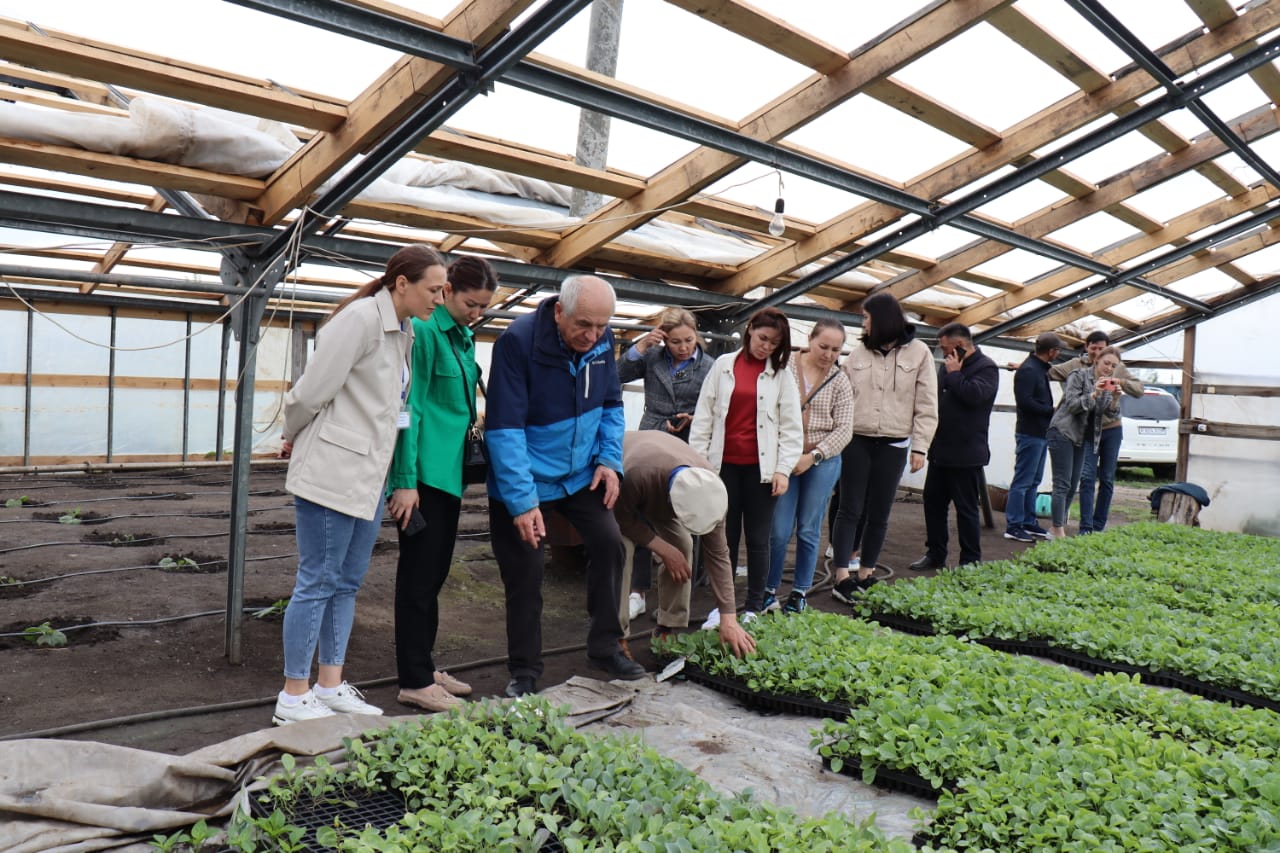
In the period from June 14 to June 18, 2021, a scientific seminar was held at the Kazakh National Research Agrarian University, where teachers and doctoral students from 4 leading agricultural universities of the Republic of Kazakhstan took part, in parallel, postgraduate students, teachers from universities of the Russian Federation met in Novosibirsk State Agrarian University and participated in online format. Informative lectures were given by German, Czech and Polish colleagues and presentations were shown on the topic: “Smart agriculture and digitalization”, the theoretical knowledge gained was reinforced by practical classes. Doctoral students, graduate students from two countries Russia and Kazakhstan made reports, an exchange of views was held in the field of research areas being studied. Within the framework of the seminar, a trip to the experimental field was organized, where the use of digital technologies in the agricultural sector was demonstrated. Leading manufacturers and dealers of agricultural techniques, such as John Deer, Tech-Agro, Eco-Niva Agro-industrial holding, were invited to participate in the seminar. To consolidate the knowledge gained, the participants, doctoral students and postgraduates were divided into working groups, given topics and tasks for defense in the form of presentation works.
During the seminar, the participants received very interesting and informative materials, experience and knowledge for further application in their research work.
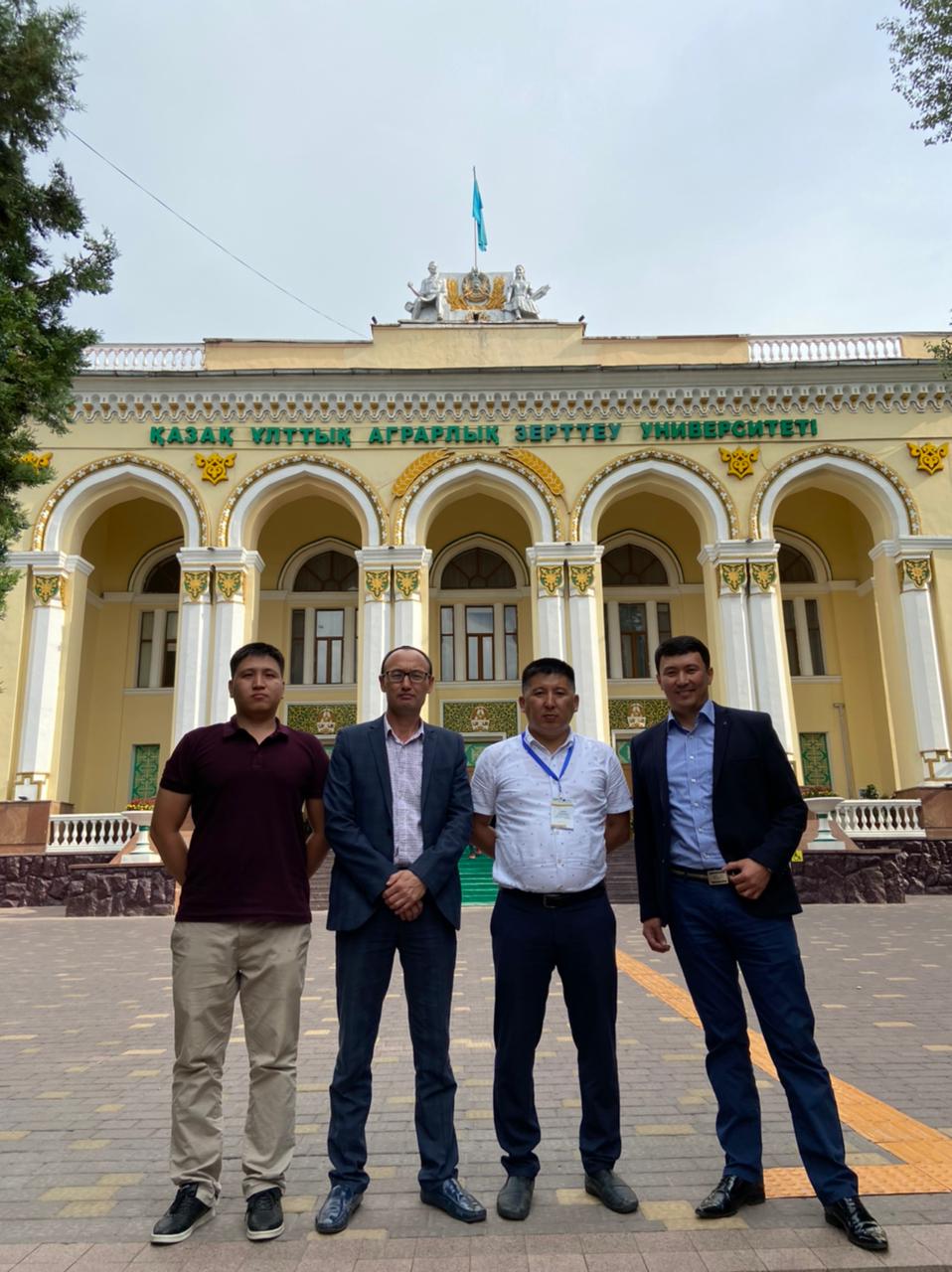
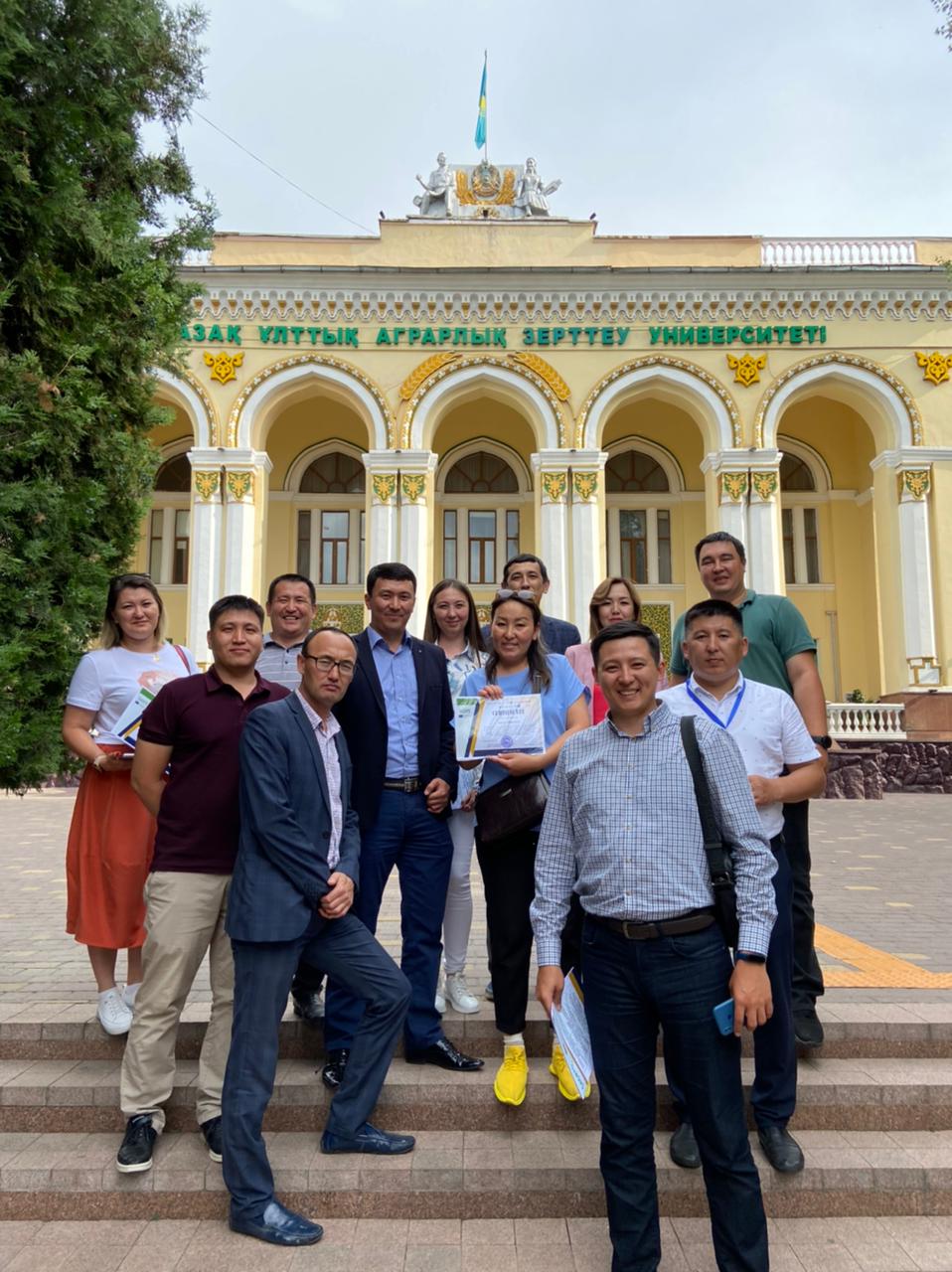
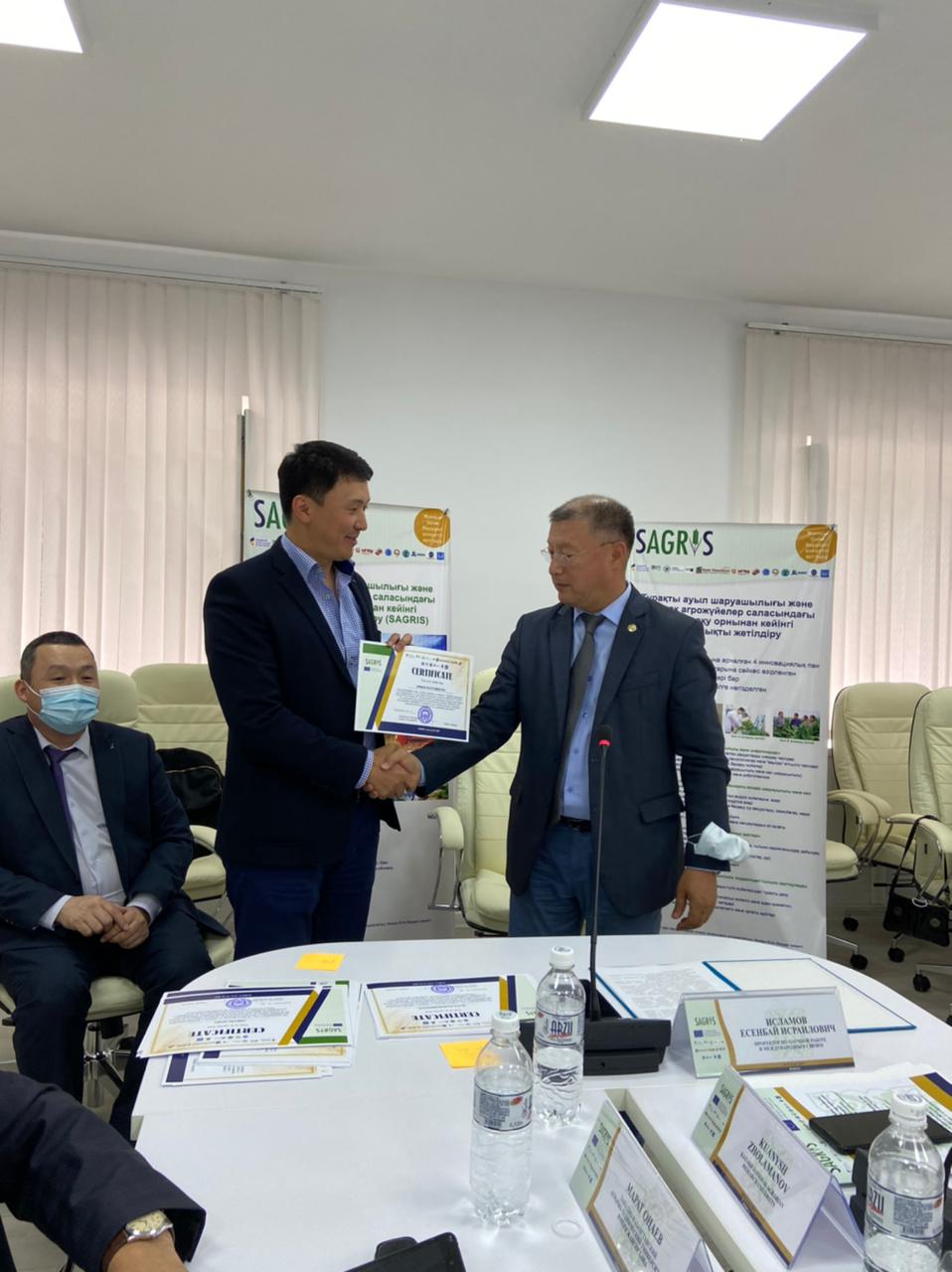
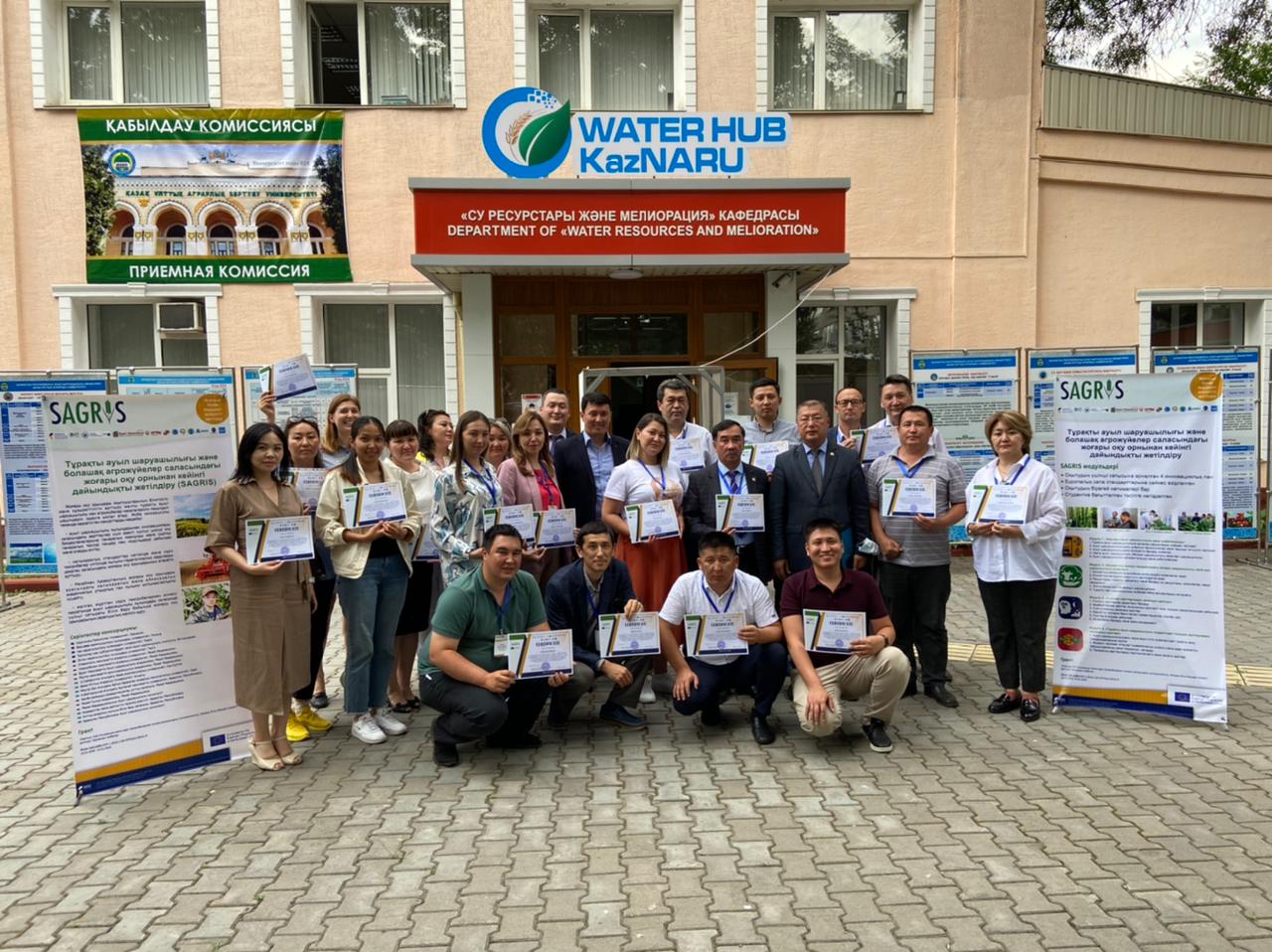
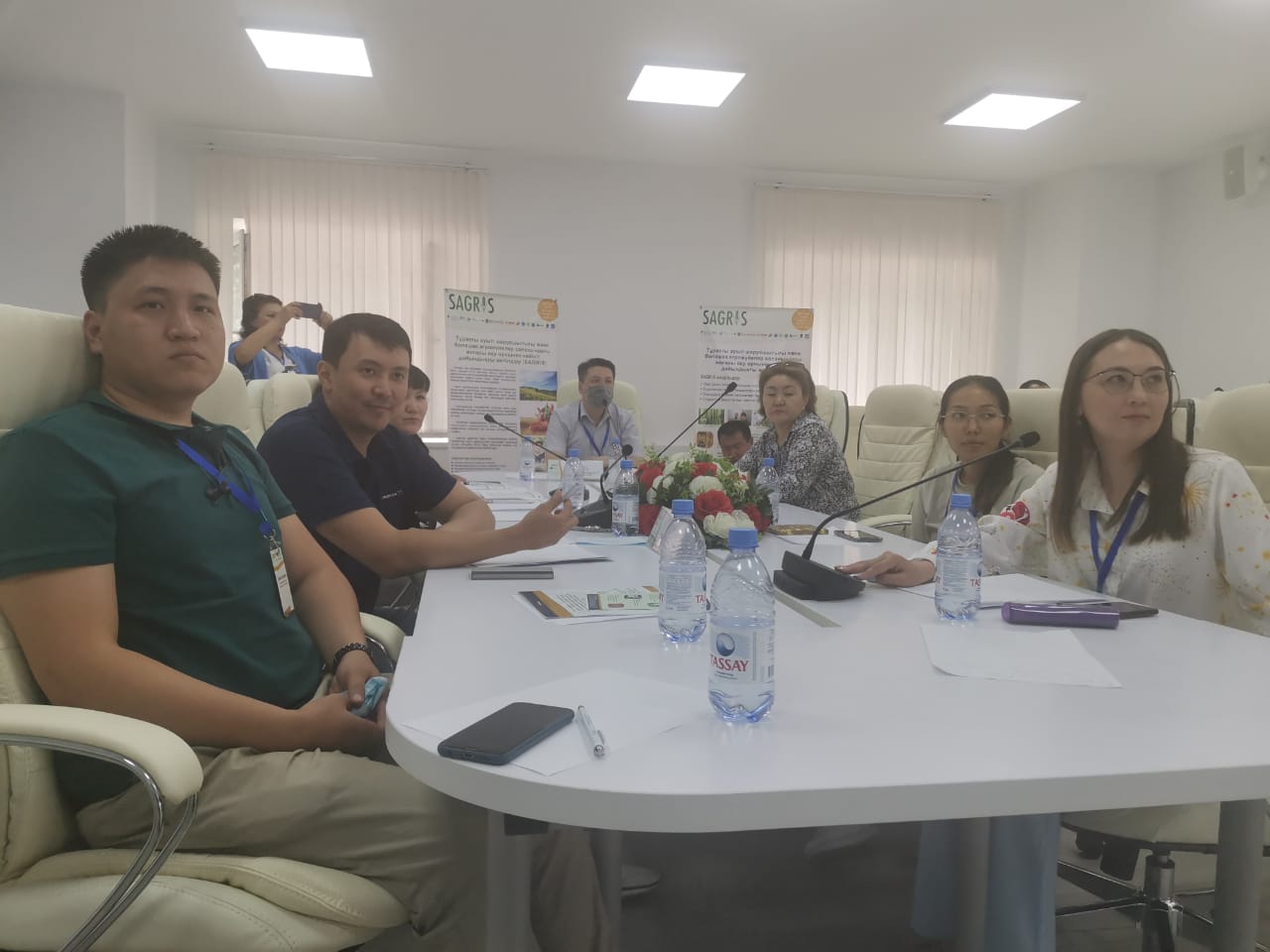
From December 6 to December 10, on the basis of two universities, namely the S. S. Seifullin Kazakh Agrotechnical University and the Stavropol State Agrarian University of Russia, the 1st Block-Seminar on Module 3 "Modern Methods of Scientific Research" was held within the framework of the international project ERASMUS + 610383-EPP-1-2019-DE-EPPRF2-CBHE-JP (2019-2086 ) "“Enhancement of postgraduate studies in the sphere of sustainable agriculture and future farming systems " - SAGRIS”. The block-seminar at KATU was held in a hybrid format (online - Kazakhstani universities-partners of the project and offline - Russian, European (Germany, Poland, Czech Republic).
Welcoming speech were made by:
Vice-Chairman of the Board for Academic Activities-Rector Prof. AbdyrovAitzhanMukhamedzhanovich;
Rector of Stavropol State Agrarian University,Prof, Dr.sc.oec Trukhachev Alexandr Vladimirovich.
Project Manager M.Sc, Anna Borsuk, Nuertingen-Geislingen University, Germany
Module supervisor from European universities
Prof. Dr. Axel Schwerk, Warsaw University of Life Sciences, Poland
During the week-long seminar, a deep immersion in the theory and practice of applying modern methods of scientific research was provided, taking into account the experience of scientists and the achievements of doctoral students from universities in Kazakhstan, Russia, Germany, Czech Republic, Poland. The key report of the Block Seminar «The significance of methods and publishing in scientific work - past, present and future»was made by Prof. Dr. Axel Schwerk (Warsaw University of Life Sciences, Poland).
Within the framework of the Block-seminar, there was a synergy of projects, because the participants of the event were given a lecture by a professor from Dr.Denis Monasse(AgriParisTech) on the topic " Interacting with SQLite Databases in Python ".
The use of modern scientific methods was also presented through the lenses of Completed Science Projects (FCP). Scientists of S. Seifullin KATU (Yermekov F., Jataev S., Isabekova S.), Warsaw University of Natural Sciences (Gawryszewska B.) demonstrated their scientific achievements through the use of various methods of scientific research.
In both universities were organized excursions to scientific laboratories (research platform of agricultural biotechnology, GIS center, laboratory of robotics, etc.).
Presentations of group projects developed by postgraduate students of Russia and doctoral students of Kazakhstan caused an active and constructive discussion among the participants of the Block Seminar.
The part of the seminar turned out to be interesting and productive, presented by master classes on the principles of writing a scientific publication, on the peculiarities of presenting statistics in scientific publications, choosing a journal, scientometric databases and scientific citation tools, in which scientists from Russian universities took an active part (Prof. Dubovsky I. ., Petukhova M., NSAU), Kazakhstan (OrazymbetovaZh. Expert manager of the information and bibliographic office of the Nazarbayev University library) and the Czech Republic (Minotti B., Czech University of Natural Sciences, Prague).
On the last day of the Block Seminar, an international forum "Prospects of postgraduate education in agricultural universities of Russia and Kazakhstan on the way to integration into the international scientific community" took place. The participants of this event were representatives of the SAGRIS Project Consortium from 5 partner universities of the European Union, as well as 4 Russian and 4 Kazakhstani universities with consulting and expert support from accreditation agencies, research organizations and businesses in Russia and Kazakhstan.
The program of the international forum included a plenary session rich in the search for solutions and the development of proposals for improving the quality of education at the level of doctoral studies in the agricultural direction, positive examples, discussion of challenges and prospects of education in the third cycle. Head of Science Department of NASEC RK Satenbaev E. made a keynote speech "Agricultural science in the implementation of the national development policy of the agro-industrial complex of the Republic of Kazakhstan until 2025".
The head of the scientific part of NGAU Riumkin S. devoted his speech to the possibilities and prospects of training scientific and pedagogical personnel in Novosibirsk State Agrarian University. The external assessment of the quality of education for the training of personnel in the agricultural sector was thoroughly presented by the head of the information and analytical project of the NAAR RK Kydyrmina N. and Deputy. Director of the National Accreditation Center of the Russian Federation G. Motova, who, in turn, focused on improving the competitiveness of educational programs in agricultural universities. Professor of the Czech University of Life Sciences M. Sedmikova reported on the organization and support of PhD studies.
In the second half of the forum, impulse speeches of doctoral students of the Republic of Kazakhstan and the Russian Federation took place on the topic "Challenges on the professional path of a young scientist, prospects for education in the third cycle." These speeches set the tone for the panel discussion, which was moderated by Victor Joseph, «TurlyunAgrarConsult» ", who has experience in postgraduate studies in the Russian Federation and PhD in Germany. The key questions of the panel discussion were:
The panel discussion participants were:
prof. Dr. Michal Loshtak, Czech University of Life Sciences, Prague, Doctor of Agricultural Sciences, Prof .;
Viktor Dridiger, head of the scientific direction of the Federal State Budgetary Scientific Institution "North Caucasian Federal Scientific Agrarian Center";
Candidate of Technical Sciences, PhD AselImasheva, Deputy Director of the Department for Academic Affairs, S. SeifullinKazakh Agro Technical University;
Prof. doctor of the agricultural sciences NurlanSerekpaev, Chairman of the Board of LLP A. Barayev Scientific Centre of Crop Production ";
Candidate of the agricultural sciences, Associate Professor Julia Bezgina, Scientific Secretary of the Dissertation Council D220.062.03 of the Stavropol State Agrarian University
Candidate of Economic Sciences, Associate Professor Nadezhda Meleshenko, S. Seifullin KATU.
At the end of the Block Seminar, the coordinators of the SAGRIS project S. Seifullina KATU Ismailova A. and SSAU S. Serikov summed up the results, received highly positive feedback from graduate students and doctoral students and presented certificates on advanced training to all participants of the seminar.
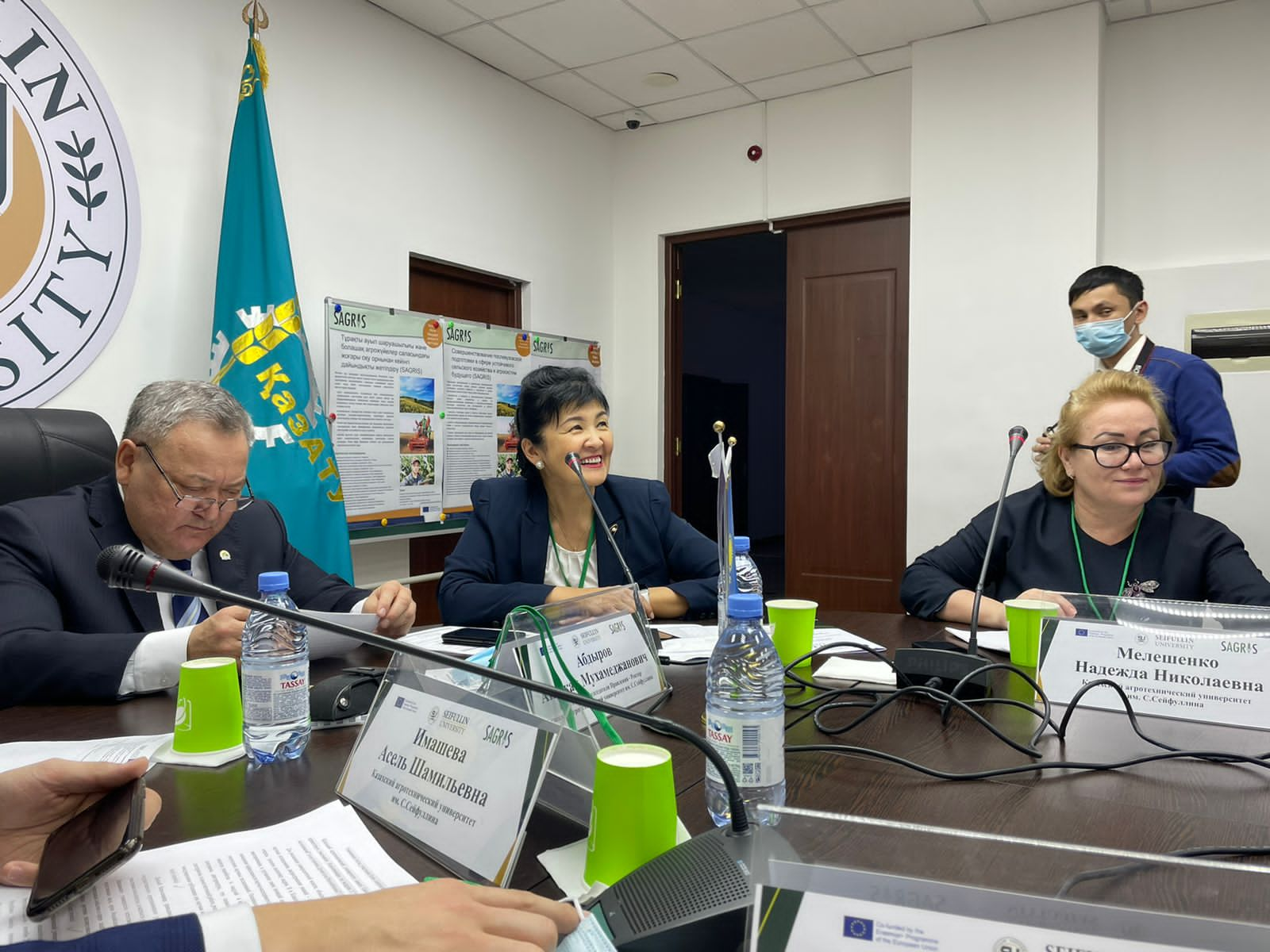
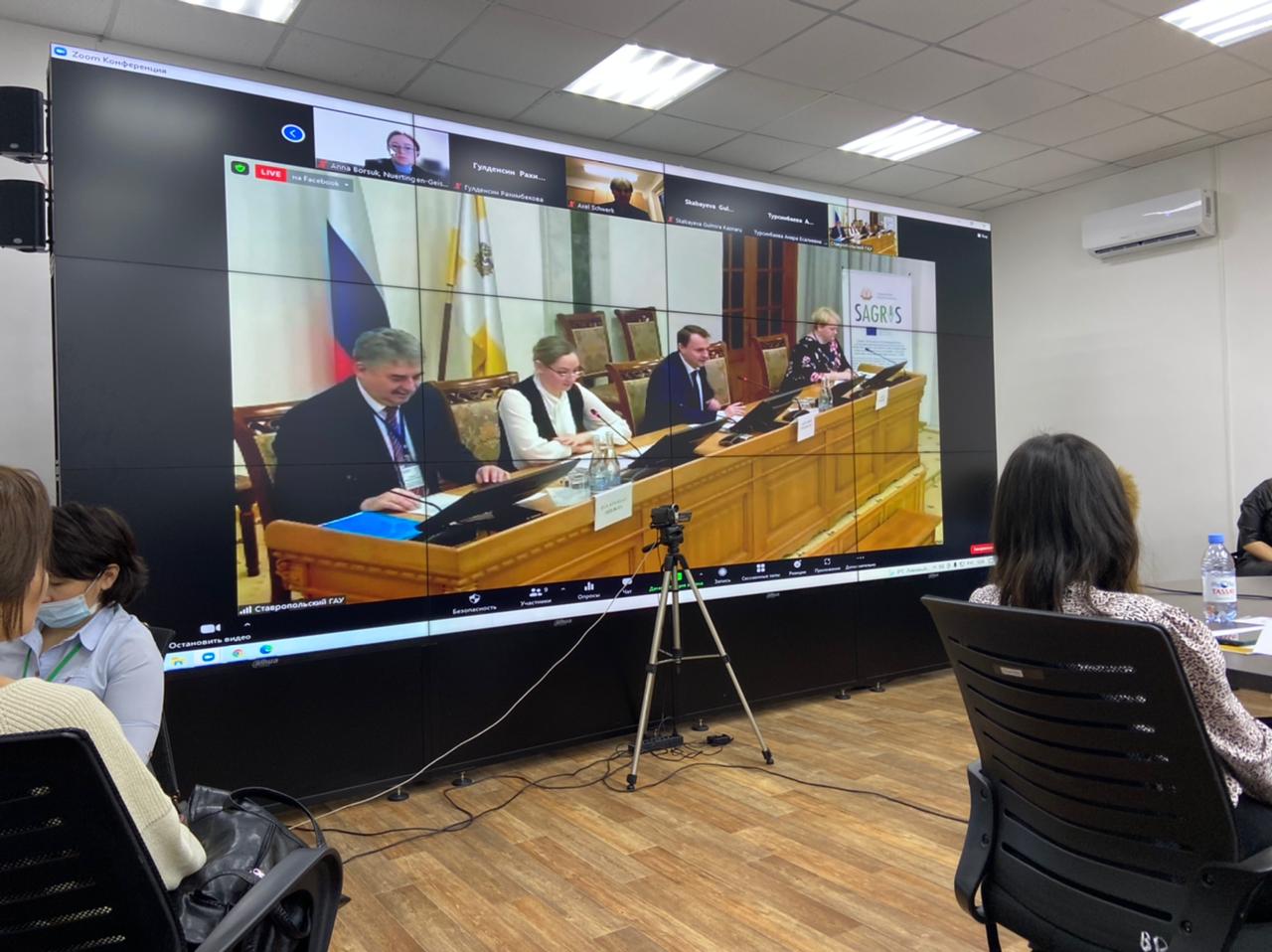
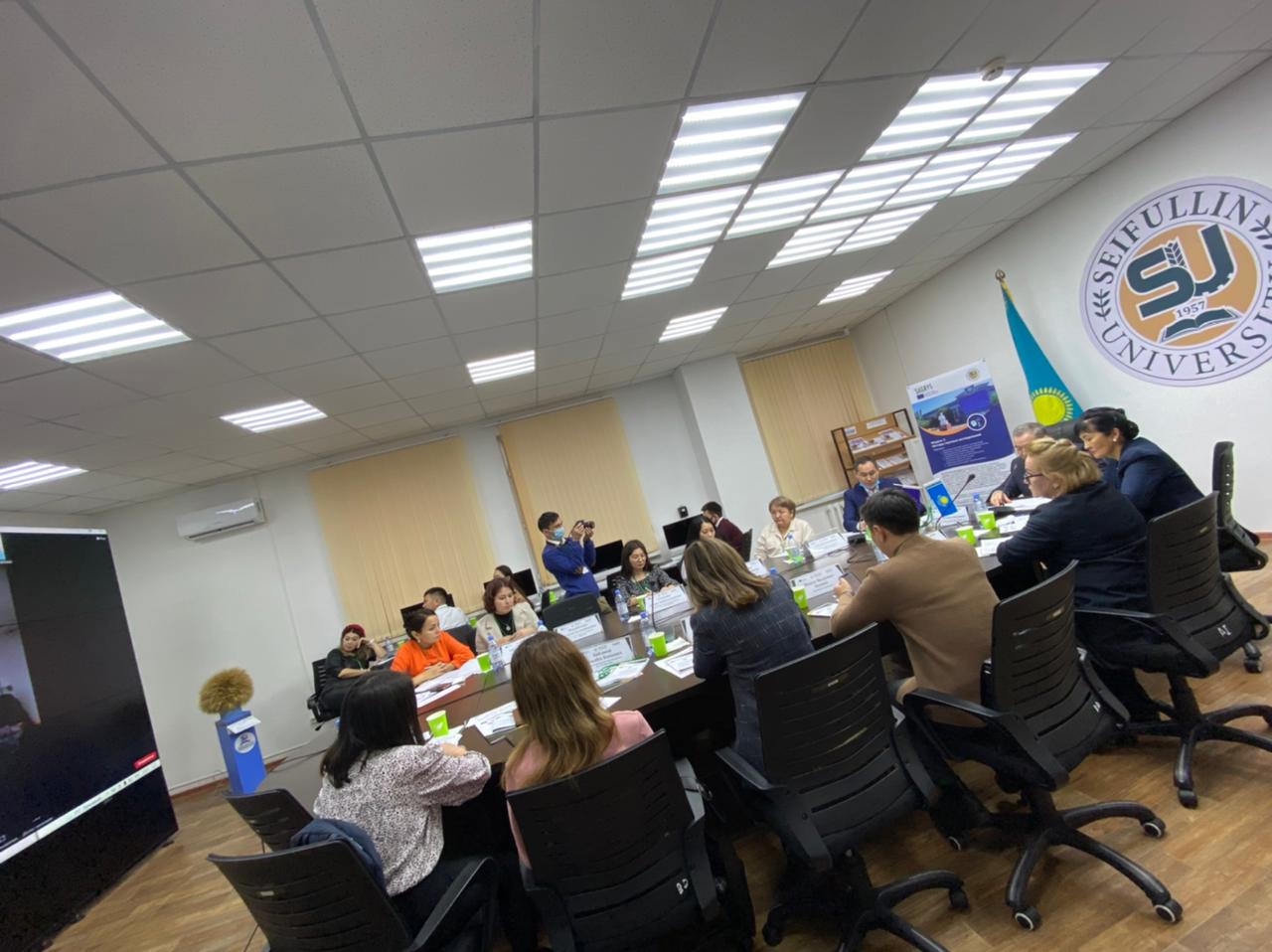
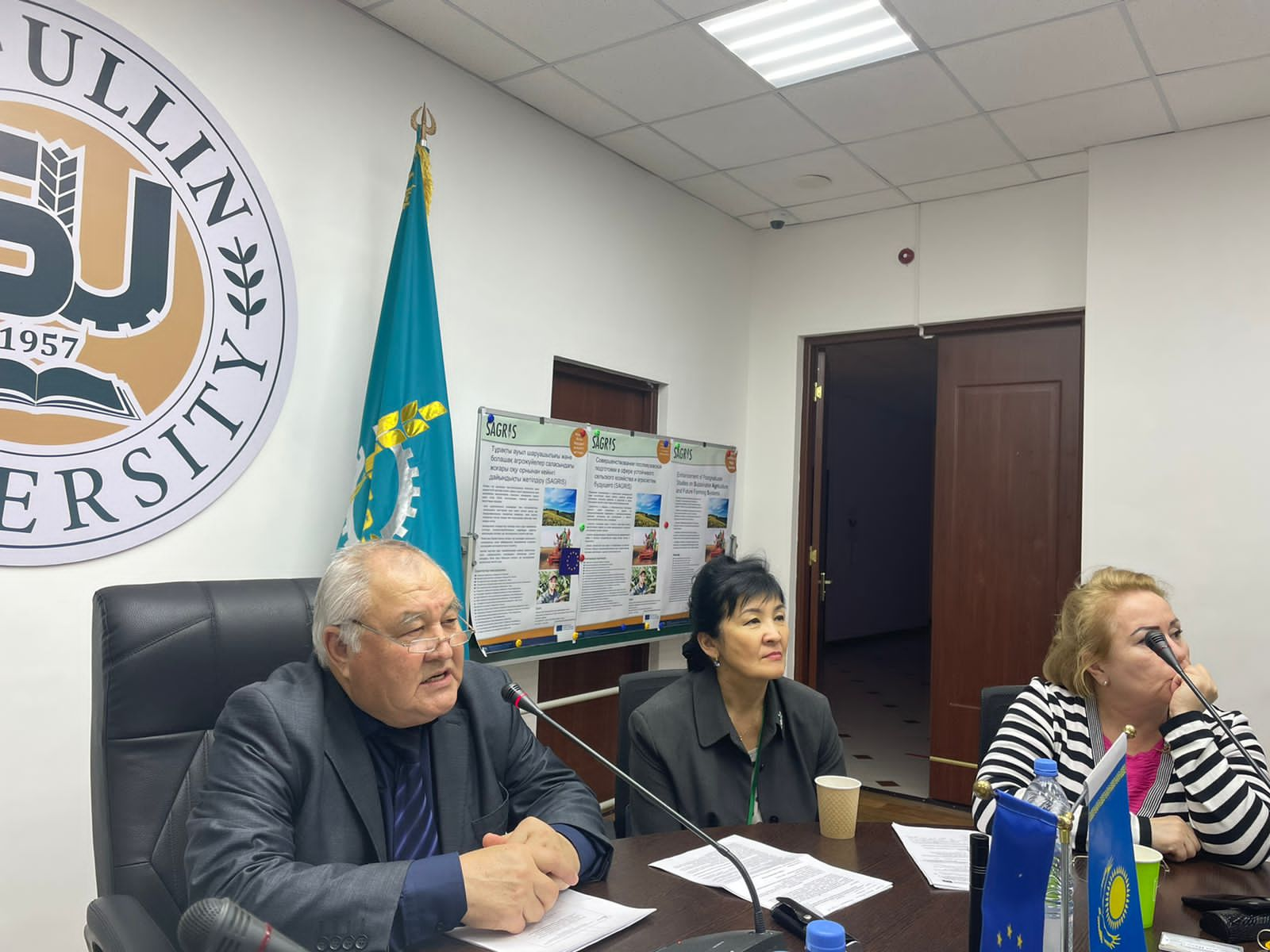
In the period from 20 to 24 September 2011 at the A. Baitursynov Kostanay Regional University held the first block-seminar on the module "Systems of crop production and animal husbandry in the context of climate change." On the part of the universities of Russia, the organizer was V.R. Filippov Buryat State Agricultural Academy. Feature of this block seminar was that it was held in a hybrid format. A joint program was prepared, which provided for online participation of all members of interuniversity working groups both from Kazakhstan and Russia and partner universities of Germany, the Czech Republic and Poland. The program of the block-seminar is attached. The program included a trip to the leading agricultural enterprises of Kazakhstan and Russia, where the participants of the seminar could see the positive practices of conducting production such as Zhemchug LLC in the Russian Federation and the Bek + dairy farm in the Republic of Kazakhstan. Buryatia and PF "Terra" and LLP "Troyan" in the Kostanay region.Module developers and doctoral students took part in an open discussion “Problems of climate change” and, in continuation of the discussion, interesting and useful lectures were given by Professor of the Warsaw University of Life Sciences A. Schwerk on the topic “Assessment of natural resources in the context of climate change”, P. Tlustoshe and M. Sedmikova from the Czech University of Life Sciences, as well as lectures by O. Altaeva, I. Ryumkina, D. Aitmukhanbetova and others.There was great interest in the presentations of doctoral students from Kazakhstan and Russia, who displayed the results of their research. Our university was represented by A. Baitelenova, the developer of the module, and doctoral students I. Zhirnova, Sharapatov T., Zhakenova A. and Ismailova A., who worked on cases together with doctoral students and graduate students from other universities. В заключение блок-семинара был проведен круглый стол «Проблемы будущего сельского хозяйства в условиях изменения климата» с участием заинтересованных сторон, а именно At the end of the block seminar, a round table "Problems of the future of agriculture in the face of climate change" was held with the participation of interested parties
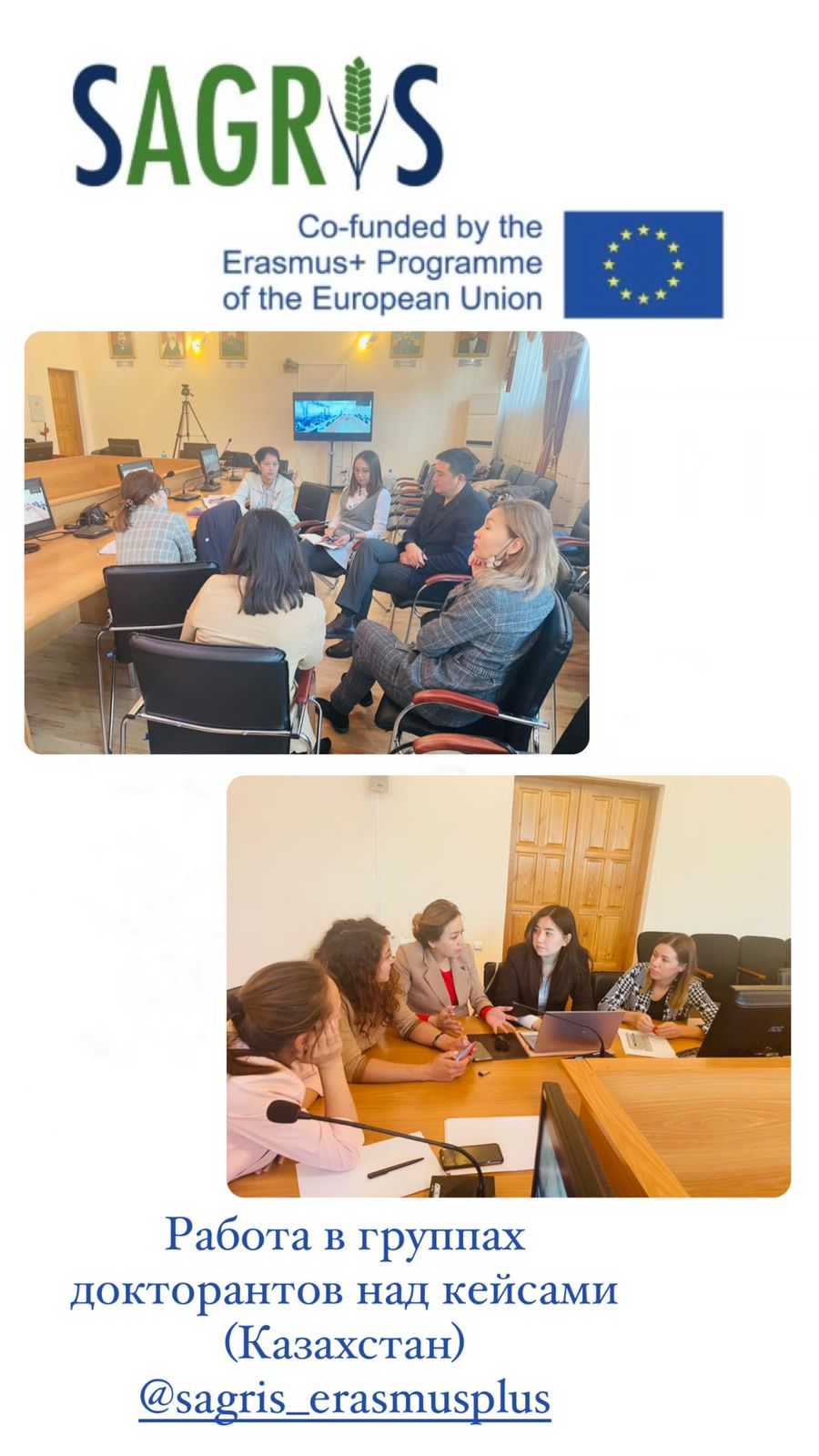
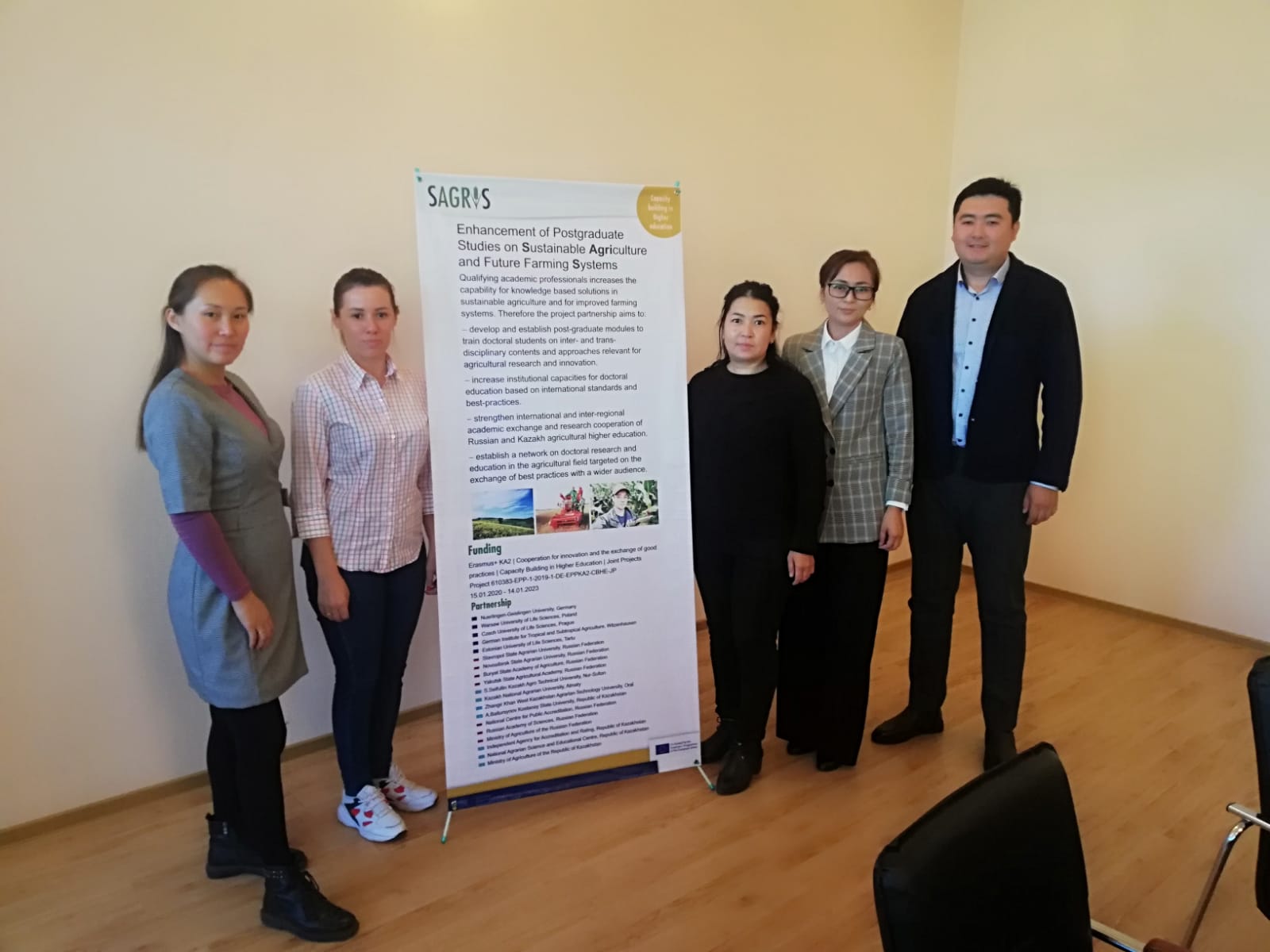
On the 11th of September 2019 Coordination meeting within EU Erasmus+ project SAGRIS was held by Shaizada Tasbulatova, the Director of the National Office Erasmus + in Kazakhstan. Project SAGRIS was included in the List of selected Erasmus+ CBHE projects, Competition V (2019) with the participation of Kazakhstan partners (https://eacea.ec.europa.eu/erasmus-plus/selection-results/capacity-building-in-field-higher-education-2019_en).
Shaizada Tasbulatova, Director of the National Office Erasmus + Program in Kazakhstan, Aitzhan Abdyrov, the First Deputy Chairman of the Board of JSC S. Seifullin Kazakh Agrotechnical University and Dr. Heinrich Schuele, Dean of Agriculture Faculty of University of Nürtingen-Geislingen (Germany) and potential members of the SAGRIS project team were met at the Coordination meeting. Implementation of the project will start on the 15th of January, 2020.
|
|
|
The purpose of this meeting is to familiarize the project team with some recommendations for the implementation of the “Capacity Building in Higher Education” (CBHE) projects of the Erasmus + program”.
Tasbulatova Shaizada is the Director of the National Office Erasmus + in Kazakhstan acquainted with the rules for implementing projects of the Erasmus + program. It was recommended to familiarize with the full version of the project application in detail, to clarify the role of the university in the project (work package). Attention was also paid to the mechanism of interaction with the university’s top management, the formation of the project team, the dissemination of project results at the national level and the sustainability of the project. Dr. Heinrich Schuele, project manager, Dean of Agriculture Faculty of University of Nürtingen-Geislingen (Germany) briefly introduced the contents of the project application.
He outlined the work packages of our university. At the end of the meeting, practical work was carried out with the team on the content of project applications.
|
|
|
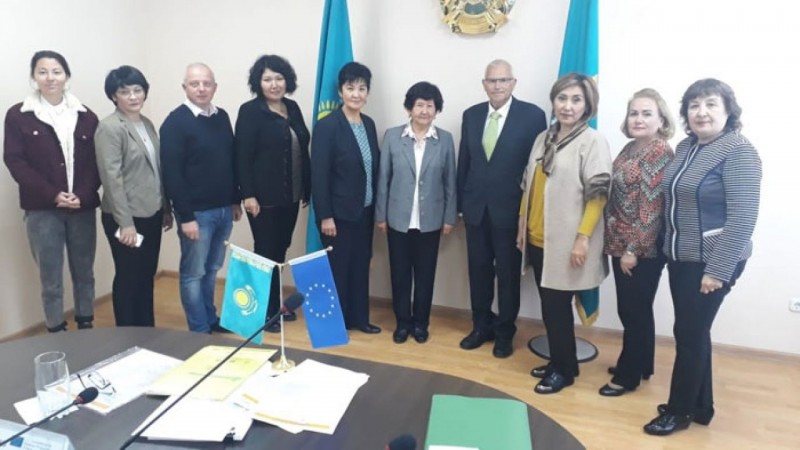
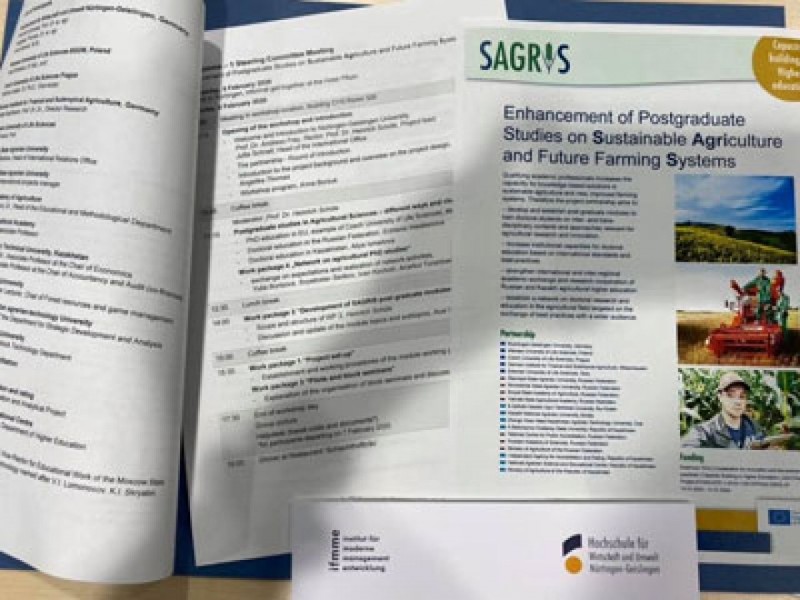 |
S.Seifullin Kazakh Agrotechnical University (further KATU) is a member of the consortium of the international project «Improving postgraduate training in sustainable agriculture and agricultural systems of the future» – SAGRIS. The project is designed for three years and funded under the Erasmus + program of the European Union. |
In general, the SAGRIS Project will contribute to the solution of the following tasks:
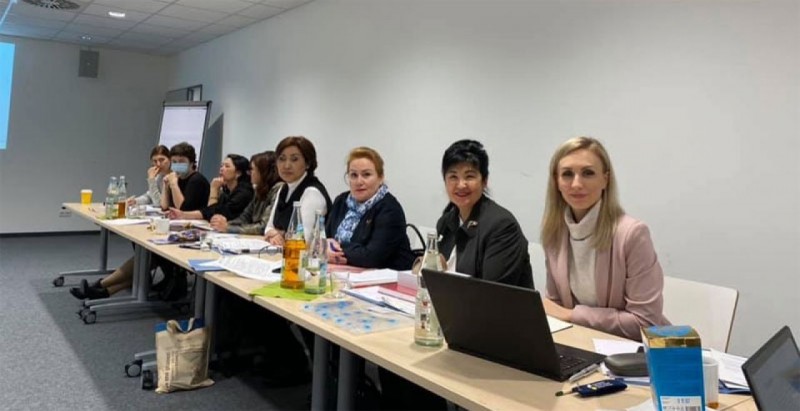
During two days, February 6 and 7, 2020, a meeting of the Steering Committee was held at the University of Nürtingen-Geislingen (Germany), which is a grant holder of the SAGRIS project. The first meeting became a platform for acquaintance of all members of the consortium and a detailed development of the main stages of the project. Therefore, each participant in the Steering Committee meeting, first of all, presented their educational institutions and organizations in the presentations.
The program of the meeting included the main issues:
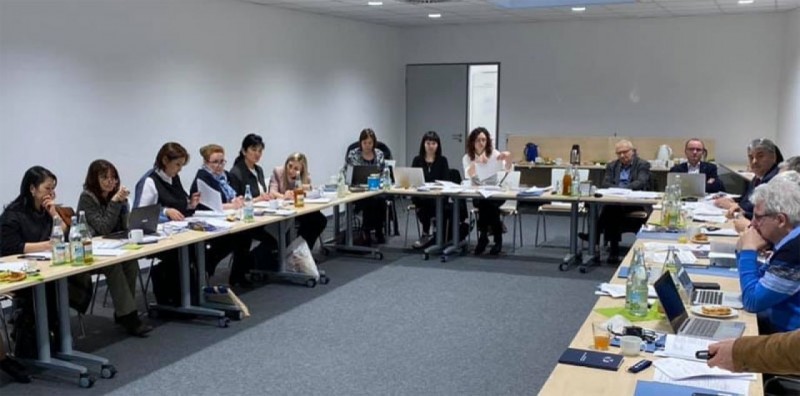
During the meeting of the Steering Committee, Aliya Ismailova, project coordinator of S. Seifullin KATU presented a report "Postgraduate education in the field of agricultural sciences - various approaches and challenges of our time." The presentation aroused increased interest and became the basis of productive discussion of all participants in the meeting.
On May 12, 2020 a Steering Committee meeting of Erasmus + SAGRIS project “Improving postgraduate education in the field of sustainable agriculture and agricultural systems of the future” was held online on the Zoom platform.
The meeting was attended by representatives of the Higher School of Economics and Environment Nürtingen-Geislingen, German Institute of Agriculture in the Tropics and Subtropics (Germany), Warsaw University of Life Sciences (Poland), Czech University of Life Sciences in Prague (Czech Republic), Estonian University of Life Sciences (Estonia), HEIs of Kazakhstan and Russia aswellas the National Center for Professional and Public Accreditation of the Russian Federation, the Independent Agency for Accreditation and Rating of the Republic of Kazakhstan, the National Agrarian Scientific-Educational Center and the Russian Academy of Sciences. Our university at the online meeting of the Steering Committee was represented by: Ismailova A.S., Meleshenko N.N. and Kitaibekova S.O.
The meeting of the Steering Committee was preceded by an online seminar of the project coordinator on 5 May 2020 from the University of Nürtingen-Geislingen Borsuk Anna and Kazakhstan’s partners of SAGRIS project.
|
|
|
Due to the fact that the coronovirus pandemic violated the project implementation plan (SAGRIS Workplan) and all project activities were transferred to the remote format, and the Project Kick-Off Meeeting did not take place in Ulan-Ude (Russia), all the workers had to be discussed in detail project packages and assess the irreadiness.
The following questions were submitted to the committee meeting by SAGRIS project: a review of the activities carried out from February to May, project management (in particular, the study and sign in gof a partnership agreement), a situational analysis of doctoral education in European universities, Russia and Kazakhstan, a strategy for disseminating project results, a Plan of Quality Control and the involvement of external experts, planning activities, coordination of methodological approaches in the development of modules in accordance with European and national qualifications frame work, discussion of the results of project monitoring by the National Office of Erasmus + in Russia and others.
At the beginning of the meeting, Professor. Dr. Heinrich Schüle, Project Manager, delivered a welcoming speech. He noted that in the current situation it was necessary to work mainly remotely and apply new means of communication, which had an impact on all project participants. At the same time, he noted that the Working Projects are being implemented on time and he hopes that Steering Committee Meeting with a detailed study of the issues of the meeting program will contribute to the implementation of the next planned stages of the project.
|
|
|
May 22, 2020 within the framework of the project funded by European Union «SAGRIS – Improving postgraduate education in the field of sustainable agriculture and agricultural systems of the future», a webinar was held on the theme «Principles and practice of developing educational programs and measurable learning outcomes based on foreign experience». Galina Nikolayevna Motova, Doctor of Pedagogical Sciences, Deputy Director of the National Center for Professional and Public Accreditation, editor-in-chief of the journal «Accreditation in Education», Vice-President of the APQN Asia-Pacific Quality Assurance Network, acted as an expert. The webinar was held on the webinar.ru platform.
Anna Borsuk, project manager of Higher School of Economics and Environment Nürtingen-Geislingen (Germany), the project team of S.Seifullin Kazakh Agrotechnical University, Kazakh and Russian partner universities, employees of non-academic project partners as NASEC, faculty member who are not involved in the implementation of the project but interested in the subject of the webinar were participants of the seminar.
|
|
|
The following questions were discussed concerning the topic of the webinar: principles and conditions for the formation of a single educational space, a paradigm shift in education, competencies and learning outcomes, Bloom's taxonomy as the basis for the formulation of learning outcomes, principles and practice of assessing learning outcomes. Moderator G. Motova emphasized the principles of the formation of the European educational process, the features and objectives of the Bologna process, the nuances of the translation of documents, the priority direction for the development of higher education.
This seminar was very useful to all of us, especially the developers of the modules of the project «SAGRIS – Improving Postgraduate Education in the Field of Sustainable Agriculture and Agricultural Systems of the Future».
|
|
|
On the 29th of May, 2020 it was held monitoring of EU Erasmus + 610383-EPP-1-2019-1-DE-EPPKA2-CBHE-JP project “Enhancement of Postgraduate Studies on Sustainable Agriculture and Future Farming Systems” (SAGRIS) at S. Seifullin Kazakh Agro Technical University. The project is aimed at solving problems in the field of training scientific and pedagogical personnel in accordance with international quality standards and aims to increase the level of knowledge in the field of sustainable agriculture and agricultural systems of the future, a topic of national, interregional and international significance. The project involves 4 universities from Kazakhstan, 4 from Russia, Germany, the Czech Republic and Poland. The project is coordinated by Nuertingen-Geislingen University ( HfWU), Germany, one of the leading agricultural research universities in Europe.
The project was monitored by Sh.U. Tasbulatova, Director of the National Office of the Erasmus + Program in Kazakhstan. This event is carried out in accordance with the project monitoring plan for 2020. Four universities from Kazakhstan took part in the monitoring: S. Seifullin Kazakh Agro Technical University, Nur-Sultan (KATU), Kazakh National Agrarian University, Almaty (KazNAU), Zhangir Khan West – Kazakhstan Agrotechnical University, Oral (ZKATU), A. Baitursynov Kostanay State University (KSU) as well as non-academic partners: National Agrarian Scientific and Educational Center (NASEC), Independent Agency for Accreditation and Rating (IAAR). The partner universities have connected to the webex platform.
|
|
|
The purpose of monitoring Erasmus+ SAGRIS project is to evaluate the project implementation process at the moment, as well as to obtain information on the results and achievement of the goals set, to get acquainted with the real situation in which the project is being implemented, as well as understanding the wider context. During the meeting with project participants, Shaizada Umurzakovna dwelt in detail on the following issues: the course of the project, measures to ensure quality, dissemination and use of results, the impact and sustainability of the project, its relevance.
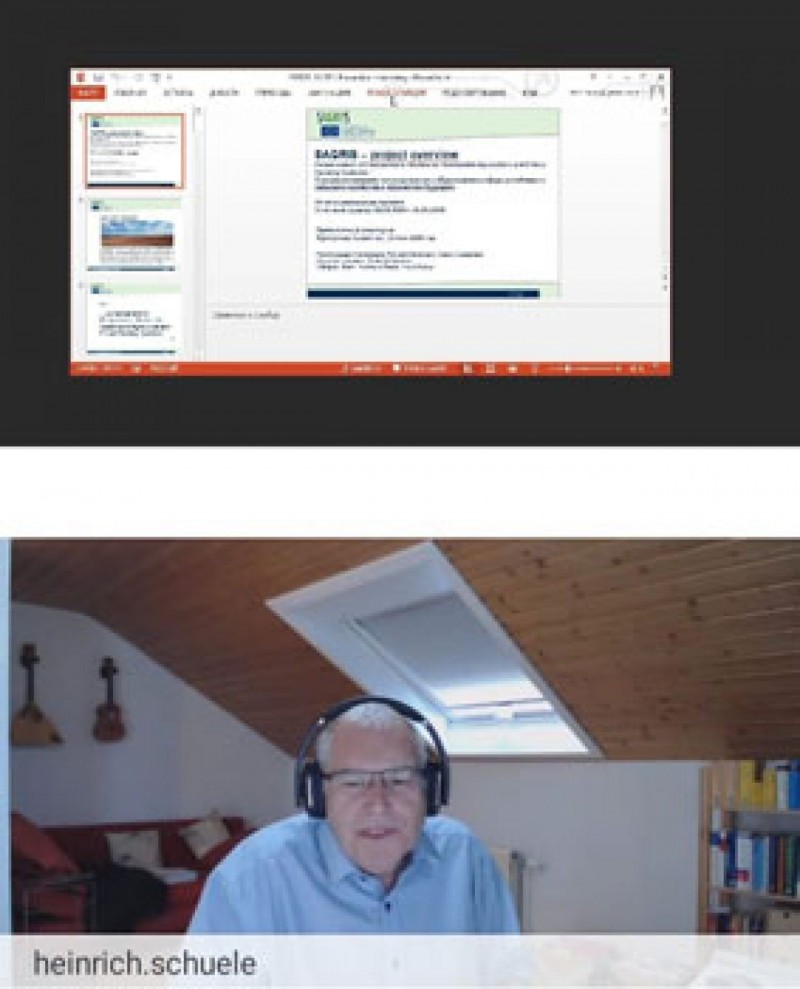 |
The project coordinators Heinrich Schüle, Anna Borsuk (University of Nürtingen-Geislingen), reported on the status and results of the project, the background of the project and the main objectives. S. Seifullina KATU was presented by Aliya Sabirzhanovna Ismailova, local coordinator with a report “Consortium, organizational structure and project management system, daily and financial management, decision-making procedure and quality control”, on behalf of A. Baitursynov Kostanay State University it was made a presentation by Shaikamal Gulshat Imanzhankyzy with presentation of SAGRIS modules and inter-university working groups, Bogdashkina Irina Vyacheslavovna (Zhangir Khan ZKATU) announced the plan for the implementation of pilot block seminars on SAGRIS modules as well as Borisova Yulia Sergeevna (KazNAU) presented network cooperation and promotion of the third cycle education, situational analysis as the first stage of development of a doctoral program development strategy, as well as a strategy for communication, dissemination and use of project results. |
Monitoring of the Erasmus + project “Improving Postgraduate Education in Sustainable Agriculture and Agricultural Systems of the Future” (SAGRIS) is essential for the successful implementation of the project. This is a management tool that allows you to assess the extent to which the project is aimed at achieving the goals and objectives for which it was conceived.
|
|
|
A videoconference of the working group on the development of the educational module "Crop and livestock systems under Climatic change" for doctoral students took place on May 29, 2020. This module is one of four that are planned to be developed in the SAGRIS project of the EU Erasmus + program.
Team members of Module Working Group, plant growing and livestock specialists from universities and partner organizations participated in the discussion of the development strategy and the core competencies of the module. The moderator of the meeting was Professor Michal Lostak, First Vice-Rector of the Czech University of Life Sciences, Czech Republic. Representatives from the Warsaw University of Life Sciences, Poland, also actively participated in the discussion from the European partner countries.
|
|
|
Of great interest and active participation in the work were specialists in the field of crop production and animal husbandry from the following Russian universities and organizations: Stavropol State Agrarian University, Novosibirsk State Agrarian University, Buryat State Academy of Agriculture, Yakut State Agricultural Academy, National Centre for Public Accreditation, Russian Academy of Sciences.
In turn, Kazakhstan was represented by four universities - S.Seifullin Kazakh Agro Technical University, Kazakh National Agrarian University, Zhangir Khan West Kazakhstan Agrarian-Technical University, A.Baitursynov Kostanay State University; and two organizations - Independent Agency for accreditation and rating, LLP "Kazakh Scientific Research Institute of Animal Husbandry and Forage Production".
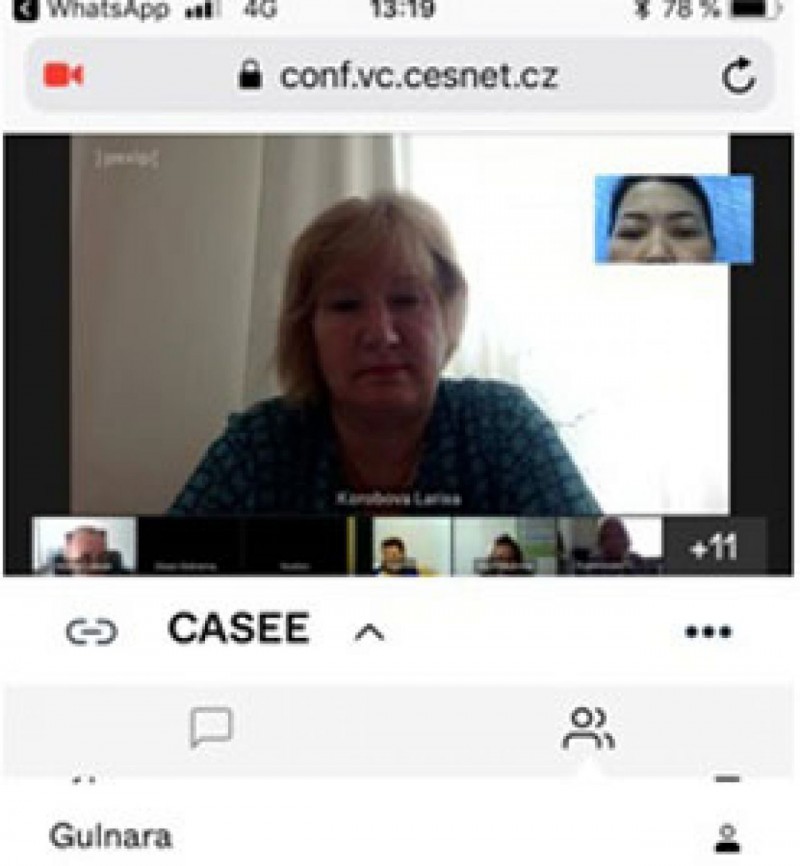
Partner countries have determined the module description form, discussed the main competencies that the student will have to master.
This meeting to discuss the development of the module is the first in the framework of the project. Based on the results of a fruitful meeting, the tasks were identified, the dates of the next meeting were set, for further discussion on how correctly the module “Crop and livestock systems under Climatic change” is being developed by the participants of the educational project
On June 4, 2020, a video conference of the working group on the development of the educational module "Research Methods" for doctoral students took place. This module is one of four that are planned to be developed within EU Erasmus + SAGRIS project.
Teams of universities and partner organizations took part in the discussion of the strategy and core competencies of the module. Partner countries have determined the module description form, discussed the main competencies that the student will have to master. The objectives of the meeting of the developers of the “Methods of Scientific Research” Module online were as follows: to determine in the future short-term and long-term goals for the development of the module, template, working groups within the subtopics. At the first meeting in video conferencing mode, the module subtopics were approved: data management, preparation of scientific publications, including research methods of literature, modern statistical methods, preparation of presentations oriented to target groups, preparation of grant applications, project management and time -management. Groups on subtopics were formed and a coordinator was determined in each such group. This work is carried out on the Ilias Platform.
|
|
|
A brief review of the events already held took place. Among the contributing modules were the following: seminar Motova Galina Nikolaevna, Ph.D., Deputy Director of the National Center for Professional and Public Accreditation, Editor-in-Chief of the journal "Accreditation in Education", Vice President of the Asia-Pacific Network of Quality Assurance APQN "Principles and Practice of Developing Educational Programs and Measurable learning outcomes based on foreign experience ”; quality assessment - questionnaire - of the event held in order to identify further topics for such events according to the module development methodology; excellent feedback was received from all participants.
Based on the results of the meeting, tasks were identified; the dates of the next meeting were set for further discussion: how correctly the participants in the educational project are developing the module “Methods of scientific research”.
On June 16, 2020, a video conference of the working group on the development of the educational module “Transdisciplinary research methods for sustainable agriculture”, planned within SAGRIS project of the EU Erasmus + program, took place. The team of partner universities together with the university coordinator of the University of Nürtingen-Geislingen HfWU took part in the discussion of the strategy and core competencies of module 4. The moderator of the meeting was Brigitte Kaufmann, German Institute for Agriculture in the Tropics and Subtropics (Witzenhausen DITSL). The leading university in Kazakhstan in the development of this module is Zhangir Khan ZKATU them, Oral; Russia - Yakutsk State Agricultural Academy. S.Seifullin KATU was represented by Asel Imasheva (coordinator of the module working group), Sara Kitaibekova and Yevgeniya Zadvorneva.
The purpose of this module is to develop methods for sustainable solutions to complex problems in the field of doctoral studies, develop innovations that are appropriate for the conditions and capabilities of farmers and other participants in the food system to promote sustainable development, change and transformation of agricultural and food systems. Transdisciplinary research is based on the principles of a multilateral approach, practical orientation, integration of knowledge, innovative systems and platforms, strengthening social capital and the importance of rural areas for society.
|
|
|
At the first meeting in the videoconferencing mode, the module subtopics were approved: introduction to sustainability in agriculture and food systems; systemic approaches in agriculture; methods of transdisciplinary research, in particular, subjective approaches, stakeholder analysis, gender analysis, participative methods, activity and knowledge analysis, co-education, integration and co-creation of knowledge.
Based on the results of the meeting, the dates of the next meeting were set for further discussion: how correctly the participants in the educational project are developing the module “Transdisciplinary research methods for sustainable agriculture”.
|
|
|
Dear colleagues,
We are glad to inform you that a set of applications for participation in training internships of the SAGRIS project is open.
Please see the attachment about information on internship and conditions of participation and application as well as the application form.
We are waiting for your applications and wish you good luck!